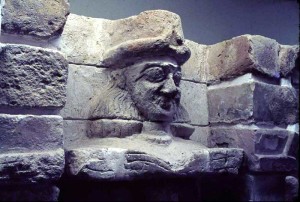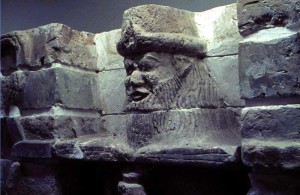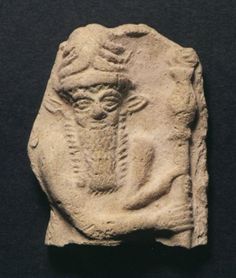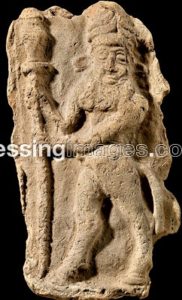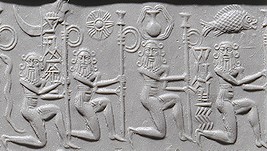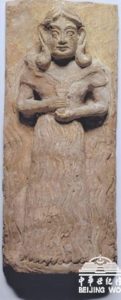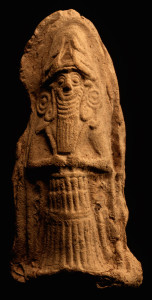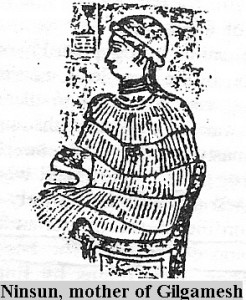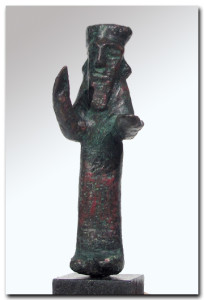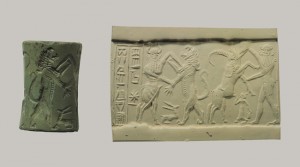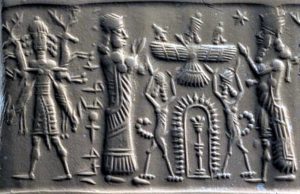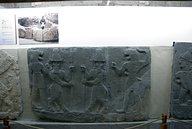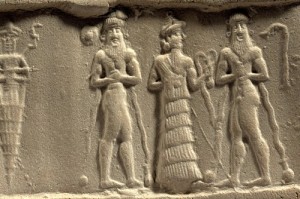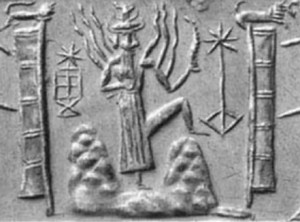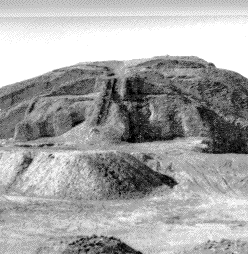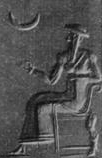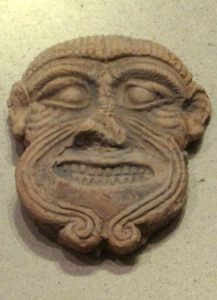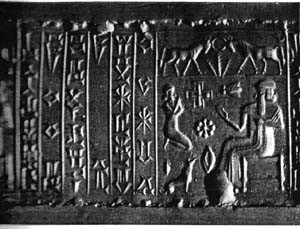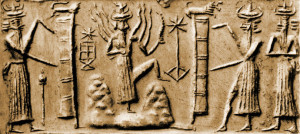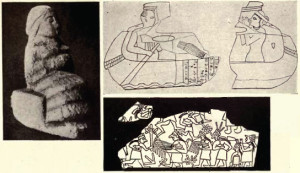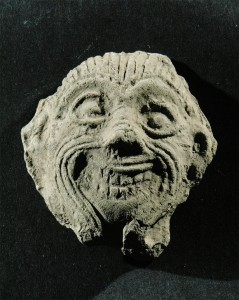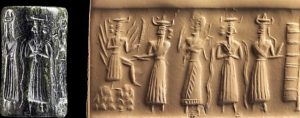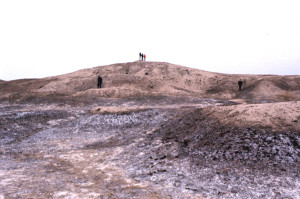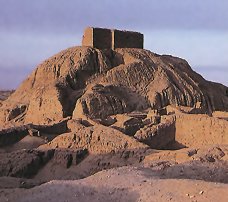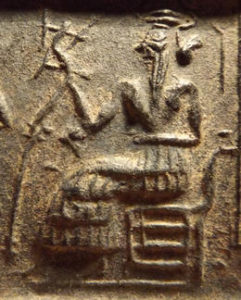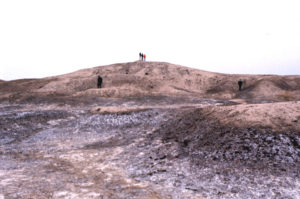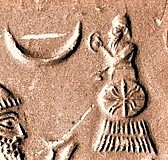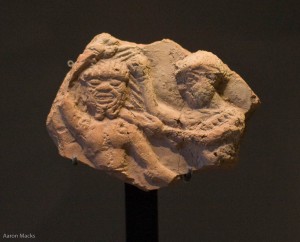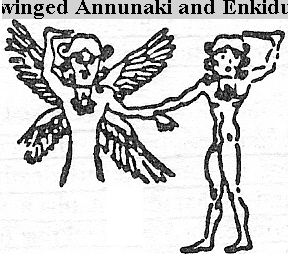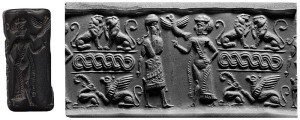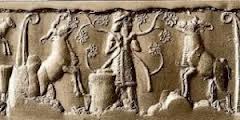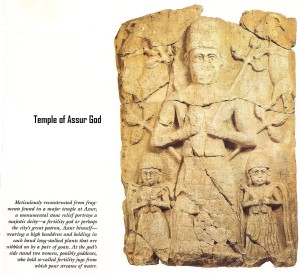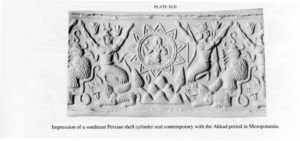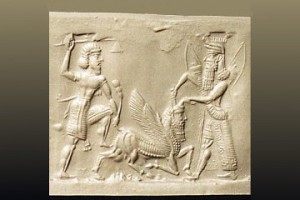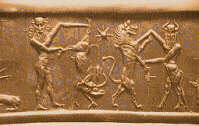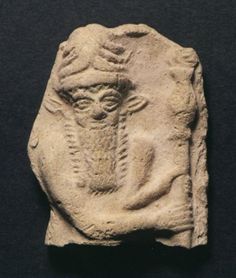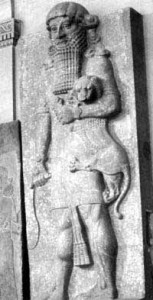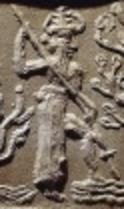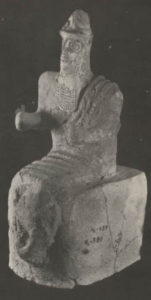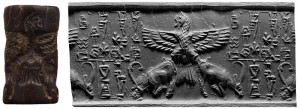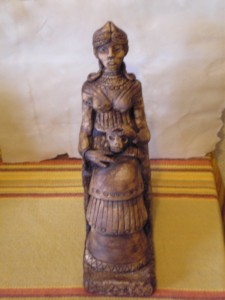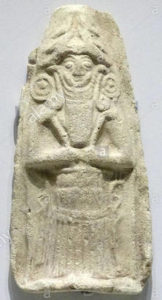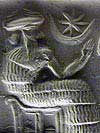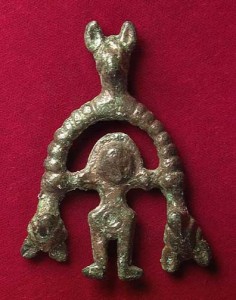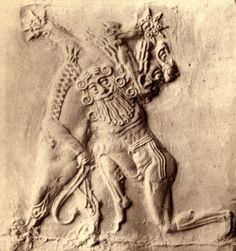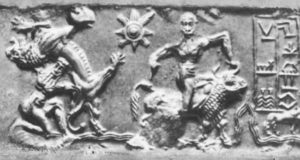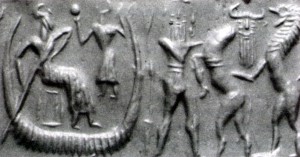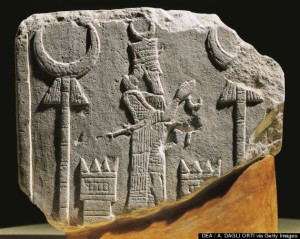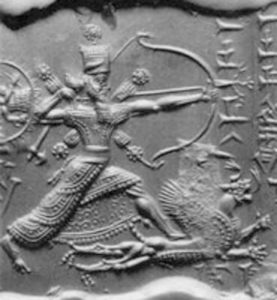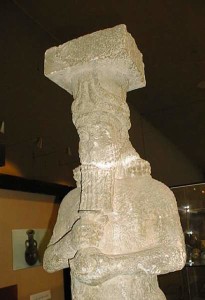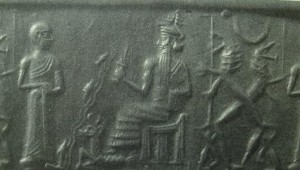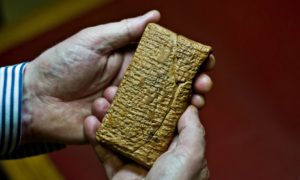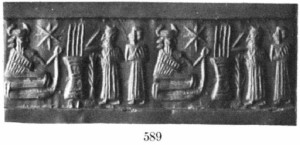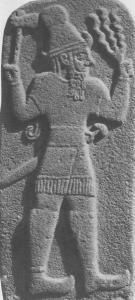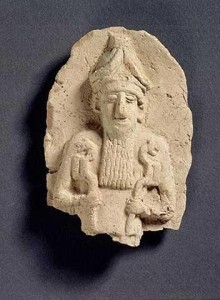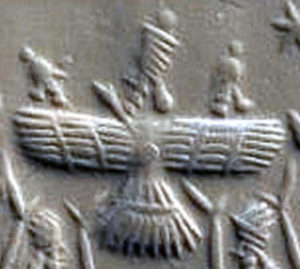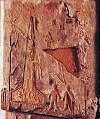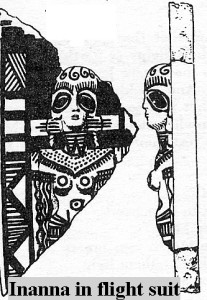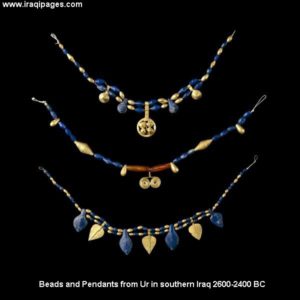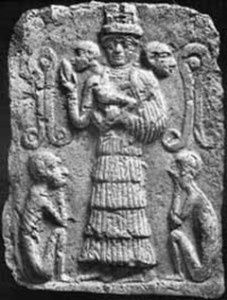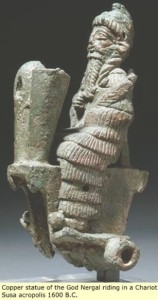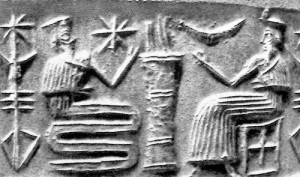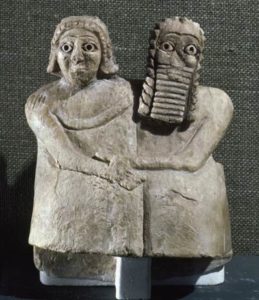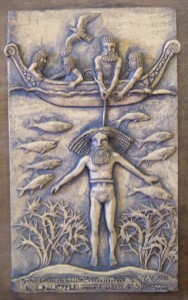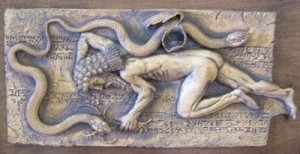A verse version of the Epic of Gilgamesh by Robert Temple, Rider, an imprint of Random Century Group Ltda, 1991, London, Sydney, Auckland, Johannerburg. All rights reserved.
(Texts: All Artifacts, Color Coding, & Writings in Bold Type With Italics Inside Parenthesis, are Added by Editor R. Brown, not the Authors, Translators, or Publishers!)
(gods in blue …mixed-breed demigods in teal...)
(Ninhursag‘s creature creation = Enkidu, Enlil‘s creature creation = Hawawa)
PROLOGUE
He who saw everything in the broad-boned earth, and knew what was to be known
Who had experienced what there was, and had become familiar with all things
He, to whom wisdom clung like cloak, and who dwelt together with Existence in Harmony
He knew the secret of things and laid them bare.
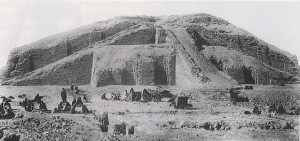 (E-ana, ziggurat / house of Sky God Anu, Uruk city way below)
(E-ana, ziggurat / house of Sky God Anu, Uruk city way below)
And told of those times before the Flood
In his city, Uruk, he made the walls, which formed a rampart stretching on
And the temple called Eanna, which was the house of An, the Sky God
And also of Inanna, Goddess of Love and Battle
Look at it even now: where cornice runs on outer wall shining brilliant copper -see,
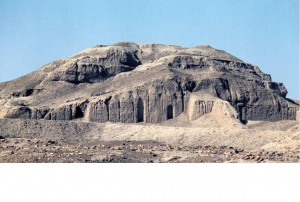 (E-ana residence of alien gods Anu, Inanna, etc.)
(E-ana residence of alien gods Anu, Inanna, etc.)
There is no inner wall; it has no equal.
Touch the threshold – ancient.
Approach the palace called Eanna (Anu & Inanna‘s temple residence in Uruk).
There lives Inanna, Goddess of Love and Battle (Love & War).
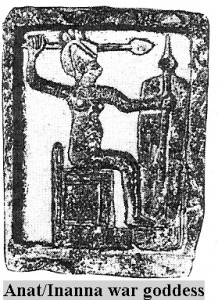 (Inanna, daughter to Nannar & Ningal, & Goddess of War)
(Inanna, daughter to Nannar & Ningal, & Goddess of War)
No king since has accomplished such deeds.
Climb that wall, go in Uruk, walk there, I say, walk there.
See the foundation terrace, touch then the masonry –
Is not this of burnt brick (Intensely fired mud-brick built), And good? I say;
The seven sages laid its foundation. One third is city;
One third is orchards; One third is clay pits-
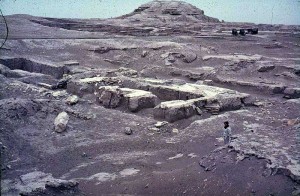 (Uruk city ruins, & residence / temple of alien gods)
(Uruk city ruins, & residence / temple of alien gods)
Unbuilt-on land of the Inanna Temple search these three parts, find the copper table-box
Open it. Open its secret fastening.
Take out the lapis-lazuli tablet. Read aloud from it.
Read how Gilgamesh fared many hardships
Surpassing all kings, great in respect, a lord in his form
He is the hero, He is of Uruk, He, the butting bull
He leads the Way, He, the Foremost,
He also marches at the rear, a helper to his brothers
He is the Great Net, protector of his men.
He is the furious flood-wave,
Who destroys even stone walls.
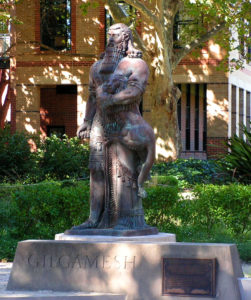 (life-sized statue of Gilgamesh, giant semi-divine king of Uruk 5-6,000 years ago, bigger, stronger, faster, smarter, & longer lived, wishing to be fully immortal like his mother, his quest for immortality begins)
(life-sized statue of Gilgamesh, giant semi-divine king of Uruk 5-6,000 years ago, bigger, stronger, faster, smarter, & longer lived, wishing to be fully immortal like his mother, his quest for immortality begins)
The offspring of Lugulbanda (& goddess Ninsun), Gilgamesh is perfect in strength
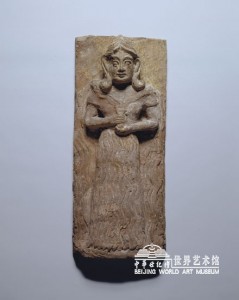 (alien goddess Ninsun, mother to Anunnaki gods & many mixed-breeds made kings)
(alien goddess Ninsun, mother to Anunnaki gods & many mixed-breeds made kings)
The son of the revered Cow, of the woman Rimat–Ninsun.
Gilgamesh inspires perfect awe.
He opened the mountain passes, he dug the well on the mountain’s flank.
He crossed to the far shore, traversed the vast sea to the rising Sun.
He explored the rim, sought life without death.
By his strength he reached Ziusudra (Noah) the Faraway (secluded home given by Enlil)
He who restored living things to their places
Those which the Flood had destroyed
Amidst the teeming peoples,
Who is there to compare with him in kingship?
Who like Gilgamesh can say: ‘I am king indeed?’
His name was called Gilgamesh
From the very day of his birth,
He was two-thirds god (alien bloodline), one third man (earthling bloodline),
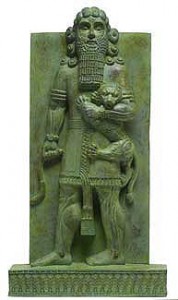
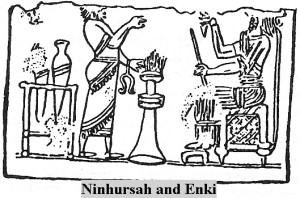 (Gilgamesh; DNA Lab of alien gods)
(Gilgamesh; DNA Lab of alien gods)
The Great Goddess Aruru (Ninhursag) designed him, planned his body, prepared his form
A perfect body the gods gave
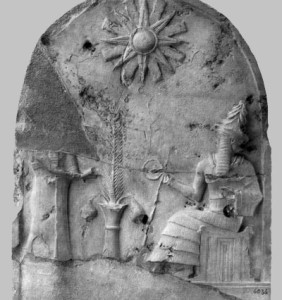 (giant mixed-breed king stands before Utu the Sun God)
(giant mixed-breed king stands before Utu the Sun God)
For the creation of Gilgamesh Shamash (Utu) the Sun (God) gave beauty
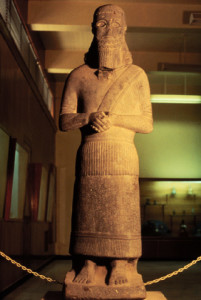 (Adad / Ishkur, son to Enlil, & Thunder God by way of high-tech weaponry)
(Adad / Ishkur, son to Enlil, & Thunder God by way of high-tech weaponry)
Adad (Ishkur) the Storm gave courage
And so he surpassed all others.
He (Gilgamesh) was two-thirds god, one third man,
The form of his body no one can match
Eleven cubits high he is, nine spans his chest
(1 cubit is length of elbow to middle finger tip, = 17-21″):
. (17″ X 11 cubits = 187″ / 12 = 15 1/2 feet tall); (21″ X 11 cubits = 231″ / 12 = 19 1/4 feet tall)
(1 span is length of thumb-tip to little finger-tip when fully expanded, = 9″); (9″ X 9 spans = 81″ / 12 = 6 3/4 feet chest wide)
(15 1/2 feet to 19 1/4 feet tall); (6 3/4 feet wide his chest)
(a giant semi-divine mixed-breed, taller, stronger, faster, smarter, & lived much longer)
As he turns to see the lands all around him.
But he comes to the city of Uruk.
Long was his journey, weary, worn down by his labours
He inscribed upon a stone when he returned
This story.
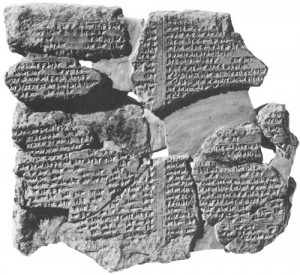 (ancient tablet artifact of Gilgamesh’s story)
(ancient tablet artifact of Gilgamesh’s story)
TABLET I
Out I went, into the world, but there was none better, none whom he, Gilgamesh, could not best.
And so, with his arms, he returned to Uruk.
But in their houses, the men of Uruk muttered: ‘Gilgamesh, noisy Gilgamesh! Arrogant Gilgamesh!’
All young men gone – Defeated by Gilgamesh, and no son was left to his father.
All young girls made women by Gilgamesh
His lusts are such, and no virgin left to her lover!
Not the daughter of a warrior,
Nor the wife of a nobleman!
Yet he is king and should be
The people’s careful shepherd.
He is king and should be
Shepherd of the city.
He is wise, he is handsome, he is firm as a rock.
In heaven the gods heard
Heard the lament of the people,
And the gods cried out to the Great God, higher king of Uruk:
‘Strong as a wild bull is this Gilgamesh
So he was made by Aruru (Ninhursag), the goddess
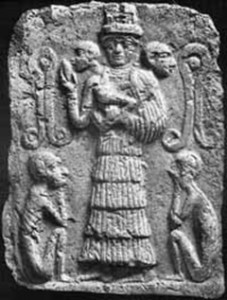 (“creator goddess” Ninhursag with her early failed attempts fashioning “modern man”)
(“creator goddess” Ninhursag with her early failed attempts fashioning “modern man”)
None there is who can – not one
None who can survive him in fighting.
No son left to his father.
Gilgamesh, he takes them all, and is he
He the king? Shepherd of the people?
No virgin left to her lover, For he lusts strongly!
No, nor the wife of the nobleman!
The Great God heard this, then
To the Goddess of Creation, Aruru (Ninhursag, Chief Medical Scientist – DNA Specialist) –
Cried all the gods: ‘You created this Gilgamesh! Well, create him his equal!
Let him look as into mirrors –
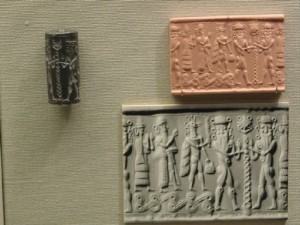 (hundreds of Gilgamesh artifacts depicting scenes from this story)
(hundreds of Gilgamesh artifacts depicting scenes from this story)
Give a second self to him, yes;
Rushing winds meet rushing winds!
Let them flow heart to heart against –
Give them each other to fight,
Leaving Uruk in peace!’
So the Goddess of Creation (Ninhursag) took and formed in her mind
This image, and there it was conceived – in her mind, and it was made of material
That composes the Great God,
He of the Firmament.
She then plunged her hands down into water and pinched off a little clay.
She let it drop in the wilderness
Thus the noble Enkidu was made.
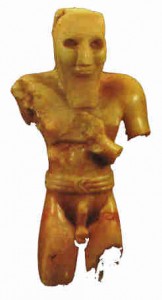
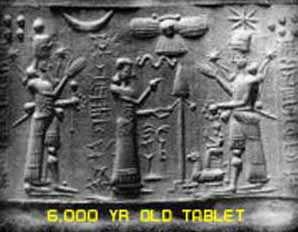
(Enkidu Ninurta Ninhursag Bau Inanna)
For this was he the very strength of Ninurta, the God of War, was his form, rough bodied, long hair,
His hair waved like corn filaments –
Yes, like the hair of that goddess
Who is the corn, she , Nisaba (Enlil‘s mother-in-law, the Goddess of Grains).
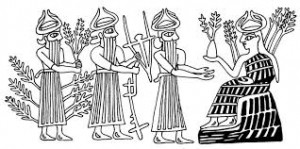
(Haia Ninurts Enlil Nisaba, Goddess of Grains)
Matted hair was all over his body, like the skins of the cattle.
Yes, like the body of that god.
Who is the cattle, he, Samugan (unidentified cattle god).
This Enkidu was innocent of mankind.
He knew not the cultivated land.
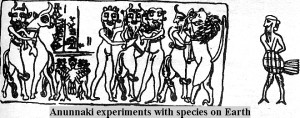
Enkidu was in the hills
With the gazelles –
They jostled each other
With all the herds
He too loved the water-hole.
But one day by a water hole
A trapper met him
Yes, face to face,
Because the herds of wild game
Had strayed into his territory.
On three days face to face –
Each day the trapper was terrified,
Frozen stiff with fear.
With his game he went home,
Unable to speak, numb with fright (as if he saw Bigfoot today).
The trapper’s face altered, new –
A long journey does that to one,
Gives a new visage upon returning –
The trapper, his heart all awe, told his father:
‘Father, what a man! No other like him!
He comes from the hills, strongest alive!
A star in heaven his strength,
Of the star essence of An, the Sky Father
Over the hills with the beasts
Eating grass
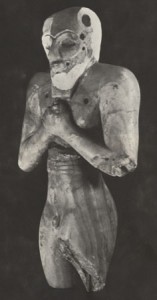 (Enkidu, companion & protector of Gilgamesh)
(Enkidu, companion & protector of Gilgamesh)
Ranges across all your land,
Goes to the wells.
I fear him, stay far away.
He fills in my pits
Tears up my game traps
Helps the beasts escape;
Now all the game slips away –
Through my fingers.’
His father opened his mouth,
Told the son, the trapper: ‘My son, in Uruk lives Gilgamesh.
None can withstand him,
None has surpassed him,
As a star in heaven his strength
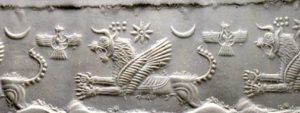
(Anunnaki King Anu in his sky-disc, ruler of their entire planet Nibiru, & Earth Colony)
Of the star-essence of An, the Sky Father.
Go to Uruk, find Gilgamesh
Praise the wild man’s strength ask for a temple hierodule from the Temple of Love,
Such a child of pleasure (a mixed-breed for mixed-breeds & gods only);
Bring her and let her power for woman
Subdue this wild man.
When he goes to the wells,
He will embrace the priestess
And the wild beasts will reject him.’
To Uruk the trapper went
And said to Gilgamesh: ‘Like no other, wild,
Roaming in the pastures,
A star in heaven his strength
Of the star-essence of An, the Sky Father.
I am afraid, stay far away; he helps the beasts escape
Fills in my pits
Tears up my game traps.’
Gilgamesh said: ‘Trapper, return,
Take a priestess, child of pleasure –
When he goes to the wells
He will embrace the priestess
And the wild beasts will reject him.’
Then returned with the hierodule
And three days to the drinking hole,
There sat down
Hierodule facing the trapper,
Waiting for the game.
First day, nothing.
Second day, nothing.
Third day, yes.
The herds came to drink, and Enkidu –
Glad for the water were the small wild beasts,
And Enkidu was glad for the water –
He of the gazelles and wild grass,
Born in the hills.
The priestess saw this man
Wild from the hills.
‘There, woman, ‘the trapper,
‘Bare your breasts now;
This is he,
Have no shame, delay not,
Welcome his love,
Let him see you naked,
Let him possess your body.
As he approaches, take off your clothes,
Lie with him, teach him,
The savage, your art of woman,
For as he loves you, then
The wild beasts, his companions,
They will reject him.’
She (temple priestess Shamhat) had no shame for this,
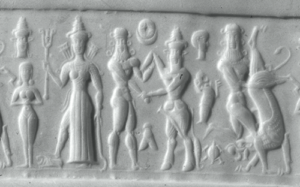 (Shamhat, Inanna, Gilgamesh, & Enkidu)
(Shamhat, Inanna, Gilgamesh, & Enkidu)
Made herself naked
Welcomed his eagerness
Incited him to love,
Taught the woman’s art.
Six days, seven nights,
That time lying together,
Enkidu had forgotten his home
Had forgotten the hills
After that time he was satisfied.
Then he went back to the wild beasts –
But the gazelles saw him and ran,
The wild beasts saw him and ran.
Enkidu would follow, but weak,
His strength gone through woman (boxing managers prohibit sex for their fighters prior their fight);
Wisdom was in him,
Thoughts in his hear – a man’s.
So he returned to the priestess.
At her feet he listened intently
‘You have wisdom, Enkidu.
Now you are as a god.
Why the beasts? Why the hills?
Come to Uruk of the strong walls
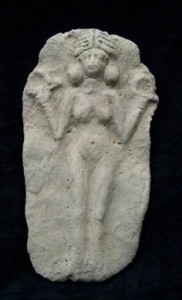 (Inanna, The Goddess of Love, named for her Anunnaki & many semi-divine spouse-kings)
(Inanna, The Goddess of Love, named for her Anunnaki & many semi-divine spouse-kings)
To Inanna’s Temple of Love,
And to the Eanna (her residence),
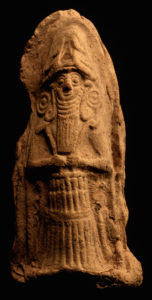 (Sky God An / Anu, father to those in charge of Earth, King of all gods)
(Sky God An / Anu, father to those in charge of Earth, King of all gods)
Where the Sky God An can be found.
Gilgamesh is there, strong,
Raging like a wild bull, over all
Is his strength.’
Favourably as he speaks, he hears her words.
He comes to know his own heart
And his desire to find a friend.
He tells her, the priestess:
‘Take me, girl, to the sacred pure
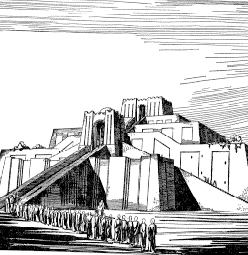 (modern drawing of Anu’s residence, used when he visited Earth Colony)
(modern drawing of Anu’s residence, used when he visited Earth Colony)
Dwelling of Love and Sky God’s house
Where lives Gilgamesh of perfect strength,
He who rages like a bull over all,
And I will summon him forth and challenge him
And I will shout in Uruk: “I am the mightiest!
Yes, I can change the order of what is!
Anyone born on the steppe is mighty and has strength”‘
‘Then let us go that he may see your face
And I will show you Gilgamesh, for I know well where he is.
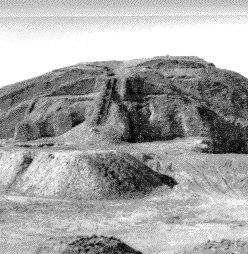 (ziggurat residence of gods in Uruk, ruins with its ramparts)
(ziggurat residence of gods in Uruk, ruins with its ramparts)
Come Enkidu, to Uruk of ramparts,
Where all are dressed for festival,
Where each day is a festival,
Where there are boys,
Where there are girls,
Deliciously ripe and perfumed,
Who drive the great ones from their fretted couches
To you, Enkidu, of joy in life
I will show Gilgamesh of joy in life
See him, see his face
Radiant is his manhood, of full-bodied vigor
His body ripe with beauty in every part.
So exceeding you in strength,
Needing no sleep by day or by night.
Restrain you folly, Enkidu.
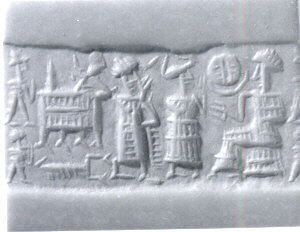 (artifact of the Sun God & Moon God, son & father, plus their symbols)
(artifact of the Sun God & Moon God, son & father, plus their symbols)
Gilgamesh – Shamash (Utu) the Sun is proud,
Also An, the God of Firmament,
Also valiant Enlil, his son,
And Enki, his son also –
All have given wisdom.
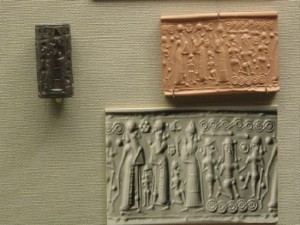 (many ancient artifacts of giant gods & mixed-breed kings have been destroyed)
(many ancient artifacts of giant gods & mixed-breed kings have been destroyed)
Before you come from the open plains
Gilgamesh will have dreamed of it.’
And so Gilgamesh rose from his bed
And to his mother, in revealing dreams, said:
‘Mother, I saw in a dream last night
That there were stars in heaven
And a star descended upon me like unto
The essence of An, the Sky God.
I tried to lift it up, but it was too heavy for me,
I tried to move it, but it would not be moved.
The land of Uruk was around it,
The land was placed round about it.
All the people were pressing towards it.
All the nobles also came round it,
And all my friends kissed its feet.
I was drawn towards it as to a woman
And I laid it at your feet
And you said it was my equal.’
She, the Wise, the Custodian of Knowledge,
Says to her lord –
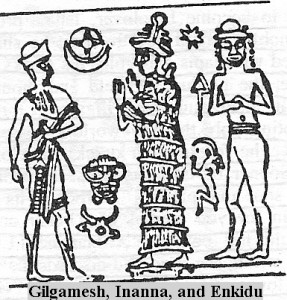 (Gilgamesh, his goddess mother Ninsun, & Enkidu)
(Gilgamesh, his goddess mother Ninsun, & Enkidu)
She, Ninsun (daughter to Ninurta & Bau), Custodian of Knowledge,
Says to Gilgamesh: ‘Your equal was a star of heaven
Which descended upon you like unto
The essence of An who his the God of the Firmament
You tried to lift it but it would not be moved
And I called it your equal, comparing it to you.
You were drawn to it as to a woman.
The meaning of this
Is of a strong friend who saves his companion
He is the strongest of the land; he has strength.
As a star in heaven his strength,
The strength of An of the Firmament and his host.
So that you are drawn to him overwhelmingly.
And this means he will never forsake you.
Such is your dream.’
Gilgamesh says again to his mother: ‘Mother, another dream
In Uruk of the ramparts lay an axe –
All were gathered around it,
Uruk-land was standing round about it.
The people pressed towards it; I laid it at your feet.
I was drawn to it as to a woman.
For you called it my equal.’
She, the Wise Custodian of Knowledge, says to her son – ‘The axe is a man
You were drawn to it as to a woman
For I called it your equal
And it was to rival you.
This means a strong friend standing by his friend
He is the strongest of the land; he has strength.
The essence of An of the Firmament, is his,
So strong is he.’
Gilgamesh then spoke to his mother (goddess Ninsun)
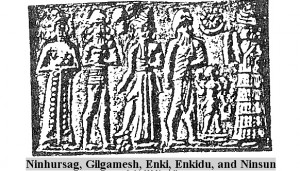
‘Now according to the word of God Enlil
Let a counselor and friend come to me
That I may acquire a companion
And to him I shall be friend and counselor also.’
And as Gilgamesh revealed his dream
The girl was speaking to Enkidu
As they sat together.
TABLET II
For six days and seven nights Enkidu made love to that girl
And the girl said to him
She said to Enkidu: ‘When I look at you, Enkidu,
You seem to be like a god.
Why the wild beasts?
When the roaming over the steppe?
Come with me,
Come to ram parted Uruk.
There the holy temple of Eanna
 (mud brick E-anna temple residence in Uruk)
(mud brick E-anna temple residence in Uruk)
Where the Great God An (Anu) lives,
Come with me, Enkidu, to the holy dwelling
To the temple, Sky God’s house,
For Gilgamesh of may deeds lives there.
You are so like him.
You will love him as yourself,
Rise up from the earth,
Come to a shepherd’s bed!’
There came upon his heart
The truth of what she said.
He heard her words
And they were good.
She divided her clothing in two,
One garment for him,
One for her
Holding his hand she led him
Led him like a child.
And they came to the hut of the shepherds
Which is in the sheepfold.
All the shepherds gathered round him,
Pressed round him, were drawn to him
Thronged round the wild man.
Of her instruction the priestess is proud,
This is a man who is like Gilgamesh in form,
Taller he is in form,
He was born in the mountains,
And like the star-essence of the Sky Father An, his strength is more powerful.
And Enkidu sat at their table
That he might eat of their produce.
But he knew the milk of wild creatures,
Which he sucked in the wilds.
The shppherds placed their own food before him, and
He choked, he looked,
He stared at it, at them,
Enkidu knows nothing of this,
He knows not eating food,
What is this drink? This strong drink?
He has not been taught it.
Bread was set before him – he knows it not.
Beer was set before him – he knows it not.
Enkidu did not eat bread,
He squeezed his eyes together, stared,
The girl then spoke:
She said to Enkidu: ‘Enkidu, eat that food.
It is our delight in life.
Drink this strong drink.
It is what is done here.’
So Enkidu ate the food,
Ate until he was full.
He drank that strong drink
Seven cups of it (1).
(A fragment of about 1,400 BCE published by Gernot Wilhelm gives a slightly different account of the preceding:)
The priestess said to him, said to Enkidu:
You are exquisite Enkidu!
Why do you run to and fro with the beasts of the steppe?
You are like a god in your nature
Who is there like you among men?’
Again the priestess said to him, said to Enkidu:
‘Come, Enkidu! Let us go to the place of the sheepfold (2)’.
She drew out a single garment
And he clothed himself.
Leading him, she held his hand,
And like a god was his countenance.
She led him to the place of the sheepfold,
The shepherds people were gathered together,
And the people spoke amongst themselves:
‘Look how he resembles Gilgamesh in his appearance!
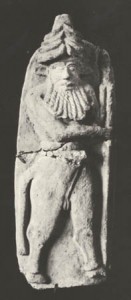 (Enkidu, creature created to join Gilgamesh in his travels)
(Enkidu, creature created to join Gilgamesh in his travels)
He is small in size but extremely strong in his bony frame.
As soon as he was born in the mountains,
He was in the habit of sucking the milk of animals.’
They set bread before him
He examined it and was puzzled by the bread.
They set beer before him.
He creased his eyes together and gazed at it;
He was puzzled by the beer.
The priestess said to him,
Said to Enkidu: ‘Eat the bread, Enkidu,
That you will be worthy of godliness!
Drink the fine beer,
That you will be worthy of kingship!’
Enkidu ate the bread,
He drank the fine beer (3),
And indeed seven jugs of it (4).
(We now return to the main version of the text)
He felt so free, he felt so happy
He rejoiced so in his heart!
His face became radiant.
He rubbed all the shaggy growth,
The hair of his body.
He anointed himself with oil
And thus he became a man.
He donned clothing –
Look! He is like a man!
He takes up his weapon,
He attacks the lions
So the shepherds might have peace at night.
He caught wolves,
He captured lions,
And the chief cattlemen could rest.
Enkidu was their watchman,
A man of strength,
An unparalleled hero!
To the shepherds he said: ‘I am a man now.
I can eat bread at the table,
I can drink strong drink.
But I have the strength of he who roams the steppe.
I am stronger than you.
No one is stronger.
You see I catch wolves,
You see I capture lions.
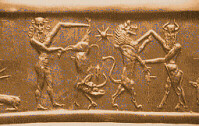 (Gilgamesh & Enkidu kill the beasts)
(Gilgamesh & Enkidu kill the beasts)
Because of me the shepherds can rest at night,
Because of me the chief cattleman can lie down.
I am become the king of the sheepfold.’
And Enkidu sat at the table,
He ate the food
He drank the strong drink
He felt good in his heart.
He made merry
Then he looked up
And saw a man
He told the girl: ‘Girl, bring the man.
Why is he here?
I must know his name!’
The girl called the man,
Went to him, said to him ‘Sir, where are you going?
Why have you taken this, your difficult course?’
The man spoke, spoke to Enkidu: ‘Into the people’s special place,,
Their very own meeting-house,
Even into it has he intruded!
Set aside rules and laws for wedlock!
On the city he heaped shame!
Strange practices he has imposed
Upon a city helpless to resist.
For the king of ram parted Uruk
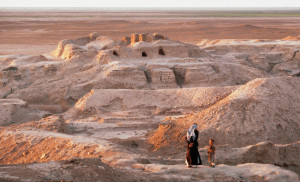 (Uruk‘s ramparts & residences of alien gods)
(Uruk‘s ramparts & residences of alien gods)
Has altered the unaltered way,
Abused, changed the practices.
Any new bride from the people is his;
Gilgamesh, king of ramparted Uruk,
He may mate with any new bride.
Before the lawful husband may have her.
The gods have ordained this
In their wisdom, by their will.
It was so decreed from the moment of birth
When his umbilical cord was cut out.’
At the man’s words
The face of Enkidu paled.
Fury grew within his heart,
His eyes became frightful to look upon
Enkidu spoke his anger,
Said to the man: ‘This cannot continue to be!
I will go to ramparted Uruk.
I will meet Gilgamesh
I will bring his excesses to an end!’
Enkidu set out for Uruk
Enkidu walked in front
The girl walked behind
When he entered ramparted Uruk
The people thronged round him
When he stopped in the street,
In Uruk of the ramparts,
Saying of him: ‘He is like Gilgamesh in form!
He is smaller in size
But stronger in bone.
He is a match for Gilgamesh!
He is the strongest of the steppe, strength is his,
Milk of wild creatures
He once sucked.
There will be endless clash of arms in Uruk!’
The nobles rejoiced: ‘Here is a hero
For all who are honorable!
To match divine Gilgamesh
Here is his equal!’
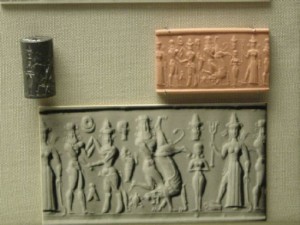
(Gilgamesh, Enkidu, Gilgamesh, Shamhat, & Inanna)
Now for the Goddess of Love
Is the bed made ready
Of the evening, ready to receive Gilgamesh for his pleasures.
Now he is coming along
But Enkidu appears in the street
And bars his way
To Gilgamesh is opposed
The might of Enkidu
The divine Gilgamesh is face to face
With his equal, Enkidu of the steppes.
The king of ramparted Uruk
Sees his equal, who has strength,
Smaller in size, but stronger of bone
Like unto Gilgamesh to the hair.
Gilgamesh sees his shaggy growth –
On the steppe the grass
Sprouts in as much abundance
Gilgamesh drew himself up
And stood before him
In the market-place of the land
Was there they met,
And Enkidu blocked the gate
With his foot and
Would not let Gilgamesh enter
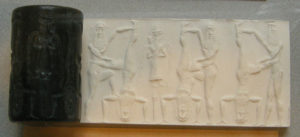 (giant wrestles giant)
(giant wrestles giant)
They grappled their belts and wrestled like champions
Rushing wind meets rushing wind,
Heart to heart against –
Holding fast like bulls.
They shattered absolutely the doorpost of the holy gate
And the wall shook with this fateful act.
The doorway of the house of the family
Where the bride awaited Gilgamesh,
There they struggled.
They fought in the street,
They battled in the market.
But in the end,
Brought Enkidu to the earth,
His own foot still on the ground,
And won the contest.
His anger vanished
He turned away
But when he turned away
Enkidu said to him
Spoke to Gilgamesh: ‘As one single and unique
Your mother bore you
She the wild cow of the steerfolds,
She, Ninsun the Wise, she the Strong
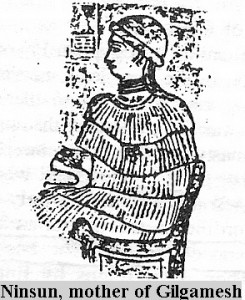
You are raised above all men
You are king of the people by decree
Of Enlil, son of the Great God An!’
NOTES ON TABLET II
1. Seven cups or seven jugs (see 1988 fragment) are symbolic, representing the sacred number of the seven initiatory planets, i.e. the Moon (Nanna/Sin), Sun (Utu/Shamash), Venus (Inanna/Ishtar), Mars (Marduk, & then son Nabu), Earth, Saturn (Anu), Mercuri (Ningishzidda) and Jupiter (Enlil).
2. The ‘sheepfold’ was probably a reference to the rites of the Shepherd, or the King of the Land (See Tablet IV, note 1).
3. Eating of the bread and drinking of the superior form of beer constituted probably a ritual of some kind, intended to prepare a candidate to the role of king and priest, a combination that was routine these days.
4. See note 1.
TABLET III
‘Your strength surpasses my own,
For why do you lord like a wild bull
Over the people of ramparted Uruk?
Are you not the king,
Shepherd of the people?
Gilgamesh answered, spoke to Enkidu: ‘No one before opposed my strength
Now I have found a worthy companion.
Together we could go to the Cedar Forest.’
Enkidu puzzled said to Gilgamesh: ‘Why do you wish to do such a thing?
It is a very long journey
To do what you say,
To go down to the Cedar Forest.
I will take a message for you.’
They kissed one another
And formed a friendship.
Gilgamesh spoke to Enkidu, said to him: ‘Oh my friend, I have always wanted
To climb Cedar mountain (1).
There dwells fierce Humbaba
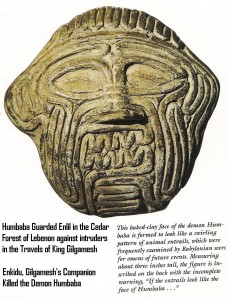 (Humbaba, Enlil‘s guardian of his cedar forest residence in Lebanon)
(Humbaba, Enlil‘s guardian of his cedar forest residence in Lebanon)
Who is evil and fearsome to look upon.
I wish to slay him
And banish what is evil from the land.
But he lives in the Cedar Forest
And I know not the way.’
[Here a large portion is lost]
The mother of Gilgamesh, who knows all,
Raises her hands to Shamash the Sun
[Here ten more lines are lost]
Enkidu‘s eyes brim tears, sick to the heart
Bitter sighs,
Yes, his eyes brim tears
Sick to heart and bitter sighs.
Gilgamesh, understanding, says to Enkidu:
‘My friend, why eyes brimming tears?
Sick to heart? Such bitter sighs?’
Enkidu said to Gilgamesh, told him:
‘My friend, a cry chokes me, constricts my neck veins,
My arms are limp,
My strength gone into weakness’.
Gilgamesh spoke to Enkidu, said to him:
[Here four or five lines are lost.]
‘In the forest terrible Humbaba lives
Let us, you and I, slay him,
And banish all that is evil from the land!’
[Here four lines are lost.]
Enkidu spoke, said to Gilgamesh: ‘My friend, I found it out
When I was ranging forth over the steppe,
Running with the wild beasts,
For ten thousand double-hours the forest stretches,
Extending in every direction.
Who could there possibly be
To go down into this place?
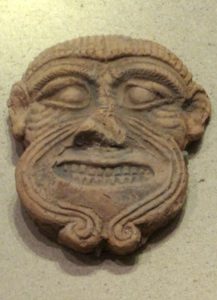 (Humbaba, Enlil’s creature guard of his cedar forests)
(Humbaba, Enlil’s creature guard of his cedar forests)
And Humbaba – his roaring is the Great Flood,
His mouth is fire,
His breath is death!
Why do you wish to do such a thing?
We are no match to fight fierce Humbaba!’
Gilgamesh spoke, saying to Enkidu: ‘I will climb the Cedar Mountain!’
[Here seven lines are lost.]
Enkidu spoke to Gilgamesh, said to him:
‘But how can we go to the Cedar Forest?
Dread Wer is its guardian, who sleeps not at all and is strong.
Humbaba-Wer is his…..Adad the storm is his voice,
He has the breath of death.
He was appointed guardian of the Cedar Forest
By Enlil, son of An (king of Heaven / planet Nibiru & Earth Colony), the Great God,
To terrify all mortals.
Humbaba – his roaring is the Great Flood.
His mouth is fire,
His breath is death!
At sixty double-hours he hears
Every wild cow in the forest.
Who can go down into his forest?
Enlil appointed him to be guard,
To watch the cedars, terrify mortals,
Weakness grips one who goes down into the Cedar Forest.’
Gilgamesh spoke to Enkidu, said to him:
‘Who can climb into heaven, my friend?
Immortal under the Sun are the gods alone,
As for mortals their days must end –
What they achieve is but the wind!
Even now you fear death.
Where is your hero’s strength?
I will lead you, then.
You may call to me: Advance, fear not!’
If I fall, I shall have made my name:
“Gilgamesh“, they will say, “against fierce Humbaba
Has fallen!” and long after,
My descendants born in my house
Shall honour my name
As one who struggled against fierce Humbaba
And fell in fighting on Cedar Mountain.
Speaking as you have, you have grieved me.
I will ready my hand,
I will fell the cedar trees,
I will make my name a name that endures!
I will commission the smith
To cast weapons for us.’
And they commissioned the smith;
The artisans sat down to discuss it.
They cast mighty adzes, they cast axes of three talents each –
And a talent contains sixty minas!
They cast mighty swords –
The blades were two talents each,
The knobs on their sheaths thirty minas each,
The handles of the swords
Thirty minas of gold each
Gilgamesh and Enkidu were both laden with ten talents apiece.
[A fragment from Uruk published in 1972 by von Weiher gives a slightly different account:]
They sit and take counsel together with the smiths:
‘We will cast the axe…..
The axe – it shall weigh one talent
Your sword – it shall weigh one talent
Your belt – it shall weigh one talent
Your belt………………………..
[The main account now resumes:]
At the great gate of Uruk
With its seven bolts
Gathered all of the people.
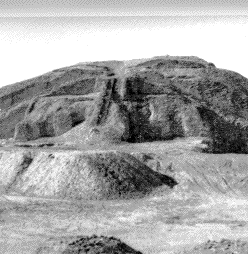 (defensive ramparts for the giant alien gods)
(defensive ramparts for the giant alien gods)
There in the street and market of ramparted Uruk
Stood mighty Gilgamesh
King of Uruk of the ramparts,
The people all sat down before him.
Gilgamesh spoke to them, saying: ‘O thou people of ramparted Uruk,
I am going on a journey to the Forest of Cedars,
Him of whom they speak,
At whose name all lands tremble,
I, Gilgamesh, will see.
I will conquer him in the Cedar Forest!
I will spread abroad among all lands
How strong are the progeny of Uruk!
I will raise my hand and cut down the cedars!
I will make my name a name that endures!’
[The 1972 fragment of von Weiher, just cited, preserves a different version, which highlights the astronomical references more clearly:]
‘The men of Uruk who know………………
There would I be strong, I travel the wheel-rim……
I commence the struggle which I know not, the motion
Blesses me!…… the path……. before
I will enter the city gate of Uruk….
I will turn towards, and the Akitu Festival in (Babylon)……………..
I will celebrate the Akitu Festival in……
The Akitu Festival shall be arranged and joyful singing shall be heard.
One shall ever cry out and cry out again against magnificent garments in….
Enkidu – to the elders he said: ‘What the men of Uruk ……………………….
He spoke to him; he should not enter the forest…..
The wheel-rim should not be journeyed upon; a man ……………………….(3)
The guardian of the forest………………………..
[This is the end of the fragment In the main text, no speech by Enkidu is recorded at all. A fragment of about 1400 BCE published by Gernot Wilhelm gives a few lines of yet another version of these events. Gilgamesh explains why he wishes to go on the expedition against Humbaba and the elders of Uruk ask him to reconsider:}
‘I wish to set up a name, a name which will endure perpetually in their mouths.
Of my deeds I wish the land to listen!
I wish my name to be a name which endures!
Such a name I wish to establish for myself!
The elders of Uruk replied to Gilgamesh:
‘But Gilgamesh, why do you wish to do this?
The struggle at the abode of Humbaba is not to …..?’
[Here the short fragment breaks off. We return once more to the main text:]
The elders of ramparted Uruk replied to Gilgamesh, said to him:
‘You are very young, Gilgamesh,
Your heart has swept away your reason.
You have no knowledge of what is involved
We are told that Humbaba is strange to see and terrifying.
Who can possibly withstand his weapons?
For ten thousand double-hours in every direction
Extends his great forest (in Lebanon).
Who would go down into such a place?
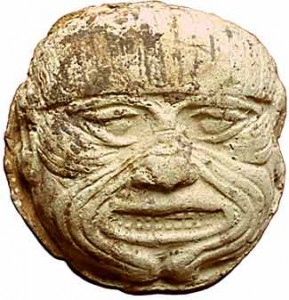 (Humbaba, Enlil‘s guard for his cedar mountains)
(Humbaba, Enlil‘s guard for his cedar mountains)
Humbaba – his roaring is the Great Flood.
His mouth is fire,
His breath is death!
Why do you wish to do such a thing?’
No one is a match to struggle with Humbaba.’
When Gilgamesh heard these words of his advisers,
He looked round, smiling to his friend:
‘Now, my friend, thus do they tremble
And fear even to speak of fierce Humbaba.
O Enkidu, together we can face him
In his great forest of cedars, and gain renown.
O elders of Uruk, I go with my friend Enkidu,
He of the steppe who has strength.
Together we will face fierce Humbaba.’
The elders answered Gilgamesh and said:
‘May they own god protect thee
May he lead thee back safely along the road
May he bring thee back to the quay of Uruk.’
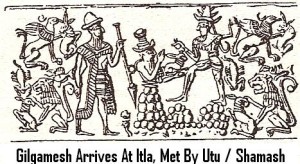
Gilgamesh then fell down before Shamash the Sun (God) and spoke these words:
‘I go, o Shamash, my hands raised in prayer;
Bless the future well-being of my soul.
Bring me back safely to the quay of Uruk, and
Cause thy protection to be established over me.’
Gilgamesh called his friend
And inspected his omen.
[Here seven lines are lost. The omen, which would have been read from the liver, gall bladder and intestines of a sacrificial lamb must have been unfavourable.]
Tears ran down the face of Gilgamesh.
‘I must travel a road I have never traveled,
I must follow a way I know not.
But I know I should fare well,
And I depart with a joyful heart.
May the blessings of the Great Gods be upon me!
They who are on their celestial thrones.’
And then were brought to him his weapons,
Those mighty swords,
Quiver and bow,
All placed in his hands,
He took the adzes,
And, with his quiver,
The bow of Anshan (Nisaba)
Into his girdle he put his sword
That they might depart.
The people pressed around Gilgamesh:
‘By the will of God may you return to the city!’
The elders paid homage
And counseled Gilgamesh concerning his journey:
‘Trust not your strength alone!
Be wary and alert, on guard.
Let Enkidu walk before you.
He has seen the way, has traveled the road.
He who leads the way saves his companion,
He who knows the path protects his friend.
Enkidu has seen combat, knows it,
Knows the way to the Cedar Forest.
Over the obstacles and ditches will he carry you.
Let him penetrate and slip through
All the passes of the forest of Humbaba.
May Shamash grant your wish,
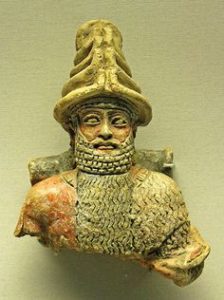 (Utu, symbolized as, & is the original Sun God)
(Utu, symbolized as, & is the original Sun God)
May he show you of what you speak.
May he open the unopened path for you,
Unbar the road for your coming,
Unclose for you the foot of the mountain!
May your nights bring you delights,
And may Lugulbanda (Gilgamesh‘s father) stand by you,
May he stand by your wish!
May you attain your wish as does a child!
After slaying Humbaba, which you are attempting,
Wash then your feet.
When time to rest at night, dig a well –
May the water of your water-skin be ever pure! –
And offer cool water to Shamash.
And be ever mindful of Lugulbanda!
Enkidu, we the Assembly
Entrust our king to you.
Do you deliver him back to us!’
Gilgamesh spoke to Enkidu, said to him:
‘Up, my friend, let us go to the Great Palace
 (Gilgamesh, his mother Ninsun, & Enkidu)
(Gilgamesh, his mother Ninsun, & Enkidu)
To see Ninsun (Lugulbanda‘s spouse), the Great Queen
Ninsun the Wise, who has knowledge of everything,
Will make wise our feet in their course.’
Gilgamesh and Enkidu, to the Great Palace,
To see Ninsun, the Great Queen.
Gilgamesh stepped forward on entering the palace:
‘O Ninsun, I make bold to depart
On a great journey to the place of Humbaba,
I must face battle strange to me,
Travel a road unknown to me.
Until I can return, until I come to the Cedar Forest,
And banish all that is evil from the land,
All that is hateful to Shamash,
Do pray to Shamash on my behalf.’
(Here several lines are lost)
Ninsun entered her chamber
(Here one line is lost)
She donned a garment suitable to her body
 (Ninsun, mother to gods & semi-divine mixed-breeds appointed to kingships)
(Ninsun, mother to gods & semi-divine mixed-breeds appointed to kingships)
Also an ornament appropriate for her breast
Placed her tiara on her head,
Went out into the grounds,
Climbed the stairs, ascended the parapet
Attained the roof and there did offer up
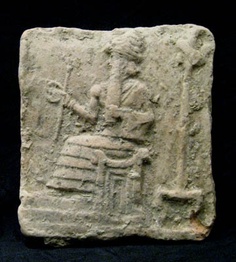 (Utu / Shamash, son to Nannar & Ningal)
(Utu / Shamash, son to Nannar & Ningal)
To Shamash the Sun much incense
With this smoke-offering in progress
She raised her hands to Shamash:
‘Having granted me as my son Gilgamesh,
Why have then have you given my him such a restless heart?
Why have you made him wish to go on a Great Journey to the place of Humbaba?
To face a battle strange to him?
To travel a road unknown to him?
Until the day he can return, until he reaches the Cedar Forest ,
Slays the fierce Humbaba
And banishes from the land all that is evil which you hate,
In the day hours when you shine forth,
May Aya your bride fear you not and keep you mindful
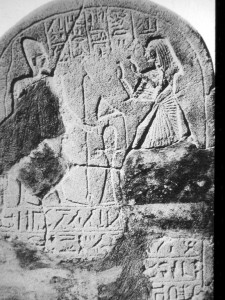 (Utu & his goddess spouse Aya)
(Utu & his goddess spouse Aya)
And may she also commend him
To those who watch over the hours of the night!
(Here many lines are lost)
She put out incense, chanting a spell.
Then she summoned Enkidu
To impart him this message:
‘Mighty Enkidu, you who came not from my womb,
I have now adopted you,
As have the devotees of Gilgamesh,
The priestess, the votaries, the cult women!’
And around the neck of Enkidu she placed….
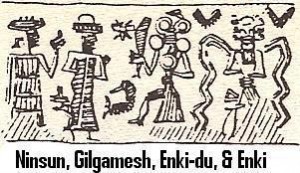
(The remainder of this line and several others are completely lost. In all probability Ninsun placed an amulet around Enkidu‘s neck. When the text resumes again, Gilgamesh and Enkidu are with the elders and about to depart.)
‘Let Enkidu protect the friend, safeguard the companion,
Let him carry him through the pitfalls!
We, the Assembly, entrust to you our king:
Do you deliver him back to us!’
Enkidu then spoke to Gilgamesh, said to him:
‘Since you are determined upon the struggle,
Then come away.
Let your heart not be troubled and follow me.
My friend, turn not away from the journey.
A way not known to you
Need hold no fears when I shall lead you.
In the Cedar Forest I know the dwelling place
And also the road which Humbaba travels.’
(Here seven lines are lost)
When the elders had heard this speech of his
They sent the hero on his way
‘Go, Gilgamesh – may Shamash grant your wish,
And may your God be at your side.’
NOTES ON TABLET III
1. Cedar mountain and Cedar Forest are a mixture of the mythical and real. Their geographical location is a subject of hot dispute among scholars; one strong possibility is Lebanon, though not everyone agrees on this.
2. The Akitu Festival was a celebration of the New Year, at the Spring Equinox, and its repeated mention is in keeping with the more overt astronomical terminology of this fragment.
3.(For an explanation of the cosmic wheel and traveling its rim, see the notes to Tablet IX.) The word used here for ‘wheel-rim’, allak, is inevitably mistranslated as ‘road’ or ‘way’ by others because its true meaning has not been understood by previous scholars in its astronomical context of the cosmic wheel of the sky, which, seen from earth, appears to turn.
TABLET IV
(Most of this tablet is mutilated and lost.)
After twenty intervals
They broke off a morsel
After thirty more
Rested for the night
Fifty were the intervals
Which they trod in a day
In three days, one month and fifteen days
Before Utu / Shamash the Sun they dug a well.
(The rest of the column is missing. After a missing portion of the next column, the text recommences.)
After twenty intervals
They broke off a morsel
After thirty more
Rested for the night
Fifty were the intervals
Which they trod in a day
In three days, one month and fifteen days
(Here then lines are missing)
Gilgamesh went up the mountain
Poured out the fine-meal and intoned
‘O Mountain, bring me a dream that is favourable.’
(The rest of the column is missing, as well as the following two columns in their entirety and the beginning of the fifty column. By the time the text resumes in the incomplete fifth column, Gilgamesh and Enkidu have arrived at the doorway or gate of the Cedar Forest. Enkidu is encouraging a hesitant and wavering Gilgamesh.)
‘Remember your words when in Uruk?
Come, rise, that you may slay him!
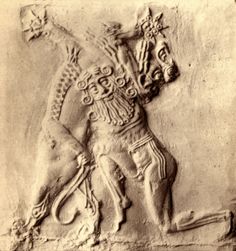 (progeny of Anu’s, Inanna’s, & Ninsun’s city of Uruk)
(progeny of Anu’s, Inanna’s, & Ninsun’s city of Uruk)
Are you not Gilgamesh, the progeny of Great Uruk?’
Gilgamesh heard these words from his mouth
And great became his confidence.
‘Quickly, step up to him, let him not go –
Not go down into the woods and vanish there,
Where he cloaks himself with seven cloaks (2)
One is on him now, six are still off…’
Like unto a lordly bull he rages and is full of…
He the Guardian of the Forest calls out….Humbaba, like
(The rest of the column is missing, as is the beginning of the next. The text commences again as follows:)
Enkidu spoke to Gilgamesh,
Said to him: ‘Let us not go down into the heart of the forest!
‘… my friend, as weaklings…. ….we have traveled, all of them…. ….before us…..
My friend – canny in combat, you are skilled in battle;
Only touch my garment and you will not fear death.
… and remain with me….’
(Here one line is undecipherable)
‘So that the limpness may leave your arm
That the weakness leave your hand…
Stay by me as my friend and let us go.
Together into the depths of the forest
Let not combat destroy your courage.
Forget death and do not…
A man determined to action but thoughtful…
He who leads the way preserves himself
And keeps his companion safe.
Though they may perish
Yet their name will endure.’
And so they both arrived at the green mountain.
They fell silent and stood quite still.
NOTES ON TABLET IV
1. There is little doubt that the traversing of 50 intervals on each of these two days is meant to be significant. Speiser’s version is ’50 leagues’ and Heidel’s ‘fifty double-hours (See Tablet IX, note 13 for a further discussion of ‘double hours’.) Both these translations seem to be justifiable but each contradicts the other, since the first is an interval of space and the second an interval of time. The text also provides us with the information that in their 3 days’ travel Gilgamesh and Enkidu traversed the distance of one month and fifteen days, or three half-months, which is an interval of time measured in space – the distance of a month and a half’s time within three days’ time.
The fact that later, at the end of Tablet XI, we find identically worded descriptions of a journey of twice-fifty intervals made by Gilgamesh back to Uruk from an entirely different location than the Cedar Forest serves to prove the non-specific geographical intent of descriptions in the Epic of journeys, which in reality are meant to have rather a metaphysical significant and probably a cosmographical setting.
2. See Tablet V, note 7.
TABLET V
They stood quite still and looked at the forest,
Saw how high were the great cedars,
And gazed upon the entrance to the forest.
There, where Humbaba was wont to tread,
Was a fine path; straight it was and easy to travel.
They saw also the Cedar Mountain, where lived the gods
And Irnini, Goddess of Love, holy Inanna had her throne seat
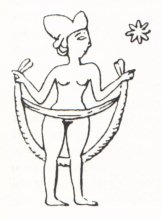
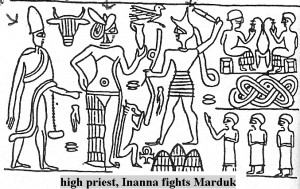 (Inanna, Goddess of Love & War)
(Inanna, Goddess of Love & War)
The cedar raised aloft its great luxuriant growth:
What cool shade, what delight!
Covering the brushwood, covering the….
(Here the text breaks off. It resumes, after an indeterminate lapse, with Gilgamesh speaking to Enkidu:)
‘Rise up, cast your gaze tot he mountain….!
My divine sleep has been torn from me.
My friend, I saw a dream – Oh, how ill-omed!
How….! How disturbing!
I seized a wild bull of the steppe;
He bellowed, he kicked up the earth,
And the duks darkened the sky.
I gave way before him.
He was seizing…. strength, my flank
He tore out the ……………………….
He provided food…………………..he drank
He gave me water to drink from his water-skin.’
[The text continues unbroken without identifying the speakers, but Enkidu is obviously replying to Gilgamesh:]
‘My friend, the god to whom we go is not a wild bull,
Although his form is surpassing strange.
What you saw as a wild bull is really
The radiant Shamash the Sun
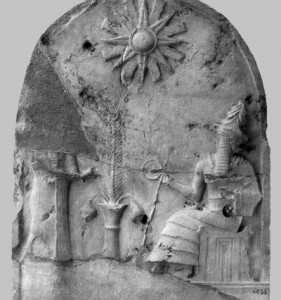 (damaged mixed-breed king & giant Shamash / Utu, Sun God, twin to Inanna)
(damaged mixed-breed king & giant Shamash / Utu, Sun God, twin to Inanna)
He will take us by the hand in our dire need,
He who gave you the water to drink from his water-skin –
He is your special god who brings you honour, Shamash the Sun.
We should therefore join him together
With Lugulbanda, your father, your own god, your familiar,
So that we might do a deed, such deed,
Which, though we die, yet will not be inglorious.’
[There may be a break here, as the order of the fragments is uncertain. But the text continues coherently:]
They took hold one of the other
And went to their nightly rest
Sleep descended upon them –
As it were the great surge of night.
But upon midnight hour a-sudden,
Sleep flew from Gilgamesh.
To Enkidu, his friend, he tells his dream:
‘If you have not waked me, then how do I wake?
Enkidu, my friend, I must have seen a dream!
Have you not waked me? Why ……?
Aside from that first dream,
I now have seen a second dream;
In my dream a great mountain fell,
Pinned me to the ground, trapped my feet beneath it.
A great glare of light overwhelmed me.
A man like any other –
Such a man as we have never seen –
Stepped forth from the light.
His grace and beauty were more,
More than any on this earth.
He freed me from the mountain,
Gave me water to drink,
Quieted my heart.
He put my feet back on the earth.’
Enkidu spoke to Gilgamesh,
Said to him: ‘My friend, let us go down into the plain,
Let us go take counsel together.’
[Several lines are lost here, and we don’t have Enkidu‘s interpretation of the dream. Perhaps the wondrous man is again Shamash, who was seen as a bull, probably because the Epic was written in the Age of Taurus, between 4,000 and 2,000 BCE, when the sun rose at the spring equinox in the sign of the Bull. Shamash is also the root deity of Gilgamesh. After a break, the text resumes as follows, with Gilgamesh again speaking:]
‘A second dream I saw:
We were standing in mountain gorges
And a mountain fell upon us.
It was so large that by comparison
We were like small reed flies –
Like the little fly of the cane-brakes we were.’
He who was born on the steppe…
Enkidu said to his friend: ‘My friend, the dream is auspicious,
It is a precious dream….
My friend, that mountain which you saw
That mountain is Humbaba.
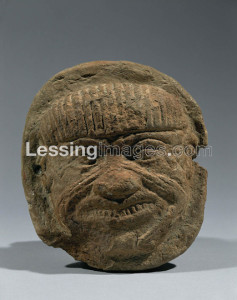 (Huwawa / Humbaba, Enlil‘s creature-creation for needed work, & a continuous guard)
(Huwawa / Humbaba, Enlil‘s creature-creation for needed work, & a continuous guard)
We shall seize Humbaba, we shall kill him,
And cast his dead body on the plain.
On the morrow…’
After 20 intervals, they broke off a morsel
After 30 more, rested for the night.
Before Shamash the Sun they dug a well….Gilgamesh went up a mountain
Made offering of his fine-meal and intoned:
‘O Mountain, bring a dream for Enkidu,
Bring for him a dream of mine to interpret!’
And the mountain did bring a dream for Enkidu.
It brought for him….
Cold rain passed overhead….
He had to take shelter…. …. and like unto the wild barley of the mountains…..
Gilgamesh puts his chin to his knees,
Sleep which falls upon mankind
Fell upon Gilgamesh.
He started, full awake, said to his friend:
‘My friend, have you called me?
Why am I awake?
Did you touch me?
Why have I started so?
Did not some god pass by?
Why have I gone numb?
Why are my limbs paralyzed?
My friend, I saw a 3rd dream,
And this dream was terrible in every way.
The heavens were roaring and screaming
The earth was blasted with booming sounds,
And darkness descended like a shroud –
A sudden streak of fire as lightning flashed,
The clouds grew bloated and full
And they rained down death!
Then the fire-glow of the skies died out
And all the fallen of the fire
Of that downpour of death
Crusted over to ashes.
Oh, let us go down into the plain!
There we can take counsel!’
When Enkidu heard this,
Heard the dream his friend offered him,
He said to Gilgamesh interpreting his dream,
Made him come to acceptance of his dream:
[Most unfortunately we do not have any account of Enkidu‘s interpretation of the dream as the text breaks here. When the text resumes, Gilgamesh and Enkidu are no longer conversing about the dream but have arrived at the forest of Humbaba:]
Gilgamesh gripped the axe
And with it felled the cedar.
Humbaba, hearing the sound of this,
Fell into a fury and raged: ‘Who is it who has come –
Come and interfered with my trees?
My trees which have grown on my own mountains?
And has also felled the cedar?’
But just then from heaven came the voice
Of the Great God Shamash the Sun:
‘Have no fear. Approach him and……..
March, as long as………..
He enters not into his house……..’
[Here the text breaks off. Gilgamesh and Enkidu are apparently given instructions by the voice of Shamash on how to approach Humbaba in order to kill him. This would seem to include specific directions and useful information about Humbaba‘s movements. But the heroes do not seem to fare very well even with such helpful hints:]
His tears streamed down from him
And Gilgamesh said to Shamash in heaven:
[Here two lines are mutilated in the tablet and cannot be read:]
‘But I have taken the way of heavenly Shamash, I have trod the way he said.’
Humbaba said to him, said to Gilgamesh: ‘The fool, the stupid man –
They should take advice, Gilgamesh!
Why do you now approach me?
With that Enkidu, that son of a fish (2)
Who knew not his father,
Companion of the small turtles, of the large turtles,
And who never sucked the milk of his mother?
In your youth I beheld you
Now should I kill you to satisfy my belly?
Shamash brought you, Gilgamesh, and allowed you to reach me.
It is through his assistance that you are stepping along thus.
But, Gilgamesh, I will bite through the palate-pin
Of your throat and your neck.
I will allow the shrieking serpent-bird
The eagle and the raven to eat your flesh!’
Gilgamesh said to his friend, said to Enkidu:
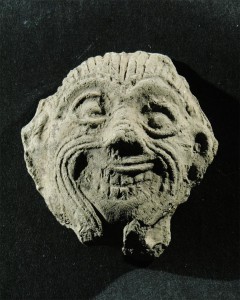 (Humbaba artifacts are many, story told was that important to earthlings)
(Humbaba artifacts are many, story told was that important to earthlings)
‘My friend, Humbaba‘s facial features have altered,
And their configuration raises itself to an equal height (3)
But my entrails are gripped by fear that we are too hasty.’
Enkidu said to him, said to Gilgamesh:
‘My friend, why do you wail so miserably
And let your mouth go flabby
And conceal yourself?
For now, my friend,
The axe has been cast for you –
The copper-smith poured its molten metal from the gutter channel,
Annealed it by heating for a double-hour,
Allowed it then to cook for a double-hour,
Producing this weapon of the flood-storm.
Seize the whip –
Travel not on your feet,
Do no turn back!
Strike with the axe and make your blow strong!’
Shamash in heaven heard the prayer of Gilgamesh
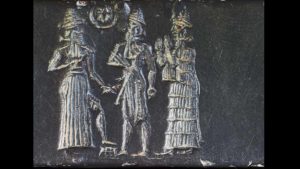 (Utu the Sun God, Gilgamesh, & his mother goddess Ninsun)
(Utu the Sun God, Gilgamesh, & his mother goddess Ninsun)
And against Humbaba rose up mighty winds:
The Great Wind, the North Wind, the South Wind, the Whirlwind,
The Storm Wind, the Chill Wind the Tempestuous Wind
The Hot Wind – eight were the winds.
They rose up against Humbaba.
Lo! He cannot move forwards!
Lo! He cannot move backwards!
And so Humbaba relented.
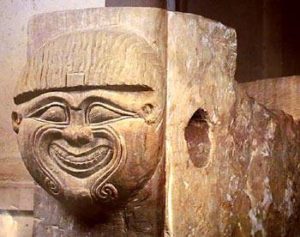 (artifacts of the Gilgamesh event from our ancient history)
(artifacts of the Gilgamesh event from our ancient history)
Then Humbaba answered Gilgamesh:
‘Oh, do let me go, Gilgamesh! You will be my master,
I will be your servant. and as for my trees,
My trees which I have grown, I will……………………….
Strong…………………….I will cut them down and build you houses.’
But Enkidu said to Gilgamesh: ‘Do not listen to him.
Hark not to the word of Humbaba.
Humbaba must not live!’
[An earlier fragment from Uruk published in 1980 by von Weiher gives a variant version of this section, listing 13 winds rather than 8:]
……… they might be turned away, ……… distant are they.
He struck his head and drew himself up against him.
With the heels of their feet they removed the earth;
Mount Hermon and Lebanon and their surrounding districts
Are being destroyed.
Then the white clouds became black,
And it rained the presage of death on them
Like a light rain in a mist.
But Shamash raised up great winds against Humbaba:
The South Wind, the North Wind,
The East Wind, the West Wind,
The Blowing Wind,
The Squally Wind,
The Shaparziqqu Wind,
The Evil Storm,
The Sihurra Wind,
The Wind of Frost,
The Storm,
The Thunder Storm – 13 winds he raised against him
And Humbaba‘s face was darkened.
He cannot push forwards,
He cannot run backwards;
But the weapons of Gilgamesh could now reach Humbaba.
Humbaba now besought his life,
And said to Gilgamesh: ‘Small you were, Gilgamesh –
Your mother bore you,
And you are of the offspring of (Ninsun, Shamash’s 1st cousin)……..
Agreeable to the command of Shamash
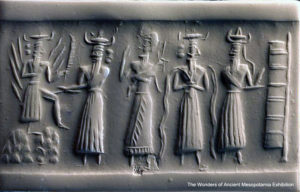 (Utu of the mountains rises up)
(Utu of the mountains rises up)
Of the Lord of the Mountains, you rose up
“But he is the offspring
In the midst of Uruk:
The king – Gilgamesh!”
[Here three lines are missing, except that the mention of the name of Gilgamesh can be made out twice:]
I will sit down with you and………….
Trees, as many as you already have said……
I will defend you! The wood of the myrtle…………….
It is enough………..
Enkidu said to him, said to Gilgamesh: ‘My friend, do not listen
To what Humbaba says.’
[Here some lines are missing. A mutilated fragment published by Gernot Wilhelm in 1988 can be inserted about this point. Humbaba appears to castigate Enkidu for bringing Gilgamesh to him:]
‘…… You have led him before me!
…… splendour.’
[Humbaba then appears to complain either to Gilgamesh or Enkidu that he did not stay at home enjoying simple comforts:]
‘Could you not marry a wife
And satisfy yourself with her voluptuousness?
[Humbaba then appears to be battered by the various winds:]
But the great winds roared against Humbaba …. the …. dust-storms flowed
Perpetually on his head.
[Enkidu then seems to plead with Gilgamesh to kill Humbaba:]
‘I beg you to listen to me, my friend!’
….. he struck down once more speedily and ….. to the little child.
[We now return to won Weiher’s 1980 fragment. Humbaba is speaking to Enkidu:]
‘But you know the sign of my forest, the sign……
And you know precisely everything that is said.
I should have lifted you up on high,
I should have killed you upon your entrance
Into the branches of my forest!
I should have let the shrieking serpent-bird,
The eagle and the raven eat your flesh!
But now, o Enkidu,
It lies with you. Make limp your wrath.
Speak to Gilgamesh!
He might spare my life!’
Enkidu said to his friend, said to Gilgamesh:
‘My friend, Humbaba the guardian of the Cedar Forest……
Strike him to maim him.
Kill him! Crush him! And quickly,
Humbaba, the guardian of the forest –
Strike him to maim him.
Kill him! Crush him! And quickly.
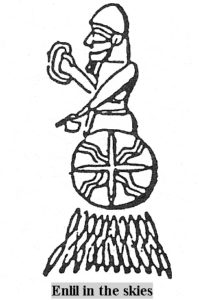 (Enlil in his sky-disc hovering over Mesopotamia)
(Enlil in his sky-disc hovering over Mesopotamia)
Before God Enlil, the Foremost hears his cries.
The gods will be filled with wrath against us for our deed.
Enlil in the city of Nippur, Shamash in…..
Put down and…..’
As Gilgamesh came nearer to Humbaba
But Humbaba heard his approach.
And ….. Humbaba……
[Here many lines are lost:]
He heard………………………….
[Here three lines are lost. Humbaba is speaking to Enkidu:}
……….. my forest……………..
But denunciations are caused…..
You sit there like a shepherd………
But as………………….
But now, o Enkidu,
It lies with you. Make limp your wrath.
Speak to Gilgamesh!
He might spare my life!’
Enkidu said to his friend, said to Gilgamesh:
‘My friend, Humbaba, the guardian of the forest……
Kill him and quickly
Before God Enlil, the Foremost, hears his cries…..
The gods will be filled with wrath against us for our deed.
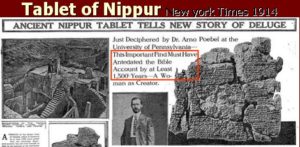
Enlil in the city of Nippur (Enlil‘s Earth Colony Command Central), Shamash in…..
But Humbaba heard his approach
And……..
[Here many lines are lost. When the text resumes, Gilgamesh and Enkidu seem to be quarreling;]
‘Should not……
Should not erect a higher altar than his friend?
Gilgamesh and Enkidu should never more
Have one another as friends!’
Enkidu said to him, said to Gilgamesh: ‘My friend, I speak to you
But do you not put a stop to my words.’
[The above may not have been a quarrel, but might instead have referred to them never again having each other as friends because one of them might die. Now many lines are lost, including the description of the slaying of Humbaba, which however, survives in other versions. The last portion of the 1980 fragment comes at the end of this tablet.
We now turn to the Sumerian tale Gilgamesh and the Land of the Living, written in Sumerian language long before the Babylonian culture exited, and hence representing the earliest stage in the Gilgamesh literature. In this version the situation is slightly different. Gilgamesh and Enkidu did not go alone on their expedition but were accompanied by 50 strong warriors of Uruk, each of whom carried in his hands a felled tree – which there is some reasons to believe served as oars. These 50 warriors were probably the prototypes of the 50 Greek Argonauts, particularly as the tale of the Argo was current in the time of Homer, since Homer himself referred to it as the ‘fabled’ Argo. It is these 50 anonymous heroes who are referred to below collectively as the sons of the city:]
Gilgamesh prayed:
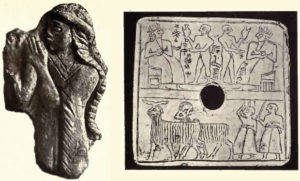 (mother to Gilgamesh, the goddess Ninsun)
(mother to Gilgamesh, the goddess Ninsun)
‘O Shamash, by the life of my mother Ninsun, who gave birth to me,
And of pure Lugulbanda, my father, truly I have entered this land of the cedar
And here have I known your dwelling place.
My small weak strength truly have I brought into this land for you as……
…. in you … would I enter.’
Then Humbaba himself uprooted for Gilgamesh
The first of his trees.
The sons of the city who had come
Come with Gilgamesh from Uruk
Cut down the tree’s crown, bundled it,
Lay it at the foot of the mountain.
After Humbaba himself had finished off
The seventh tree for him, Gilgamesh approached his chamber.
He … d the ‘ snake of the wine quay’ (5) in his wall’
Like one pressing a kiss, he slapped his cheek
Like a captured ox,
A nose ring was thrown over Humbaba.
Like a captured hero,
A rope was fastened about him.
Humbaba, his teeth shook,
He warded off Gilgamesh: ‘Oh, I would say a word unto
But Enkidu answered Gilgamesh:
‘She the tallest who discriminates not,
She Namtar (of the Under World), awful Fate,
She will devour.
Namtar knows no distinctions.
If the caught bird is let go free,
Flies back to his place;
If the captive man returns,
Returns to the bosom of his mother;
Then will you never return to your city
To that city of your mother who gave birth to you.’
Humbaba says to Enkidu: ‘To him, o Enkidu
You have spoken evil against me!
O mere hireling, who carries the food,
Who stands next to the….. of the rival,
You have spoken evil words to him!’
Humbaba then uttered against them his first terrifying roar.
The 50 companions then moved forward with Gilgamesh;
They cut down the branches, they tied them,
They laid these at the foot of the mountain.
The companions moved forward with Gilgamesh;
They cut down the branches, they tied them,
They laid these at the foot of the mountain.
He uttered against them his third terrifying roar.
The companions moved forward with Gilgamesh;
They cut down the trunk, they cut the side of Humbaba,
He uttered his fourth terrifying roar.
The companions moved forward towards him;
They cut down the trunk, they cut his side
They laid them at the foot of the mountain.
He uttered against them his fifth terrifying roar,
The companions moved forward towards him
They cut his trunk, they cut his side,
They laid these at the foot of the mountain.
He uttered his sixth terrifying roar.
The companions advanced towards him
They cut his trunk, they cut his side.
They laid these at the foot of the mountain.
At the moment when his 7th roar was coming to an end,
He approached the room where he rested.
His figure was formed like a serpent of…… wine
Like someone who gets ready to give a kiss,
He laid the palm of his hand against his cheek (6)
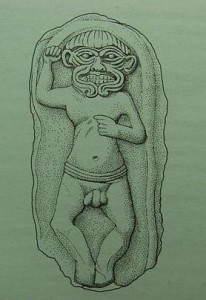 (Humbaba, artifacts fashioned by eye-witnesses, backing up the texts)
(Humbaba, artifacts fashioned by eye-witnesses, backing up the texts)
As for Humbaba, his face now became noble.
Like a captured mountain bull on a leash, he approached;
Like a captured sailor, he had tied elbows.
Humbaba, the tears came to his eyes, he grew pale:
‘Gilgamesh, you, you know?
My king? Let me say a word:
A mother, who would have brought me into the world I did not know one.
A father, who would have raised me – I did not know one.
The mountain begat me –
You, you will raise me!’
Gilgamesh swore by the sky,
Swore by the earth,
Swore by the Underworld;
He took the …. in his hand,
When he would not want to lose it?
And of Gilgamesh, (giant mixed-breed) son of Ninsun (lived much longer than earthlings),
Now is his heart moved to pity.
To his servant Enkidu, he spoke these words: ‘Enkidu, a caught bird –
Ought he not to return to the arms of his mother?’
Enkidu interrupted him: ‘But you, should you be taken prisoner,
You will not return to the arms of your mother.
Who has ever seen the hands of a prisoner of war unbound?
An imprisoned priest returned to the temple residence?
A lukur-priestess returned to her pleasures?
If you set him free,
He will obstruct the way up the mountain,
He will make the footpath impassable up the mountain.’
Humbaba, who had heard this speech,
Addressed these words to Enkidu:
‘You, Enkidu, you have spoken these words,
Hostile and pernicious.
You, the mercenary, recruited for a pittance,
Who drags himself along after his fellow.
Such are you – that is why
The hostile words come!’
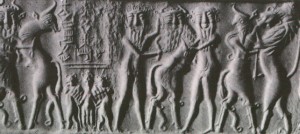
(aliens discovered homo-erectis, in time Enki & Ninhursag fashioned them into adequate workers for the gods)
Because he had spoken in this manner,
Enkidu, in an excess of fury,
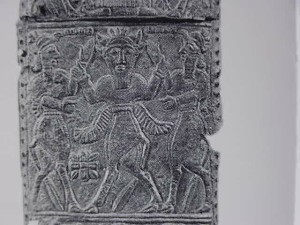 (Enkidu & Gilgamesh kill Humbaba)
(Enkidu & Gilgamesh kill Humbaba)
Cut off his head,
Wrapping it in a shroud.
[Another fragment gives the following version:]
When he had spoken thus,
They cut off his neck
They placed upon him….
They brought him before God Enlil and Goddess Ninlil (Enlil‘s spouse)
Enlil brought forth from the sea his palace servant
And Ninlil brought forth from…. her….
When Enlil and Ninlil…..‘Why thus……?
Let him come forth, let him seize…..’
[We now return to where we broke off a moment ago]
In front of Enlil they entered,
In front of Enlil, having kissed the earth,
They threw down the shroud,
They took out the head
And they rested it in front of Enlil.
Enlil, at the sight of Humbaba,
Grew angry at the words of Gilgamesh and said:
‘Why do you act in this way?
May your faces be seared by fire!
May the food you eat be eaten by fire!
May the water you drink be drunk by fire!’
[There is a gap here, during which Enlil presents Gilgamesh with the seven melammus or roars of Humbaba:] (7)
At the end of their conversation,
After his servant had prepared a sweet….
Enlil said: ‘Place him down before you,
Make him eat the bread that you eat,
Make him drink the drink that you drink.
After Enlil had taken away Humbaba,
He retained his exalted terrifying roar;
He attached the first roar to a large river;
He attached the second roar to…………….
He attached the third roar to ….. which carried….
He attached the fourth roar to a lion
He attached the fifth roar to barbarity,
He attached the sixth roar to a mountain
He attached the seventh roar to the goddess Nungal (Bau).
To the king, who subdued and conquered the terrifying roar,
To Gilgamesh the wild bull.
Who plunders the mountain.
Who goes from there to the sea –
Glory to him!
And from valiant Enkidu -glory to Enki!
God Enki, that your glory be sweet!
[The Sumerian text breaks off here. The text which follows is from a recently discovered fragment of a later period and also uses the imagery of the caught bird. As the reader will already have noted, the reference in the Sumerian material to the cutting down of the trees as a gesture of appeasement by Humbaba to Gilgamesh continues a theme in the fragment of a later period which cam just before the Sumerian inset.
We now return to the Epic of the later period, which offers another version of the death of Humbaba:]
Gilgamesh said to Enkidu: ‘We will arrive in…………………,
In the confusion the melammus will vanish –
The melammus, the furies, the radiant beams,
The ordained haloes of the power, these –
They will vanish.
The melammus will vanish and then
The brilliance will become all clouded.’
Enkidu said to Gilgamesh: ‘My friend, first catch the bird.
Then, where will the young birds fly?
Therefore let us see later those Melammus.
For, like young birds, they will only run about the grass!
First kill Humbaba, then kill his servants!’
Gilgamesh heeded the words of his friend.
With his hand he took the axe,
Drew the sword from his belt.
![[Louvre]](https://www.mesopotamiangods.com/wp-content/uploads/2014/07/8i-Death-of-Humbaba-1-300x243.jpg) (ancient artifact of Humbaba being killed)
(ancient artifact of Humbaba being killed)
Gilgamesh struck the neck of Humbaba, Enkidu, his friend, struck Humbaba twice also.
At the third blow Humbaba fell.
Confusion….. dumbfounded,
He struck the watchman, Humbaba, to the ground.
For two leagues the cedars resounded.
Enkidu killed with him
Forest…. cedars
At whose word Mount Hermon -Saria (9)
And all the Lebanon trembled.
All the mountains became…….
All the hills became…….
He slew the ……cedars,
Those destroyed…. after he killed the seven,
The net…. the sword which weighed eight talents,
The netam (10) of eight talents,
Bearing these he pressed on into the forest.
He opened up the secret dwelling of
The 50 Great Gods, the Anunnaki,
They who are seated on their thrones.
While Gilgamesh cut down the trees, Enkidu dug up the urmazili (11)
Enkidu said to Gilgamesh: ‘………Gilgamesh, felled are the cedars.’
[The 1980 fragment of von Weiher provides a bit more of the text here:]
……. the blow of their rottenness, Gilgamesh felled the trees,
Enkidu searched everywhere towards…..Enkidu said to him said to Gilgamesh:
‘My friend up to now the high-grown cedar’s tip would have penetrated to heaven
I make from it a door whose height will be six dozen yards (12)
Whose width will be two dozen yards.
One yard will be its thickness. Its door-pole
Its lower door-hinge and its upper door=hinge
Each one will be one….
To the city of Nippur one might bring it,
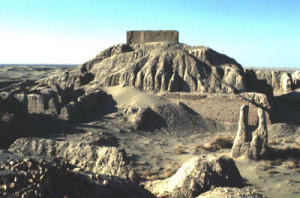 (E-kur in Nippur, Enlil‘s Earth Colony Command Central, missing top of the ziggurat temple residence, top structure was added by American archaeologists in 1900)
(E-kur in Nippur, Enlil‘s Earth Colony Command Central, missing top of the ziggurat temple residence, top structure was added by American archaeologists in 1900)
To Nippur (Enlil‘s city) which is midway between the River Euphrates and the River Tigris
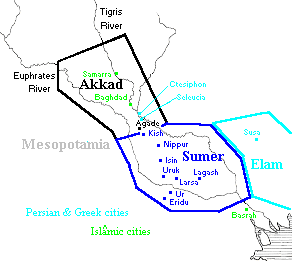
Then they joined together a raft….Enkidu [steered?] ……
And Gilgamesh…….the head of Humbaba….
They washed……”
Unknown Text
TABLET I
“Out I went, into the world, but there was none better, none whom he, Gilgamesh, could not best.
And so, with his arms, he returned to Uruk.
But in their houses, the men of Uruk muttered:
‘Gilgamesh, noisy Gilgamesh! Arrogant Gilgamesh!’
All young men gone – Defeated by Gilgamesh, and no son was left to his father.
All young girls made women by Gilgamesh
His lusts are such, and no virgin left to her lover!
Not the daughter of a warrior,
Nor the wife of a nobleman!
Yet he is king and should be
The people’s careful shepherd.
He is king and should be
Shepherd of the city.
He is wise, he is handsome, he is firm as a rock.
In heaven the gods heard
Heard the lament of the people,
And the gods cried out to the Great God, higher king of Uruk:
‘Strong as a wild bull is this Gilgamesh
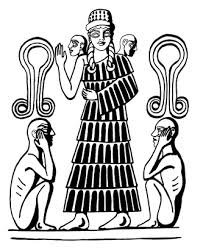 (Ninhursag with her early failed attempts to fashion earthling workers)
(Ninhursag with her early failed attempts to fashion earthling workers)
So he was made by Aruru (Ninhursag), the goddess
None there is who can – not one
None who can survive him in fighting.
No son left to his father.
Gilgamesh, he takes them all, and is he
He the king? Shepherd of the people?
No virgin left to her lover, For he lusts strongly!
No, nor the wife of the nobleman!
The Great God heard this, then
To the Goddess of Creation, Aruru –
Cried all the gods:
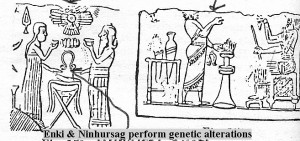 (Ninhursag & twin brother Enki in the DNA Lab)
(Ninhursag & twin brother Enki in the DNA Lab)
‘You created this Gilgamesh! Well, create him his equal!
Let him look as into mirrors – Give a second self to him, yes;
Rushing winds meet rushing winds!
Let them flow heart to heart against –
Give them each other to fight,
Leaving Uruk in peace!’
 (Ninhursag & brother Enki working in their DNA lab)
(Ninhursag & brother Enki working in their DNA lab)
So the Goddess of Creation took and formed in her mind
This image, and there it was conceived –
in her mind, and it was made of material
That composes the Great God,
He of the Firmament.
She then plunged her hands down into water and pinched off a little clay.
She let it drop in the wilderness
Thus the noble Enkidu was made.
For this was he the very strength of Ninurta, the God of War, was his form, rough bodied, long hair,
His hair waved like corn filaments –
Yes, like the hair of that goddess
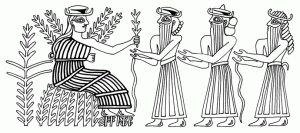
(Goddess of Grains Nisaba, spouse Haia, & 2 unidentified gods)
Who is the corn (crop grown in the America’s only?), she , Nisaba.
Matted hair was all over his body, like the skins of the cattle.
Yes, like the body of that god.
Who is the cattle, he, Samugan (unidentified cattle god).
This Enkidu was innocent of mankind.
He knew not the cultivated land.
Enkidu was in the hills
With the gazelles –
They jostled each other
With all the herds
He too loved the water-hole.
But one day by a water hole
A trapper met him
Yes, face to face,
Because the herds of wild game
Had strayed into his territory.
On three days face to face –
Each day the trapper was terrified,
Frozen stiff with fear.
With his game he went home,
Unable to speak, numb with fright.
The trapper’s face altered, new –
A long journey does that to one,
Gives a new visage upon returning –
The trapper, his heart all awe, told his father:
‘Father, what a man! No other like him!
He comes from the hills, strongest alive!
A star in heaven his strength,
Of the star essence (bloodline descendant) of An, the Sky Father
Over the hills with the beasts
Eating grass
Ranges across all your land,
Goes to the wells.
I fear him, stay far away.
He fills in my pits
Tears up my game traps
Helps the beasts escape;
Now all the game slips away –
Through my fingers.’
His father opened his mouth,
Told the son, the trapper: ‘My son, in Uruk lives Gilgamesh.
None can withstand him,
None has surpassed him,
As a star in heaven his strength
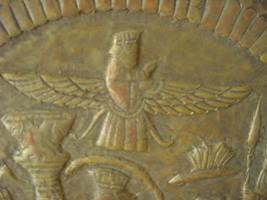 (Anu hovering in his sky-disc)
(Anu hovering in his sky-disc)
Of the star-essence of An, the Sky Father.
Go to Uruk, find Gilgamesh
Praise the wild man’s strength ask for a temple hierodule from the Temple of Love,
Such a child of pleasure;
Bring her and let her power for woman
Subdue this wild man.
When he goes to the wells,
He will embrace the priestess
And the wild beasts will reject him.’
To Uruk the trapper went
And said to Gilgamesh: ‘Like no other, wild,
Roaming in the pastures,
A star in heaven his strength
Of the star-essence of An, the Sky Father.
I am afraid, stay far away; he helps the beasts escape
Fills in my pits
Tears up my game traps.’
Gilgamesh said: ‘Trapper, return,
Take a priestess (Shamhat), child of pleasure –
When he goes to the wells
He will embrace the priestess
And the wild beasts will reject him.’
Then returned with the hierodule
And three days to the drinking hole,
There sat down
Hierodule facing the trapper,
Waiting for the game.
First day, nothing.
Second day, nothing.
Third day, yes.
The herds came to drink, and Enkidu –
 (Enkidu statue artifact, enormous efforts spent recording mixed-breed giant King Gilgamesh‘s epic story)
(Enkidu statue artifact, enormous efforts spent recording mixed-breed giant King Gilgamesh‘s epic story)
Glad for the water were the small wild beasts,
And Enkidu was glad for the water –
He of the gazelles and wild grass,
Born in the hills.
The priestess saw this man
Wild from the hills.
‘There, woman, ‘the trapper,
‘Bare your breasts now;
This is he,
Have no shame, delay not,
Welcome his love,
Let him see you naked,
Let him possess your body.
As he approaches, take off your clothes,
Lie with him, teach him,
The savage, your art of woman,
For as he loves you, then
The wild beasts, his companions,
They will reject him.’
She had no shame for this,
Made herself naked
Welcomed his eagerness
Incited him to love,
Taught the woman’s art.
Six days, seven nights,
That time lying together, Enkidu had forgotten his home
Had forgotten the hills
After that time he was satisfied.
Then he went back to the wild beasts –
 (Enkidu artifact, a fashioned DNA mixed creature creation of Ninhursag)
(Enkidu artifact, a fashioned DNA mixed creature creation of Ninhursag)
But the gazelles saw him and ran,
The wild beasts saw him and ran.
Enkidu would follow, but weak,
His strength gone through woman;
Wisdom was in him,
Thoughts in his hear – a man’s.
So he returned to the priestess.
At her feet he listened intently
‘You have wisdom, Enkidu.
Now you are as a god.
Why the beasts? Why the hills?
Come to Uruk of the strong walls
To Inanna‘s Temple of Love,
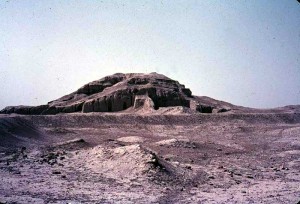 (Uruk, E-anna ziggurat residence of gods, buried city ruins way below)
(Uruk, E-anna ziggurat residence of gods, buried city ruins way below)
And to the Eanna,
Where the Sky God An can be found (residence of giant alien gods).
Gilgamesh is there, strong,
Raging like a wild bull, over all
Is his strength.’
Favourably as he speaks, he hears her words.
He comes to know his own heart
And his desire to find a friend.
He tells her, the priestess: ‘Take me, girl, to the sacred pure
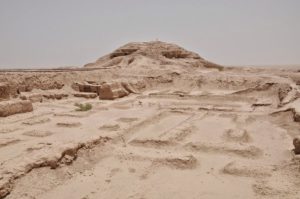 (Uruk below Sky God Anu’s mud-brick-built mountain house)
(Uruk below Sky God Anu’s mud-brick-built mountain house)
Dwelling of Love and Sky God’s house
Where lives Gilgamesh of perfect strength,
He who rages like a bull over all,
And I will summon him forth and challenge him
And I will shout in Uruk: “I am the mightiest!
Yes, I can change the order of what is!
Anyone born on the steppe is mighty and has strength”‘
‘Then let us go that he may see your face
And I will show you Gilgamesh, for I know well where he is.
Come Enkidu, to Uruk of ramparts,
Where all are dressed for festival,
Where each day is a festival,
Where there are boys,
Where there are girls,
Deliciously ripe and perfumed,
Who drive the great ones from their fretted couches
To you, Enkidu, of joy in life I will show Gilgamesh of joy in life
See him, see his face
Radiant is his manhood, of full-bodied vigor
His body ripe with beauty in every part.
So exceeding you in strength,
Needing no sleep by day or by night.
Restrain you folly, Enkidu.
Gilgamesh – Shamash the Sun is proud,
Also An, the God of Firmament,
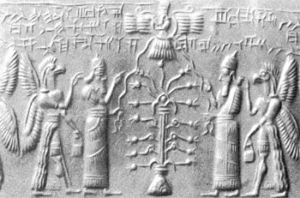 (Apkulla, Enki, King Anu in his winged sky-disc, Enlil, & Apkulla)
(Apkulla, Enki, King Anu in his winged sky-disc, Enlil, & Apkulla)
Also valiant Enlil, his son (& heir to Nibiru throne after King Anu),
And Enki, his (eldest & wisest) son also –
All have given wisdom.
Before you come from the open plains Gilgamesh will have dreamed of it.’
And so Gilgamesh rose from his bed
And to his mother, in revealing dreams, said:
‘Mother, I saw in a dream last night
That there were stars in heaven
And a star descended upon me like unto
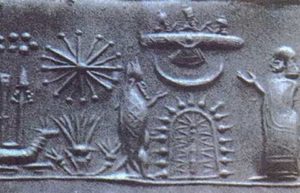 (Sky God An & sons Enki & Enlil in his winged sky-disc, royal king of planet Nibiru)
(Sky God An & sons Enki & Enlil in his winged sky-disc, royal king of planet Nibiru)
The essence of An, the Sky God.
I tried to lift it up, but it was too heavy for me,
I tried to move it, but it would not be moved.
The land of Uruk was around it,
The land was placed round about it.
All the people were pressing towards it.
All the nobles also came round it,
And all my friends kissed its feet.
I was drawn towards it as to a woman
And I laid it at your feet
And you said it was my equal.’
She, the Wise, the Custodian of Knowledge,
Says to her lord –
 (Ninsun, Ninurta‘s daughter, mother to at least 2 of Enki‘s children)
(Ninsun, Ninurta‘s daughter, mother to at least 2 of Enki‘s children)
She, Ninsun, Custodian of Knowledge,
Says to Gilgamesh: ‘Your equal was a star of heaven
Which descended upon you like unto
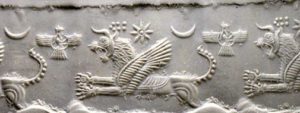 (Anu in his sky-disc, 8-pointed star of heaven)
(Anu in his sky-disc, 8-pointed star of heaven)
The essence of An (Anu) who his the God of the Firmament
You tried to lift it but it would not be moved
And I called it your equal, comparing it to you.
You were drawn to it as to a woman.
The meaning of this
Is of a strong friend who saves his companion
He is the strongest of the land; he has strength.
As a star in heaven his strength,
The strength of An of the Firmament and his host.
So that you are drawn to him overwhelmingly.
And this means he will never forsake you.
Such is your dream.’
Gilgamesh says again to his mother: ‘Mother, another dream
In Uruk of the ramparts lay an axe –
All were gathered around it,
Uruk-land was standing round about it.
The people pressed towards it; I laid it at your feet.
I was drawn to it as to a woman.
For you called it my equal.’
She, the Wise Custodian of Knowledge, says to her son –
‘The axe is a man
You were drawn to it as to a woman
For I called it your equal
And it was to rival you.
This means a strong friend standing by his friend
He is the strongest of the land; he has strength.
The essence of An of the Firmament, is his,
So strong is he.’
Gilgamesh then spoke to his mother
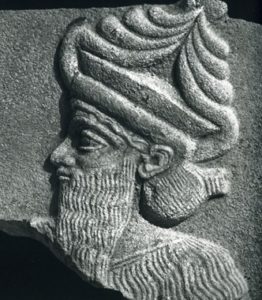 (great god Enlil, Earth Colony Commander of all)
(great god Enlil, Earth Colony Commander of all)
‘Now according to the word of God Enlil
Let a counselor and friend come to me
That I may acquire a companion
And to him I shall be friend and counselor also.’
And as Gilgamesh revealed his dream
The girl was speaking to Enkidu
As they sat together.
TABLET II
For six days and seven nights Enkidu made love to that girl (temple priestess Shamhat)
And the girl said to him
She said to Enkidu: ‘When I look at you, Enkidu,
You seem to be like a god.
Why the wild beasts?
When the roaming over the steppe?
Come with me,
Come to ramparted Uruk.
There the holy temple of Eanna
Where the Great God An lives,
(Uruk city below the E-anna ziggurat, earthling residences of mud brick)
 (Sky God’s mud-brick-built ziggurat in Uruk)
(Sky God’s mud-brick-built ziggurat in Uruk)
Come with me, Enkidu, to the holy dwelling
To the temple, Sky God’s house,
For Gilgamesh of may deeds lives there.
You are so like him.
You will love him as yourself,
Rise up from the earth,
Come to a shepherd’s bed!’
There came upon his heart
The truth of what she said.
He heard her words
And they were good.
She divided her clothing in two,
One garment for him,
One for her
Holding his hand she led him
Led him like a child.
And they came to the hut of the shepherds
Which is in the sheepfold.
All the shepherds gathered round him,
Pressed round him, were drawn to him
Thronged round the wild man.
Of her instruction the priestess is proud,
This is a man who is like Gilgamesh in form,
Taller he is in form,
He was born in the mountains,
And like the star-essence of the Sky Father An, his strength is more powerful.
And Enkidu sat at their table
That he might eat of their produce.
But he knew the milf of wild creatures,
Which he sucked in the wilds.
The shppherds placed their own food before him, and
He choked, he looked,
He stared at it, at them, Enkidu knows nothing of this,
He knows not eating food,
What is this drink? This strong drink?
He has not been taught it.
Bread was set before him – he knows it not.
Beer was set before him – he knows it not.
Enkidu did not eat bread,
He squeezed his eyes together, stared,
The girl then spoke:
She said to Enkidu: ‘Enkidu, eat that food.
It is our de in life.
Drink this strong drink.
It is what is done here.’
So Enkidu ate the food,
Ate until he was full.
He drank that strong drink
Seven cups of it (1).
(A fragment of about 1,400 BCE published by Gernot Wilhelm gives a slightly different account of the preceding:)
The priestess said to him, said to Enkidu: ‘You are exquisite Enkidu!
Why do you run to and fro with the beasts of the steppe?
You are like a god in your nature
Who is there like you among men?’
Again the priestess said to him, said to Enkidu:
‘Come, Enkidu! Let us go to the place of the sheepfold (2)’.
She (Shamhat, temple resident priestess) drew out a single garment
And he clothed himself.
Leading him, she held his hand,
And like a god was his countenance.
She led him to the place of the sheepfold,
The shepherds/people were gathered together,
And the people spoke amongst themselves:
‘Look how he resembles Gilgamesh in his appearance!
He is small in size but extremely strong in his bony frame.
As soon as he was born in the mountains,
He was in the habit of sucking the milk of animals.’
They set bread before him
He examined it and was puzzled by the bread.
They set beer before him.
He creased his eyes together and gazed at it;
He was puzzled by the beer.
The priestess said to him,
Said to Enkidu: ‘Eat the bread, Enkidu,
That you will be worthy of godliness!
Drink the fine beer,
That you will be worthy of kingship!’
Enkidu ate the bread,
He drank the fine beer (3),
And indeed seven jugs of it (4).
(We now return to the main version of the text)
He felt so free, he felt so happy
He rejoiced so in his heart!
His face became radiant.
He rubbed all the shaggy growth,
The hair of his body.
He anointed himself with oil
And thus he became a man.
He donned clothing –
Look! He is like a man!
He takes up his weapon,
He attacks the lions
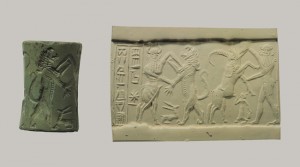 (Enkidu & Gilgamesh story preserved for all time)
(Enkidu & Gilgamesh story preserved for all time)
So the shepherds might have peace at night.
He caught wolves,
He captured lions,
And the chief cattlemen could rest.
Enkidu was their watchman,
A man of strength,
An unparalleled hero!
To the shepherds he said: ‘I am a man now.
I can eat bread at the table, I can drink strong drink.
But I have the strength of he who roams the steppe.
I am stronger than you.
No one is stronger.
You see I catch wolves,
You see I capture lions.
Because of me the shepherds can rest at night,
Because of me the chief cattlemen can lie down.
I am become the king of the sheepfold.’
And Enkidu sat at the table,
He ate the food
He drank the strong drink
He felt good in his heart.
He made merry
Then he looked up
And saw a man
He told the girl:
‘Girl, bring the man.
Why is he here?
I must know his name!’
The girl called the man,
Went to him, said to him
‘Sir, where are you going?
Why have you taken this, your difficult course?’
The man spoke, spoke to Enkidu:
‘Into the people’s special place,,
Their very own meeting-house,
Even into it has he intruded!
Set aside rules and laws for wedlock!
On the city he heaped shame!
Strange practices he has imposed
Upon a city helpless to resist.
For the king of ramparted Uruk
Has altered the unaltered way,
Abused, changed the practices.
Any new bride from the people is his;
Gilgamesh, king of ramparted Uruk,
 (ramparts of the ancient E-ana, secure home of giant aliens away from earthlings)
(ramparts of the ancient E-ana, secure home of giant aliens away from earthlings)
He may mate with any new bride.
Before the lawful husband may have her.
The gods have ordained this
In their wisdom, by their will.
It was so decreed from the moment of birth
When his umbilical cord was cut out.’
At the man’s words
The face of Enkidu paled.
Fury grew within his heart,
His eyes became frightful to look upon
Enkidu spoke his anger,
Said to the man: ‘This cannot continue to be!
I will go to ramparted Uruk.
I will meet Gilgamesh
I will bring his excesses to an end!’
Enkidu set out for Uruk
Enkidu walked in front
The girl walked behind
When he entered ramparted Uruk
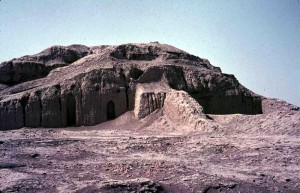 (E-ana, Anu‘s home when visiting Earth Colony)
(E-ana, Anu‘s home when visiting Earth Colony)
The people thronged round him
When he stopped in the street,
In Uruk of the ramparts,
Saying of him:
‘He is like Gilgamesh in form!
He is smaller in size
But stronger in bone.
He is a match for Gilgamesh!
He is the strongest of the steppe, strength is his,
Milk of wild creatures
He once sucked.
There will be endless clash of arms in Uruk!’
The nobles rejoiced: ‘Here is a hero
For all who are honorable!
To match divine Gilgamesh
Here is his equal!’
Now for the Goddess of Love
Is the bed made ready
Of the evening, ready to receive
Gilgamesh for his pleasures.
Now he is coming along
But Enkidu appears in the street
And bars his way
To Gilgamesh is opposed
The might of Enkidu
The divine Gilgamesh is face to face
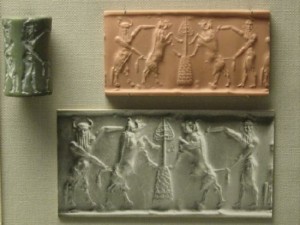 (Enkidu & Gilgamesh kill beasts of Earth)
(Enkidu & Gilgamesh kill beasts of Earth)
With his equal, Enkidu of the steppes.
The king of ramparted Uruk
Sees his equal, who has strength,
Smaller in size, but stronger of bone
Like unto Gilgamesh to the hair.
Gilgamesh sees his shaggy growth –
On the steppe the grass
Sprouts in as much abundance Gilgamesh drew himself up
And stood before him
In the market-place of the land
Was there they met,
And Enkidu blocked the gate
With his foot and
Would not let Gilgamesh enter
 (grappling & wrestling like champions)
(grappling & wrestling like champions)
They grappled their belts and wrestled like champions
Rushing wind meets rushing wind,
Heart to heart against –
Holding fast like bulls.
They shattered absolutely the doorpost of the holy gate
And the wall shook with this fateful act.
The doorway of the house of the family
Where the bride awaited Gilgamesh,
There they struggled.
They fought in the street,
They battled in the market.
But in the end,
Brought Enkidu to the earth,
His own foot still on the ground,
And won the contest.
His anger vanished
He turned away
But when he turned away
Enkidu said to him
Spoke to Gilgamesh:
‘As one single and unique
Your mother bore you
She the wild cow of the steerfolds,
She, Ninsun the Wise, she the Strong
You are raised above all men
You are king of the people by decree
Of Enlil, son (& heir) of the Great God (King) An!’
NOTES ON TABLET II
1. Seven cups or seven jugs (see 1988 fragment) are symbolic, representing the sacred number of the seven initiatory planets, i.e. the Moon (Nanna/Sin), Sun (Utu/Shamash), Venus (Inanna/Ishtar), Mars (Marduk then son Nabu), Earth, Saturn (Ninurta), Mercuri (Ningishzidda) and Jupiter (Enlil).
2. The ‘sheepfold’ was probably a reference to the rites of the Shepherd, or the King of the Land (See Tablet IV, note 1).
3. Eating of the bread and drinking of the superior form of beer constituted probably a ritual of some kind, intended to prepare a candidate to the role of king and priest, a combination that was routine these days.
See note 1.
TABLET III
‘Your strength surpasses my own,
For why do you lord like a wild bull
Over the people of ramparted Uruk?
Are you not the king,
Shepherd of the people?
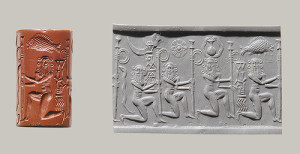 (Gilgamesh scenes, hundreds of Gilgamesh artifacts discovered)
(Gilgamesh scenes, hundreds of Gilgamesh artifacts discovered)
Gilgamesh answered, spoke to Enkidu:
‘No one before opposed my strength
Now I have found a worthy companion.
Together we could go to the Cedar Forest.’
Enkidu puzzled said to Gilgamesh:
‘Why do you wish to do such a thing?
It is a very long journey
To do what you say,
To go down to the Cedar Forest.
I will take a message for you.’
They kissed one another
And formed a friendship.
Gilgamesh spoke to Enkidu, said to him:
‘Oh my friend, I have always wanted
To climb Cedar mountain (1).
 (Humbaba / Huwawa, Enlil‘s creature-creation)
(Humbaba / Huwawa, Enlil‘s creature-creation)
There dwells fierce Humbaba
Who is evil and fearsome to look upon.
I wish to slay him
And banish what is evil from the land.
But he lives in the Cedar Forest
And I know not the way.’
[Here a large portion is lost]
The mother of Gilgamesh, (Ninsun) who knows all,
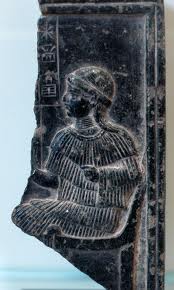 (Ninsun, motheer to gods & semi-divine mixed-breed kings)
(Ninsun, motheer to gods & semi-divine mixed-breed kings)
Raises her hands to Shamash the Sun
[Here ten more lines are lost]
Enkidu‘s eyes brim tears, sick to the heart
Bitter sighs,
Yes, his eyes brim tears
Sick to heart and bitter sighs.
Gilgamesh, understanding, says to Enkidu:
‘My friend, why eyes brimming tears?
Sick to heart? Such bitter sighs?’
Enkidu said to Gilgamesh, told him:
‘My friend, a cry chokes me, constricts my neck veins,
My arms are limp,
My strength gone into weakness’.
Gilgamesh spoke to Enkidu, said to him:
[Here four or five lines are lost.]
‘In the forest terrible Humbaba lives
Let us, you and I, slay him,
And banish all that is evil from the land!’
[Here four lines are lost.]
Enkidu spoke, said to Gilgamesh:
‘My friend, I found it out
When I was ranging forth over the steppe,
Running with the wild beasts,
For ten thousand double-hours the forest stretches,
Extending in every direction.
Who could there possibly be
To go down into this place?
And Humbaba – his roaring is the Great Flood,
His mouth is fire,
His breath is death!
Why do you wish to do such a thing?
We are no match to fight fierce Humbaba!’
Gilgamesh spoke, saying to Enkidu:
‘I will climb the Cedar Mountain!’
[Here seven lines are lost.]
Enkidu spoke to Gilgamesh, said to him:
‘But how can we go to the Cedar Forest (Lebanon)?
Dread Wer is its guardian, who sleeps not at all and is strong.
Humbaba-Wer is his…..
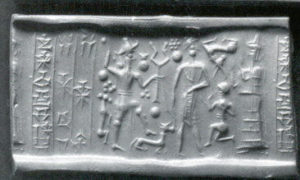 (Adad the God of Storms, Gilgamesh, & Ninsun)
(Adad the God of Storms, Gilgamesh, & Ninsun)
Adad the storm is his voice,
He has the breath of death.
He was appointed guardian of the Cedar Forest
By Enlil, son (& heir) of An, the Great God,
To terrify all mortals.
Humbaba – his roaring is the Great Flood.
His mouth is fire,
His breath is death!
At sixty double-hours he hears
Every wild cow in the forest.
Who can go down into his forest?
Enlil appointed him to be guard,
To watch the cedars, terrify mortals,
Weakness grips one who goes down into the Cedar Forest.’
Gilgamesh spoke to Enkidu, said to him:
‘Who can climb into heaven, my friend?
Immortal under the Sun are the gods alone,
As for mortals their days must end –
What they achieve is but the wind!
Even now you fear death.
Where is your hero’s strength?
I will lead you, then.
You may call to me: Advance, fear not!’
If I fall, I shall have made my name:
“Gilgamesh“, they will say, “against fierce Humbaba
Has fallen!” and long after,
My descendants born in my house
Shall honor my name
As one who struggled against fierce Humbaba
And fell in fighting on Cedar Mountain.
Speaking as you have, you have grieved me.
I will ready my hand,
I will fell the cedar trees,
I will make my name a name that endures!
I will commission the smith
To cast weapons for us.’
And they commissioned the smith;
The artisans sat down to discuss it.
They cast mighty adzes, they cast axes of three talents each –
And a talent contains sixty minas!
They cast mighty swords –
The blades were two talents each,
The knobs on their sheaths thirty minas each,
The handles of the swords
Thirty minas of gold each
Gilgamesh and Enkidu were both laden with ten talents apiece.
[A fragment from Uruk published in 1972 by von Weiher gives a slightly different account:]
They sit and take counsel together with the smiths:
‘We will cast the axe…..
The axe – it shall weigh one talent
Your sword – it shall weigh one talent
Your belt – it shall weigh one talent
Your belt………………………..
[The main account now resumes:]
At the great gate of Uruk
With its seven bolts
Gathered all of the people.
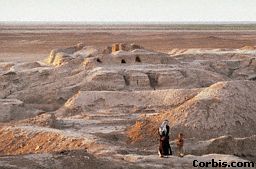 (Uruk prior to much excavation)
(Uruk prior to much excavation)
There in the street and market of ramparted Uruk
Stood mighty Gilgamesh
King of Uruk of the ramparts,
The people all sat down before him.
Gilgamesh spoke to them, saying:
‘O thou people of ramparted Uruk,
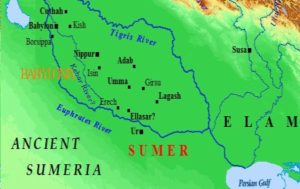 (“land of the gods”, the “Eden”, place between the Rivers Euphrates & Tigris)
(“land of the gods”, the “Eden”, place between the Rivers Euphrates & Tigris)
I am going on a journey to the Forest of Cedars (of Lebanon),
Him of whom they speak,
At whose name all lands tremble, I, Gilgamesh, will see.
I will conquer him in the Cedar Forest!
I will spread abroad among all lands
How strong are the progeny of Uruk!
I will raise my hand and cut down the cedars!
I will make my name a name that endures!’
[The 1972 fragment of von Weiher, just cited, preserves a different version, which highlights the astronomical references more clearly:]
‘The men of Uruk who know………………
There would I be strong, I travel the wheel-rim……
I commence the struggle which I know not, the motion
Blesses me!…… the path……. before
I will enter the city gate of Uruk….
I will turn towards, and the Akitu Festival in……………..
I will celebrate the Akitu Festival in……
The Akitu Festival shall be arranged and joyful singing shall be heard.
One shall ever cry out and cry out again against magnificent garments in….
Enkidu – to the elders he said:
‘What the men of Uruk ……………………….
He spoke to him; he should not enter the forest…..
The wheel-rim should not bejourneyed upon; a man ……………………….
The guardian of the forest………………………..
[This is the end of the fragment In the main text, no speech by Enkidu is recorded at all. A fragment of about 1400 BCE published by Gernot Wilhelm gives a few lines of yet another version of these events. Gilgamesh explains why he wishes to go on the expedition against Humbaba and the elders of Uruk ask him to reconsider:}
‘I wish to set up a name, a name which will endure perpetually in their mouths.
Of my deeds I wish the land to listen!
I wish my name to be a name which endures!
Such a name I wish to establish for myself!
The elders of Uruk replied to Gilgamesh:
‘But Gilgamesh, why do you wish to do this?
The struggle at the abode of Humbaba is not to …..?’
[Here the short fragment breaks off. We return once more to the main text:]
The elders of ramparted Uruk replied to Gilgamesh, said to him:
‘You are very young, Gilgamesh,
Your heart has swept away your reason.
You have no knowledge of what is involved
We are told that Humbaba is strange to see and terrifying.
Who can possibly withstand his weapons?
For ten thousand double-hours in every direction
Extends his great forest.
Who would go down into such a place?
Humbaba – his roaring is the Great Flood.
His mouth is fire,
His breath is death!
Why do you wish to do such a thing?’
No one is a match to struggle with Humbaba.’
When Gilgamesh heard these words of his advisers,
He looked round, smiling to his friend:
‘Now, my friend, thus do they tremble
And fear eaven to speak of fierce Humbaba.
O Enkidu, together we can face him
In his great forest of cedars, and gain renown.
O elders of Uruk, I go with my friend Enkidu,
He of the steppe who has strength.
Together we will face fierce Humbaba.’
The elders answered Gilgamesh and said:
‘May they own god protect thee
May he lead thee back safely along the road
May he bring thee back to the quay of Uruk.’
Gilgamesh then fell down before Shamash the Sun and spoke these words:
‘I go, o Shamash, my hands raised in prayer;
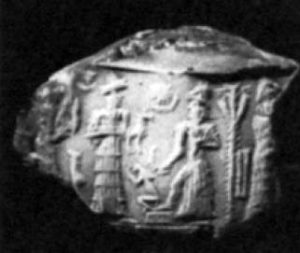 (giant god Nannar & son Utu / Shamash)
(giant god Nannar & son Utu / Shamash)
Bless the future well-being of my soul.
Bring me back safely tot he quay of Uruk, and
Cause thy protection to be established over me.’
Gilgamesh called his friend
And inspected his omen.
[Here seven lines are lost. The omen, which would have been read from the liver, gall bladder and intestines of a sacrificial lamb must have been unfavorable.]
Tears ran down the face of Gilgamesh.
‘I must travel a road I have never traveled,
I must follow a way I know not.
But I know I should fare well,
And I depart with a joyful heart.
May the blessings of the Great Gods be upon me!
They who are on their celestial thrones.’
And then were brought to him his weapons,
Those mighty swords,
Quiver and bow,
All placed in his hands,
He took the adzes,
And, with his quiver,
The bow of Anshan
Into his girdle he put his sword
That they might depart.
The people pressed around Gilgamesh:
‘By the will of God may you return to the city!’
The elders paid homage
And counseled Gilgamesh concerning his journey:
‘Trust not your strength alone!
Be wary and alert, on guard.
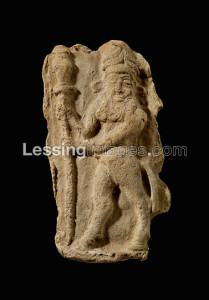 (Enkidu forgotten, recently re-discovered in Mesopotamia)
(Enkidu forgotten, recently re-discovered in Mesopotamia)
Let Enkidu walk before you.
He has seen the way, has traveled the road.
He who leads the way saves his companion,
He who knows the path protects his friend.
Enkidu has seen combat, knows it,
Knows the way to the Cedar Forest.
Over the obstacles and ditches will he carry you.
Let him penetrate and slip through
All the passes of the forest of Humbaba.
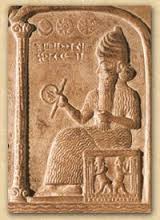 (giant alien god Utu / Shamash, son to Nannar & Ningal)
(giant alien god Utu / Shamash, son to Nannar & Ningal)
May Shamash grant your wish,
May he show you of what you speak.
May he open the unopened path for you,
Unbar the road for your coming,
Unclose for you the foot of the mountain!
May your nights bring you delights,
And may Lugulbanda stand by you,
May he stand by your wish!
May you attain your wish as does a child!
After slaying Humbaba, which you are attempting,
Wash then your feet.
When time to rest at night, dig a well –
May the water of your water-skin be ever pure! –
And offer cool water to Shamash.
And be ever mindful of Lugulbanda (semi-divine father to Gilgamesh)!
Enkidu, we the Assembly
Entrust our king to you.
Do you deliver him back to us!’
Gilgamesh spoke to Enkidu, said to him:
‘Up, my friend, let us go to the Great Palace
To see Ninsun, the Great Queen
Ninsun the Wise, who has knowledge of everything,
Will make wise our feet in their course.’
Gilgamesh and Enkidu, to the Great Palace,
To see Ninsun, the Great Queen.
Gilgamesh stepped forward on entering the palace:
‘O Ninsun, I make bold to depart
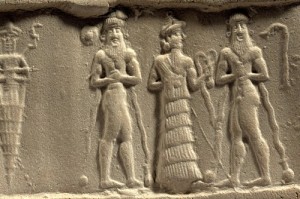
(Ningishzidda, mother Ninsun with her 2 giant mixed-breed sons made into kings)
On a great journey to the place of Humbaba,
I must face battle strange to me,
Travel a road unknown to me.
Until I can return, until I come to the Cedar Forest,
And banish all that is evil from the land,
All that is hateful to Shamash,
Do pray to Shamash on my behalf.’
(Here several lines are lost)
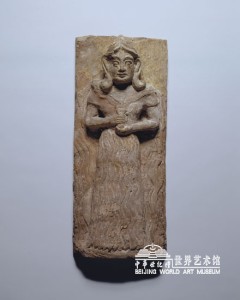 (Ninsun, mother to Anunnaki gods & mixed-breed kings)
(Ninsun, mother to Anunnaki gods & mixed-breed kings)
Ninsun entered her chamber
(Here one line is lost)
She donned a garment suitable to her body
Also an ornament appropriate for her breast
Placed her tiara on her head,
Went out into the grounds,
Climbed the stairs, ascended the parapet
Attained the roof and there did offer up
To Shamash the Sun much incense
With this smoke-offering in progress
She raised her hands to Shamash:
‘Having granted me as my son Gilgamesh,
Why have then have you given my him such a restless heart?
Why have you made him wish to go on a Great Journey to the place of Humbaba?
To face a battle strange to him?
To travel a road unknown to him?
Until the day he can return, until he reaches the Cedar Forest ,
Slays the fierce Humbaba
And banishes from the land all that is evil which you hate,
In the day hours when you shine forth,
May Aya your bride fear you not and keep you mindful
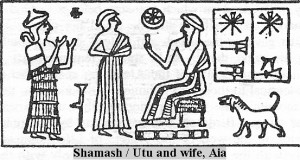 (Moon Crescent God Nannar seated on his throne in Ur)
(Moon Crescent God Nannar seated on his throne in Ur)
And may she also commend him
To those who watch over the hours of the night!
(Here many lines are lost)
She put out incense, chanting a spell.
Then she summoned Enkidu
To impart him this message:
‘Mighty Enkidu, you who came not from my womb,
I have now adopted you,
As have the devotees of Gilgamesh,
The priestess, the votaries, the cult women!’
And around the neck of Enkidu she placed….
(The remainder of this line and several others are completely lost. In all probability Ninsun placed an amulet around Enkidu‘s neck. When the text resumes again, Gilgamesh and Enkidu are with the elders and about to depart.)
‘Let Enkidu protect the friend, safeguard the companion,
Let him carry him through the pitfalls!
We, the Assembly, entrust to you our king:
Do you deliver him back to us!’
Enkidu then spoke to Gilgamesh, said to him:
‘Since you are determined upon the struggle,
Then come away.
Let your heart not be troubled and follow me.
My friend, turn not away from the journey.
A way not known to you
Need hold no fears when I shall lead you.
In the Cedar Forest I know the dwelling place
And also the road which Humbaba travels.’
(Here seven lines are lost)
When the elders had heard this speech of his
They sent the hero on his way
‘Go, Gilgamesh – may Shamash grant your wish,
And may your God be at your side.’
NOTES ON TABLET III
1. Cedar mountain and Cedar Forest are a mixture of the mythical and real. Their geographical location is a subject of hot dispute among scholars; one strong possibility is Lebanon, though not everyone agrees on this.
2. The Akitu Festival was a celebration of the New Year, at the Spring Equinox, and its repeated mention is in keeping with the more overt astronomical terminology of this fragment.
3. (For an explanation of the cosmic wheel and traveling its rim, see the notes to Tablet IX.) The word used here for ‘wheel-rim’, allak, is inevitably mistranslated as ‘road’ or ‘way’ by others because its true meaning has not been understood by previous scholars in its astronomical context of the cosmic wheel of the sky, which, seen from earth, appears to turn.
TABLET IV
(Most of this tablet is mutilated and lost.)
After twenty intervals
They broke off a morsel
After thirty more
Rested for the night
Fifty were the intervals
Which they trod in a day
In three days, one month and fifteen days
Before Utu / Shamash the Sun they dug a well.
(The rest of the column is missing. After a missing portion of the next column, the text recommences.)
After twenty intervals
They broke off a morsel
After thirty more
Rested for the night
Fifty were the intervals
Which they trod in a day
In three days, one month and fifteen days
(Here then lines are missing)
Gilgamesh went up the mountain
Poured out the fine-meal and intoned
‘O Mountain, bring me a dream that is favourable.’
(The rest of the column is missing, as well as the following two columns in their entirety and the beginning of the fifty column. By the time the text resumes in the incomplete fifth column, Gilgamesh and Enkidu have arrived at the doorway or gate of the Cedar Forest. Enkidu is encouraging a hesitant and wavering Gilgamesh.)
‘Remember your words when in Uruk?
Come, rise, that you may slay him!
Are you not Gilgamesh, the progeny of Great Uruk?’
Gilgamesh heard these words from his mouth
And great became his confidence.
Quickly, step up to him, let him not go –
Not go down into the woods and vanish there,
Where he cloaks himself with seven cloaks (2)
One is on him now, six are still off…’
Like unto a lordly bull he rages and is full of…
He the Guardian of the Forest calls out….
Humbaba, like
(The rest of the column is missing, as is the beginning of the next. The text commences again as follows:)
Enkidu spoke to Gilgamesh,
Said to him: ‘Let us not go down into the heart of the forest!
‘… my friend, as weaklings….
….we have traveled, all of them…. ….before us…..
My friend – canny in combat, you are skilled in battle;
Only touch my garment and you will not fear death.
… and remain with me….’
(Here one line is undecipherable)
‘So that the limpness may leave your arm
That the weakness leave your hand…
Stay by me as my friend and let us go.
Together into the depths of the forest
Let not combat destroy your courage.
Forget death and do not…
A man determined to action but thoughtful…
He who leads the way preserves himself
And keeps his companion safe.
Though they may perish
Yet their name will endure.’
And so they both arrived at the green mountain.
They fell silent and stood quite still.
NOTES ON TABLET IV
1. There is little doubt that the traversing of 50 intervals on each of these two days is meant to be significant. Speiser’s version is ’50 leagues’ and Heidel’s ‘fifty double-hours (See Tablet IX, note 13 for a further discussion of ‘double hours’.) Both these translations seem to be justifiable but each contradicts the other, since the first is an interval of space and the second an interval of time. The text also provides us with the information that in their 3 days’ travel Gilgamesh and Enkidu traversed the distance of one month and fifteen days, or three half-months, which is an interval of time measured in space – the distance of a month and a half’s time within three days’ time.
The fact that later, at the end of Tablet XI, we find identically worded descriptions of a journey of twice-fifty intervals made by Gilgamesh back to Uruk from an entirely different location than the Cedar Forest serves to prove the non-specific geographical intent of descriptions in the Epic of journeys, which in reality are meant to have rather a metaphysical significant and probably a cosmographical setting.
2. See Tablet V, note 7.
TABLET V
They stood quite still and looked at the forest,
Saw how high were the great cedars,
And gazed upon the entrance to the forest.
There, where Humbaba was wont to tread,
Was a fine path; straight it was and easy to travel.
They saw also the Cedar Mountain, where lived the gods
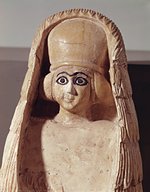 (Inanna, Goddess of Love & War, daughter to Nannar)
(Inanna, Goddess of Love & War, daughter to Nannar)
And Irnini, Goddess of Love, holy Inanna had her throne seat
The cedar raised aloft its great luxuriant growth:
What cool shade, what delight!
Covering the brushwood, covering the….
(Here the text breaks off. It resumes, after an indeterminate lapse, with Gilgamesh speaking to Enkidu:)
‘Rise up, cast your gaze tot he mountain….!
My divine sleep has been torn from me.
My friend, I saw a dream – Oh, how ill-omed!
How….! How disturbing!
I seized a wild bull of the steppe;
He bellowed, he kicked up the earth,
And the duks darkened the sky.
I gave way before him.
He was seizing…. strength, my flank
He tore out the ……………………….
He provided food…………………..he drank
He gave me water to drink from his water-skin.’
[The text continues unbroken without identifying the speakers, but Enkidu is obviously replying to Gilgamesh:]
‘My friend, the god to whom we go is not a wild bull,
Although his form is surpassing strange.
What you saw as a wild bull is really
The radiant Shamash the Sun
He will take us by the hand in our dire need,
He who gave you the water to drink from his water-skin –
He is your special god who brings you honor, Shamash the Sun.
We should therefore join him together
With Lugulbanda, your father, your own god, your familiar,
So that we might do a deed, such deed,
Which, though we die, yet will not be inglorious.’
[There may be a break here, as the order of the fragments is uncertain. But the text continues coherently:]
They took hold one of the other
And went to their nightly rest
Sleep descended upon them –
As it were the great surge of night.
But upon midnight hour a-sudden,
Sleep flew from Gilgamesh.
To Enkidu, his friend, he tells his dream:
‘If you have not waked me, then how do I wake?
Enkidu, my friend, I must have seen a dream!
Have you not waked me? Why ……?
Aside from that first dream,
I now have seen a second dream;
In my dream a great mountain fell,
Pinned me to the ground, trapped my feet beneath it.
A great glare of light overwhelmed me.
A man like any other –
Such a man as we have never seen –
Stepped forth from the light.
His grace and beauty were more,
More than any on this earth.
He freed me from the mountain,
Gave me water to drink,
Quieted my heart.
He put my feet back on the earth.’
Enkidu spoke to Gilgamesh,
Said to him:
‘My friend, let us go down into the plain,
Let us go take counsel together.’
[Several lines are lost here, and we don’t have Enkidu‘s interpretation of the dream. Perhaps the wondrous man is again Shamash, who was seen as a bull, probably because the Epic was written in the Age of Taurus, between 4,000 and 2,000 BCE, when the sun rose at the spring equinox in the sign of the Bull. Shamash is also the root deity of Gilgamesh. After a break, the text resumes as follows, with Gilgamesh again speaking:]
‘A second dream I saw:
We were standing in mountain gorges
And a mountain fell upon us. It was so large that by comparison
We were like small reed flies –
Like the little fly of the cane-brakes we were.’
He who was born on the steppe…
Enkidu said to his friend:
‘My friend, the dream is auspicious, It is a precious dream….
My friend, that mountain which you saw
That mountain is Humbaba.
We shall seize Humbaba, we shall kill him,
And cast his dead body on the plain.
On the morrow…’
After 20 intervals, they broke off a morsel
After 30 more, rested for the night.
Before Shamash the Sun they dug a well….
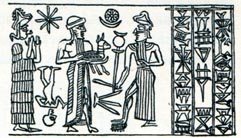 (Ninsun, her giant semi-divine mixed-breed son-king Gilgamesh, & Utu)
(Ninsun, her giant semi-divine mixed-breed son-king Gilgamesh, & Utu)
Gilgamesh went up a mountain
Made offering of his fine-meal and intoned:
‘O Mountain, bring a dream for Enkidu,
Bring for him a dream of mine to interpret!’
And the mountain did bring a dream for Enkidu.
It brought for him….
Cold rain passed overhead….
He had to take shelter….
…. and like unto the wild barley of the mountains…..
Gilgamesh puts his chin to his knees,
Sleep which falls upon mankind
Fell upon Gilgamesh.
He started, full awake, said to his friend:
‘My friend, have you called me?
Why am I awake?
Did you touch me?
Why have I started so?
Did not some god pass by?
Why have I gone numb?
Why are my limbs paralyzed?
My friend, I saw a 3rd dream,
And this dream was terrible in every way.
The heavens were roaring and screaming
The earth was blasted with booming sounds,
And darkness descended like a shroud –
A sudden streak of fire as lightning flashed,
The clouds grew bloated and full
And they rained down death!
Then the fire-glow of the skies died out
And all the fallen of the fire
Of that downpour of death
Crusted over to ashes.
Oh, let us go down into the plain!
There we can take counsel!’
When Enkidu heard this,
Heard the dream his friend offered him,
He said to Gilgamesh interpreting his dream,
Made him come to acceptance of his dream:
[Most unfortunately we do not have any account of Enkidu‘s interpretation of the dream as the text breaks here. When the text resumes, Gilgamesh and Enkidu are no longer conversing about the dream but have arrived at the forest of Humbaba:]
Gilgamesh gripped the axe
And with it felled the cedar.
Humbaba, hearing the sound of this,
Fell into a fury and raged:
‘Who is it who has come –
Come and interfered with my trees?
My trees which have grown on my own mountains?
And has also felled the cedar?’
But just then from heaven came the voice
Of the Great God Shamash the Sun:
‘Have no fear. Approach him and……..
March, as long as………..
He enters not into his house……..’
[Here the text breaks off. Gilgamesh and Enkidu are apparently given instructions by the voice of Shamash on how to approach Humbaba in order to kill him. This would seem to include specific directions and useful information about Humbaba‘s movements. But the heroes do not seem to fare very well even with such helpful hints:]
His tears streamed down from him
And Gilgamesh said to Shamash in heaven:
[Here two lines are mutilated in the tablet and cannot be read:]
‘But I have taken the way of heavenly Shamash,
I have trod the way he said.’
Humbaba said to him, said to Gilgamesh:
‘The fool, the stupid man –
They should take advice, Gilgamesh!
Why do you now approach me?
With that Enkidu, that son of a fish (2)
Who knew not his father,
Companion of the small turtles, of the large turtles,
And who never sucked the milk of his mother?
In your youth I beheld you
Now should I kill you to satisfy my belly?
Shamash brought you, Gilgamesh, and allowed you to reach me.
It is through his assistance that you are stepping along thus.
But, Gilgamesh, I will bite through the palate-pin
Of your throat and your neck.
I will allow the shrieking serpent-bird
The eagle and the raven to eat your flesh!’
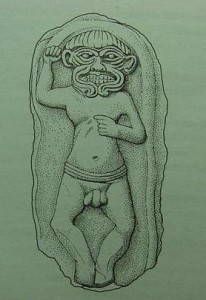 (Humbaba from the Epic of Gilgamesh)
(Humbaba from the Epic of Gilgamesh)
Gilgamesh said to his friend, said to Enkidu:
‘My friend, Humbaba‘s facial features have altered,
And their configuration raises itself to an equal height (3)
But my entrails are gripped by fear that we are too hasty.’
Enkidu said to him, said to Gilgamesh:
‘My friend, why do you wail so miserably
And let your mouth go flabby
And conceal yourself?
For now, my friend,
The axe has been cast for you –
The copper-smith poured its molten metal from the gutter channel,
Annealed it by heating for a double-hour,
Allowed it then to cook for a double-hour,
Producing this weapon of the flood-storm.
Seize the whip –
Travel not on your feet,
Do no turn back!
Strike with the axe and make your blow strong!’
Shamash in heaven heard the prayer of Gilgamesh
And against Humbaba rose up mighty winds:
The Great Wind, the North Wind, the South Wind, the Whirlwind,
The Storm Wind, the Chill Wind the Tempestuous Wind
The Hot Wind – eight were the winds.
They rose up against Humbaba.
Lo! He cannot move forwards!
Lo! He cannot move backwards!
And so Humbaba relented.
Then Humbaba answered Gilgamesh:
‘Oh, do let me go, Gilgamesh! You will be my master,
I will be your servant.
And as for my trees, My trees which I have grown,
I will……………………….
Strong…………………….
I will cut them down and build you houses.’
But Enkidu said to Gilgamesh:
‘Do not listen to him.
Hark not to the word of Humbaba.
Humbaba must not live!’
[An earlier fragment from Uruk published in 1980 by von Weiher gives a variant version of this section, listing 13 winds rather than 8:]
……… they might be turned away,
……… distant are they.
He struck his head and drew himself up against him.
With the heels of their feet they removed the earth;
Mount Hermon and Lebanon and their surrounding districts
Are being destroyed.
Then the white clouds became black,
And it rained the presage of death on them
Like a light rain in a mist.
But Shamash raised up great winds against Humbaba:
The South Wind, the North Wind,
The East Wind, the West Wind,
The Blowing Wind,
The Squally Wind,
The Shaparziqqu Wind,
The Evil Storm,
The Sihurra Wind,
The Wind of Frost,
The Storm,
The Thunder Storm – 13 winds he raised against him
And Humbaba‘s face was darkened.
He cannot push forwards,
He cannot run backwards;
But the weapons of Gilgamesh could now reach Humbaba.
Humbaba now besought his life,
And said to Gilgamesh:
‘Small you were, Gilgamesh –
Your mother bore you,
And you are of the offspring of ……..
Agreeable to the command of Shamash
Of the Lord of the Mountains, you rose up
“But he is the offspring
In the midst of Uruk:
The king – Gilgamesh!”
[Here three lines are missing, except that the mention of the name of Gilgamesh can be made out twice:]
I will sit down with you and………….
Trees, as many as you already have said……
I will defend you! The wood of the myrtle…………….
It is enough………..
Enkidu said to him, said to Gilgamesh:
‘My friend, do not listen
To what Humbaba says.’
[Here some lines are missing. A mutilated fragment published by Gernot Wilhelm in 1988 can be inserted about this point. Humbaba appears to castigate Enkidu for bringing Gilgamesh to him:]
‘…… You have led him before me!
…… splendour.’
[Humbaba then appears to complain either to Gilgamesh or Enkidu that he did not stay at home enjoying simple comforts:]
‘Could you not marry a wife
And satisfy yourself with her voluptuousness?’
[Humbaba then appears to be battered by the various winds:]
But the great winds roared against Humbaba
…. the …. dust-storms flowed
Perpetually on his head.
[Enkidu then seems to plead with Gilgamesh to kill Humbaba:]
‘I beg you to listen to me, my friend!’
….. he struck down once more speedily and
….. to the little child.
[We now return to won Weiher’s 1980 fragment. Humbaba is speaking to Enkidu:]
‘But you know the sign of my forest, the sign……
And you know precisely everything that is said.
I should have lifted you up on high,
I should have killed you upon your entrance
Into the branches of my forest!
I should have let the shrieking serpent-bird,
The eagle and the raven eat your flesh!
But now, o Enkidu,
It lies with you. Make limp your wrath.
Speak to Gilgamesh!
He might spare my life!’
Enkidu said to his friend, said to Gilgamesh:
‘My friend, Humbaba the guardian of the Cedar Forest……
Strike him to maim him.
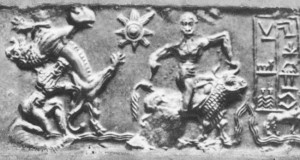 (Gilgamesh & Enkidu kill Humbaba & the Bull of Heaven)
(Gilgamesh & Enkidu kill Humbaba & the Bull of Heaven)
Kill him! Crush him! And quickly,
Humbaba, the guardian of the forest –
Strike him to maim him.
Kill him! Crush him! And quickly.
Before God Enlil, the Foremost hears his cries.
The gods will be filled with wrath against us for our deed.
Enlil in the city of Nippur, Shamash in (Sippar)…..
Put down and…..’
As Gilgamesh came nearer to Humbaba
But Humbaba heard his approach.
And ….. Humbaba……
[Here many lines are lost:]
He heard………………………….
[Here three lines are lost. Humbaba is speaking to Enkidu:}
……….. my forest……………..
But denunciations are caused…..
You sit there like a shepherd………
But as………………….
But now, o Enkidu,
It lies with you. Make limp your wrath.
Speak to Gilgamesh!
He might spare my life!’
Enkidu said to his friend, said to Gilgamesh:
‘My friend, Humbaba, the guardian of the forest……
Kill him and quickly
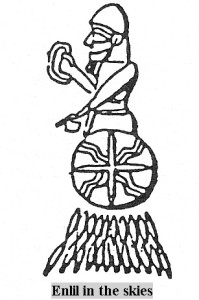 (Enlil scans the skies in his sky-disc, established order, kingship on Earth, cities, communications, etc. etc.)
(Enlil scans the skies in his sky-disc, established order, kingship on Earth, cities, communications, etc. etc.)
Before God Enlil, the Foremost, hears his cries…..
The gods will be filled with wrath against us for our deed.
Enlil in the city of Nippur, Shamash in…..
But Humbaba heard his approach
And……..
[Here many lines are lost. When the text resumes, Gilgamesh and Enkidu seem to be quarreling;]
‘Should not……
Should not erect a higher altar than his friend?
Gilgamesh and Enkidu should never more
Have one another as friends!’
Enkidu said to him, said to Gilgamesh:
‘My friend, I speak to you
But do you not put a stop to my words.’
[The above may not have been a quarrel, but might instead have referred to them never again having each other as friends because one of them might die. Now many lines are lost, including the description of the slaying of Humbaba, which however, survives in other versions. The last portion of the 1980 fragment comes at the end of this tablet.
We now turn to the Sumerian tale Gilgamesh and the Land of the Living, written in Sumerian language long before the Babylonian culture exited, and hence representing the earliest stage in the Gilgamesh literature. In this version the situation is slightly different. Gilgamesh and Enkidu did not go alone on their expedition but were accompanied by 50 strong warriors of Uruk, each of whom carried in his hands a felled tree – which there is some reasons to believe served as oars. These 50 warriors were probably the prototypes of the 50 Greek Argonauts, particularly as the tale of the Argo was current in the time of Homer, since Homer himself referred to it as the ‘fabled’ Argo. It is these 50 anonymous heroes who are referred to below collectively as the sons of the city:]
Gilgamesh prayed:
‘O Shamash, by the life of my mother Ninsun,
who gave birth to me,
And of pure Lugulbanda, my father, truly I have entered this land of the cedar
And here have I known your dwelling place.
My small weak strength truly have
I brought into this land for you as……
…. in your……………..would I enter.’
Then Humbaba himself uprooted for Gilgamesh
The first of his trees.
The sons of the city who had come
Come with Gilgamesh from Uruk
Cut down the tree’s crown, bundled it,
Lay it at the foot of the mountain.
After Humbaba himself had finished off
The seventh tree for him,
Gilgamesh approached his chamber.
He … d the ‘ snake of the wine quay’ in his wall’
Like one pressing a kiss, he slapped his cheek
Like a captured ox, A nose ring was thrown over Humbaba.
Like a captured hero,
A rope was fastened about him.
Humbaba, his teeth shook,
He warded off Gilgamesh:
‘Oh, I would say a word unto
But Enkidu answered Gilgamesh:
‘She the tallest who discriminates not,
She Namtar, awful Fate,
She will devour.
Namtar knows no distinctions.
If the caught bird is let go free,
Flies back to his place;
If the captive man returns,
Returns to the bosom of his mother;
Then will you never return to your city
To that city of your mother who gave birth to you.’
Humbaba says to Enkidu:
‘To him, o Enkidu
You have spoken evil against me!
O mere hireling, who carries the food,
Who stands next to the….. of the rival,
You have spoken evil words to him!’
Humbaba then uttered against them his first terrifying roar.
The 50 companions then moved forward with Gilgamesh;
They cut down the branches, they tied them,
They laid these at the foot of the mountain.
The companions moved forward with Gilgamesh;
They cut down the branches, they tied them,
They laid these at the foot of the mountain.
He uttered against them his third terrifying roar.
The companions moved forward with Gilgamesh;
They cut down the trunk, they cut the side of Humbaba,
He uttered his fourth terrifying roar.
The companions moved forward towards him;
They cut down the trunk, they cut his side
They laid them at the foot of the mountain.
He uttered against them his fifth terrifying roar,
The companions moved forward towards him
They cut his trunk, they cut his side,
They laid these at the foot of the mountain.
He uttered his sixth terrifying roar.
The companions advanced towards him
They cut his trunk, they cut his side.
They laid these at the foot of the mountain.
At the moment when his 7th roar was coming to an end,
He approached the room where he rested.
His figure was formed like a serpent of…… wine
Like someone who gets ready to give a kiss,
He laid the palm of his hand against his cheek
As for Humbaba, his face now became noble.
Like a captured mountain bull on a leash, he approached;
Like a captured sailor, he had tied elbows.
Humbaba, the tears came to his eyes, he grew pale:
‘Gilgamesh, you, you know?
My king? Let me say a word:
A mother, who would have brought me into the world
I did not know one.
A father, who would have raised me –
I did not know one.
The mountain begat me –
You, you will raise me!’
Gilgamesh swore by the sky,
Swore by the earth,
Swore by the Underworld;
He took the …. in his hand,
When he would not want to lose it?
And of Gilgamesh (5th king of Uruk), son of Ninsun,
Now is his heart moved to pity.
To his servant Enkidu, he spoke these words:
‘Enkidu, a caught bird –
Ought he not to return to the arms of his mother?’
Enkidu interrupted him:
‘But you, should you be taken prisoner,
You will not return to the arms of your mother.
Who has ever seen the hands of a prisoner of war unbound?
An imprisoned priest returned to the temple residence?
A lukur-priestess returned to her pleasures?
If you set him free,
He will obstruct the way up the mountain,
He will make the footpath impassable up the mountain.’
Humbaba, who had heard this speech,
Addressed these words to Enkidu:
‘You, Enkidu, you have spoken these words,
Hostile and pernicious.
You, the mercenary, recruited for a pittance,
Who drags himself along after his fellow.
Such are you – that is why
The hostile words come!’
Because he had spoken in this manner,
Enkidu, in an excess of fury,
Cut off his head,
Wrapping it in a shroud.
[Another fragment gives the following version:]
 (Enkidu, Bull of Heaven, & Gilgamesh)
(Enkidu, Bull of Heaven, & Gilgamesh)
When he had spoken thus,
They cut off his neck
They placed upon him….
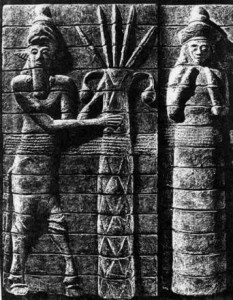 (giant alien gods Enlil & Ninlil, Earth Colony Commander & his equal spouse)
(giant alien gods Enlil & Ninlil, Earth Colony Commander & his equal spouse)
They brought him before God Enlil and Goddess Ninlil
Enlil brought forth from the sea his palace servant
And Ninlil brought forth from…. her….
When Enlil and Ninlil…..
‘Why thus……?
Let him come forth, let him seize…..’
[We now return to where we broke off a moment ago]
In front of Enlil they entered,
In front of Enlil, having kissed the earth,
They threw down the shroud,
They took out the head
And they rested it in front of Enlil.
Enlil, at the sight of Humbaba,
Grew angry at the words of Gilgamesh and said:
‘Why do you act in this way?
May your faces be seared by fire!
May the food you eat be eaten by fire!
May the water you drink be drunk by fire!’
[There is a gap here, during which Enlil presents Gilgamesh with the seven melammus or roars of Humbaba:] (7)
At the end of their conversation,
After his servant had prepared a sweet….
Enlil said:
‘Place him down before you,
Make him eat the bread that you eat,
Make him drink the drink that you drink.
After Enlil had taken away Humbaba,
He retained his exalted terrifying roar;
He attached the first roar to a large river;
He attached the second roar to…………….
He attached the third roar to ….. which carried….
He attached the fourth roar to a lion
He attached the fifth roar to barbarity,
He attached the sixth roar to a mountain
He attached the seventh roar to the goddess Nungal (8).
To the king, who subdued and conquered the terrifying roar,
To Gilgamesh the wild bull.
Who plunders the mountain.
Who goes from there to the sea –
Glory to him!
And from valiant Enkidu -glory to Enki!
God Enki, that your glory be sweet!
[The Sumerian text breaks off here. The text which follows is from a recently discovered fragment of a later period and also uses the imagery of the caught bird. As the reader will already have noted, the reference in the Sumerian material to the cutting down of the trees as a gesture of appeasement by Humbaba to Gilgamesh continues a theme in the fragment of a later period which came just before the Sumerian inset.
We now return to the Epic of the later period, which offers another version of the death of Humbaba:]
Gilgamesh said to Enkidu:
‘We will arrive in…………………,
In the confusion the melammus will vanish –
The melammus, the furies, the radiant beams,
The ordained haloes of the power, these –
They will vanish.
The melammus will vanish and then
The brilliance will become all clouded.’
Enkidu said to Gilgamesh:
‘My friend, first catch the bird.
Then, where will the young birds fly?
Therefore let us see later those Melammus.
For, like young birds, they will only run about the grass!
First kill Humbaba, then kill his servants!’
Gilgamesh heeded the words of his friend.
With his hand he took the axe,
Drew the sword from his belt.
Gilgamesh struck the neck of Humbaba,
Enkidu, his friend, struck Humbaba twice also.
At the third blow Humbaba fell.
Confusion….. dumbfounded,
He struck the watchman, Humbaba, to the ground.
For two leagues the cedars resounded.
Enkidu killed with him
Forest…. cedars
At whose word Mount Hermon -Saria (9)
And all the Lebanon trembled.
All the mountains became…….
All the hills became…….
He slew the ……cedars,
Those destroyed…. after he killed the seven,
The net…. the sword which weighed eight talents,
The netam of eight talents,
Bearing these he pressed on into the forest.
He opened up the secret dwelling of
The 50 Great Gods, the Anunnaki,
They who are seated on their thrones.
While Gilgamesh cut down the trees,
Enkidu dug up the urmazili
Enkidu said to Gilgamesh:
‘………Gilgamesh, felled are the cedars.’
[The 1980 fragment of von Weiher provides a bit more of the text here:]
……. the blow of their rottenness,
Gilgamesh felled the trees,
Enkidu searched everywhere towards…..
Enkidu said to him
Said to Gilgamesh:
‘My friend up to now the high-grown cedar’s tip would have penetrated to heaven
I make from it a door whose height will be six dozen yards
Whose width will be two dozen yards.
One yard will be its thickness. Its door-pole
Its lower door-hinge and its upper door-hinge
Each one will be one….
To the city of Nippur (Enlil‘s patron city) one might bring it,
To Nippur which is midway between the River Euphrates and the River Tigris
Then they joined together a raft….
Enkidu [steered?] ……
And Gilgamesh…….the head of Humbaba….
They washed……
TABLET VI
The dirt of his travels, Gilgamesh washed from his hair,
A beauteous sheen he put to his weapons,
Polishing them.
Down along his back it fell,
The shining clean hair of his head.
All the soiled garments, he cast them off.
Clean, new clothes he put on.
About him now, wrapped,
Clinging to him, a cloak with its fringe,
His sparkling sash was fastened onto him,
His tiara on his head.
But when Inanna had seen this,
When She, the Goddess of Love and War, had seen this
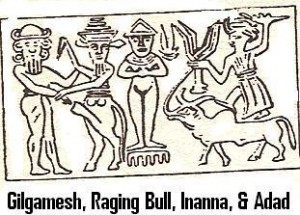 (Epic of Gilgamesh artifact)
(Epic of Gilgamesh artifact)
She raised an eye indeed to the beauty of Gilgamesh:
‘O Gilgamesh, will you not be my lover?
Give me that fruit the tree of man yields to woman.
I will give you myself as wife: you shall be my husband!
For you I will give a chariot made of lapis-lazuli
Yes, too, and of gold!
Its horns – they shall be of brilliant brass.
Storm demons I will hitch to it for your mules!
There shall be a great fragrance of cedar
On the occasions when you enter our house
Its very threshold, the very dais itself –
As your feet touch them
Your feet shall be kissed by them!
And all the kings and the lords
And the princes – all of them –
These shall be humbled before you.
I will make all the yield of the hills,
All the yield of the plains
Be brought to you as tribute.
All your goats shall bear twins
All your sheep shall bear twins.
The ass shall better the mule for burdens,
While your chariot horses will be famed
For their speed in racing.
(Here three lines are mutilated and cannot be read)
‘But what advantage would it be to me to take you in marriage?
In the cold season you would surely fail me!
Like a pan full of burning coals which go out
You are but a back door which does not stay shut
But flies open in the raging wind.
You are the great palace which collapses on its honored guests
The head-dress that unravels,
The pitch that blacken the hands of the bearer,
The water-skin that rubs the back raw as it is carried,
The limestone which undermines the rampart
A siege engine thrown up against the walls of the enemy,
The shoe that pinches the foot of its owner
What lover did you love for ever?
Which of your shepherds is there
Who has satisfied you for long?
Come, I will tell you the tales of your lovers:
For Tammuz (Dumuzi), your young husband,
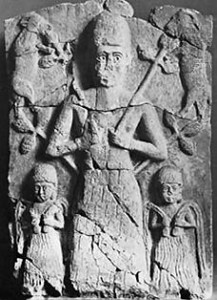 (Dumuzi “The Shepherd”, alien son to Enki & Ninsun, taught Abel to tend the sheep for the gods)
(Dumuzi “The Shepherd”, alien son to Enki & Ninsun, taught Abel to tend the sheep for the gods)
For him we wail year after year!
He who dies each autumn and comes back each spring!
The spotted shepherd-bird you loved,
That bird which rolls and tumbles in its flight,
And you struck him, broke his wing.
And now he stands in the groves and calls:
“Kappi!” – that bird’s hoarse cry,
Which is to say, “My wing!”
Then you loved the lion, perfect in its strength,
But you dug for him seven pits and again seven.
Then you loved the stallion, great in battle,
but you made for him the whip and thong and the spur.
And you decreed that he run seven-double hours,
And that it is for him to make muddy and then to drink.
For his mother, Silili, you decreed lamentation!
You also loved the shepherd with his herd,
He piled ash cakes high for you without cease,
And on this burning charcoal daily
offered you his young and succulent kids
But you struck him
And turned him into a wolf
So that now his own herd boys drive him off
And his own dogs bite at his thighs.
Then you loved Ishullanu, the palm-gardener of your father
Who brought you baskets of dates everyday
You raised your eyes and looked at him
And you went and said to him:
“O my Ishullanu, let me taste of your vigor!
Put forth that which you have,
Into my own, O Ishullanu!”
But Ishullanu said to you:
“What are you asking of me?
Has not my mother baked, have I not eaten,
That I should partake of food with such strong odor, with such foul stench?
He brightened your table every day.
You raised your eyes and looked at him, and as he was not willing to be yours,
You struck him and turned him into a mole.
If you loved me, would you treat me the same as them?
Can mere reeds protect one from the frost, as the saying is?”
When you had heard these his words,
You struck him and turned him into a mole.
You placed him in the middle of…
He cannot ascend the…. he cannot go down….
And if you loved me,
You would treat me the same as them.’
When Inanna heard this –
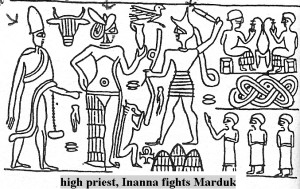 (Inanna, naked Goddess of Love, armed Goddess of War)
(Inanna, naked Goddess of Love, armed Goddess of War)
She, the Goddess of Love and Battle heard this –
She was infuriated.
She went to heaven immediately
And saw her father An, the Sky God
Before him she wept,
And before her mother (great-grandmother),
Antum (Antu?, Anu’s sister-spouse) she wept.
And she said:
‘Father, Gilgamesh has insulted me!
He enumerated all my evil deeds!
He has said I am foul odor and I am evil!’
An spoke, said to the glorious Inanna:
‘Are you the father?
You have quarreled with Gilgamesh the King.
And so he told you your evil deeds,
The odor of them.’
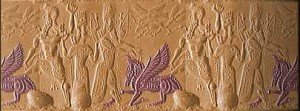
(Inanna Anu Bull of Heaven Gilgamesh)
Inanna spoke to her father (great-grandfather) An:
‘Father, please give me the Bull of Heaven
So that he can smite King Gilgamesh even in his own home.
And if you don’t give me the Bull of Heaven
I will go down to the Underworld and smash its doors!
I will place those above below!
The doors will be left wide open and the dead will get out,
Eat all the food,
And the dead will then outnumber the living!
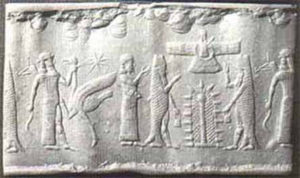 (Sky God An / Anu in his sky-disc above)
(Sky God An / Anu in his sky-disc above)
An spoke
Said to glorious Inanna:
‘If you desire from the Bull of Heaven,
There will be seven years
Of barren husks in the land of Uruk.
Have you gathered enough grain for the people?
Have you grown enough fodder for the beasts?’
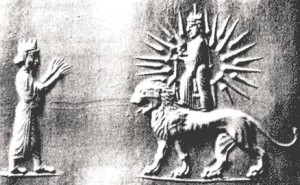 (Anu & Inanna atop her zodiac symbol Leo the Lion)
(Anu & Inanna atop her zodiac symbol Leo the Lion)
Inanna spoke, said to her father An:
‘I have stored enough grain for the people
I have provided enough fodder for the animals
If there should be seven years of no crops
I have gathered grain for the people
I have grown fodder for the beasts.’
(Here three lines are lost)
When An heard this speech of Inanna
He gave her the tether of the Bull of Heaven,
So that Inanna might lead it to Uruk.
When she came to the gates of Uruk
(Here one line is missing)
He went down to the river… seven…. the river
With the snort of the Bull of Heaven, pits were opened
And a hundred men of Uruk fell into them.
With his second snort, pits were opened
And two hundred young men of Uruk fell into them
With his third snort, pits were opened
And Enkidu fell in one of them
Enkidu leapt out of it and seized the bull by the horns
The Bull of Heaven retreated before him
And brushed him with the hairy tip of its tail,
As it spewed foam from its mouth.
Enkidu spoke, said to Gilgamesh:
‘My friend, we boasted….’
(Here eight lines are lost)
And between the nape of his neck and the horns of his head…
(Here one line is lost)
Enkidu chased him and …. the Bull of Heaven
 (Gilgamesh & Enkidu battle beasts)
(Gilgamesh & Enkidu battle beasts)
He seized him by the thick hairy tip of his tail.
(Here three lines are mutilated)
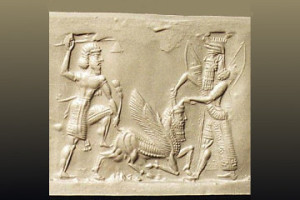 (Gilgamesh & Utu with the Bull of Heaven)
(Gilgamesh & Utu with the Bull of Heaven)
He thrust his sword between the nape of his neck
And the horns of his head
When they had killed the Bull, they tore out his heart
And placed it before Shamash the Sun
They stepped back and fell down before Shamash in homage.
Then the two brothers sat down.
Then Inanna mounted up upon the wall of the city
There at ramparted Uruk and
Springing on to the battlements she uttered a curse:
‘Woe be unto you, Gilgamesh, who has insulted me
By slaying the Bull of Heaven!’
When Enkidu heard the curse of Inanna,
He tore loose the right thigh of the Bull of Heaven,
Flung it skywards up into her face:
‘If I could reach you,
I would do the same to you as to him!
I would hang his entrails at your side!’
Then Inanna called the votaries of the temple
The sacred harlots and courtesans of the temple
And with them she set up a wailing lamentation
Over the right thigh of the Bull of Heaven.
(There is no break here, but it is as well to explain that the ancient Egyptian constellation of the Thigh, which was in fact a bull’s thigh was the ancient equivalent to our Plow or Great Bear or Big Dipper – all these three being the same). (2)
But Gilgamesh called the armourers and craftsmen
The artisans admired the thickness of the bull’s horns
Each horn is thirty minas of lapis-lazuli;
Two fingers thick is the coating of each
Six gur measures of oil would measure their capacity,
Would be what they would contain, this being 1,500 quarts.
And just this much ointment did he then present
To his own special god, (semi-divine) Lugulbanda the Pure.
As for the horns, he brought them
Into his princely bedchamber and hung them there.
They washed their hands in the Euphrates,
They embraced one another as they went on,
Riding through the main streets of Uruk.
There heroes are all gathered round to see them,
Gilgamesh to the sacred lyre-maids of Uruk,
Says these words:
‘ Who is the most splendid among the heroes?
Who is the most glorious among men?’
Who has strength and courage no one can match?
‘Gilgamesh is the most splendid among heroes!
Gilgamesh is the most glorious among men!’ (3)
In his palace, Gilgamesh holds a great feast.
Down the heroes lie on their night couches,
Enkidu also lies down, and sees a dream,
Enkidu rises up to reveal his dream,
Saying to his friend:
‘My friend, why are the Great Gods in council?’
NOTES ON TABLET VI
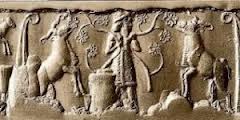 (Dumuzi the Shepherd)
(Dumuzi the Shepherd)
Tammuz, known earlier to the Sumerians as Dumuzi, was the shepherd-king who was the patron deity of Kullab, a Sumerian riverside city that was later absorbed by Gilgamesh‘s city of Uruk, though the texts are careful to specify that Gilgamesh himself was from Kullab within Uruk. Tammuz married Ishtar (Inanna), the Goddess of Love and War, whom he often offended. He was carried down to the Underworld but pleaded with his brother-in-law Utu/Shamash the Sun to save him. He seems to have been granted a reprieve for half of each year and thus to have been a prototype for Persephone and other figures of later mythology who came to represent the return of spring after the death of winter. The earlier references in the Epic to sacred sheepfolds and shepherds are connected with the cult of Tammuz.
TABLET VII
‘….. then twilight came.’
And Enkidu answered Gilgamesh:
‘My friend, hear a dream I had last night
An, the Sky God,
Enlil, his son,
Enki, son (½ brother) of Enlil (Anu‘s eldest son),
And Shamash the Sun,
All held council together,
 (hundreds of Gilgamesh artifacts discovered in Sumer)
(hundreds of Gilgamesh artifacts discovered in Sumer)
And An said to Enlil:
‘Because they have slain the Bull of Heaven
And have slain Humbaba,
He who watched over the mountains,
Watched them from Cedar Tree – one among of them
Must die!’ – So said An.
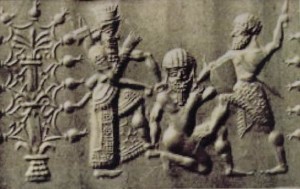 (Enlil has Enkidu executed, his word is final)
(Enlil has Enkidu executed, his word is final)
But Great Enlil said:
‘Enkidu must die!
Gilgamesh, however, shall not die!’
Then heavenly Shamash the Sun answered great Enlil:
‘Was it not at your very own command
That these necessities took place –
The slaying of the Bull of Heaven and Humbaba?
And now you say,
Innocent Enkidu should die?’
But at this Enlil became enraged.
He turned in anger to heavenly Shamash:
‘Just because you used to go down to them
Everyday as if you yourself were his comrade!’
Enkidu lay down before Gilgamesh, very ill.
Gilgamesh, his tears running down, said to him:
‘ My brother, my dear brother!
They wish to let me go but to take you as the price for this!’
Also he said:
‘Must I sit down by the spirit of the dead,
By the door of the spirit of the dead?
And never again to see my dear brother with my eyes?
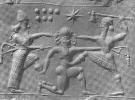 (payback for the killing of Humbaba & Bull of Heaven)
(payback for the killing of Humbaba & Bull of Heaven)
[Here there is a considerable break. As can be seen from what follows, Enkidu curses the fates and the stages that have led him to leave the wild steppe and coming to a civilized life. We can assume that in the lost portion he gave further vent to his frustration and dejection and that Gilgamesh too made complaint against Enkidu‘s unfortunate fate and the decision of the gods that Enkidu must die and be taken from him]
Enkidu…. lifted up his eyes, spoke as if to the door,
As though the door were human:
‘O door! Door to the forest! Insensible thing!
Possessed of no understanding!
From a distance of 20 intervals
I thought your timber fine!
Then I beheld the lofty cedar!
Nowhere in the land is there
Any semblance, any compare with your wood!
Six dozen are the cubits to your height,
Two dozen are the cubits to your width…
Your pole, your pole ferrule and your pole=knob….
Truly a craftsman of Nippur made you….(2)
But, o door, had I known that this beauty of yours
Would bring to pass such disaster,
I would have taken the axe and would have….
I would have made a reed frame to [encompass?] you (3)
[Here several lines are lost. When Enkidu‘s speech resumes, he makes clear that he constructed the door himself, evidently from the felled cedar tree he so admired. A recurring theme of Sumerian and Babylonian literature is the felling of a sacred tree and making some special or sacred object from it.]
‘O door, I made you, set you in place
…………………………………………you
When I am gone, may a king……..you
Or perhaps a god……. you.
He may place his name on you, eradicating mine.’
He ripped out…. he tore down.
As Gilgamesh listened, hurriedly his….
As Gilgamesh heard his friend Enkidu speak thus, his tears were flowing.
Gilgamesh opened his mouth, said to Enkidu: ‘……..illustrious
Strange things may be spoken by the wise.
Why does your heart say such strange things, my friend?
Precious was your dream, but the terror is great.
Your limbs are paralyzed like …….
But despite the terror, precious is the dream:
Misery was released for the healthy;
Woe befell the healthy from this dream.
…. and I will pray to the Great Gods.’
[Here eleven lines are missing.]
With daybreak Enkidu looked up,
Tears streaming from him to radiant Shamash the Sun:
‘I pray, o Shamash, that the hunter, that rogue,
He who hunted not
Who stopped my getting as much game as my friend –
Let him not get as much game as his friend.
Take what he owns, lessen his power.
May his way offend you.
May all the game escape from him.
May his heart be never full.’
And he bitterly cursed the priestess:
‘O you, priestess, I pronounce your fate –
A fate which shall be yours for all eternity!
Hearken, for I curse you now with a great curse
And may my curses attack you on the instant:
You shall not build a house in which to offer your charms.
You shall never enter the tavern where the young girls are.
Your lovely breasts….
May the drunkard defile your trysting place with vomit,
May you be violated by all the troops.
……. shall cast into your house.
Your home shall be the road….
The dust of the crossroads is where you shall dwell.
The desert shall be your bed.
The shadow of the wall is where you shall linger,
Your feet torn by thorns and brambles.
And men crazed by lust panting for drink shall strike your cheeks!
Because you have…… me
And because you have brought death upon me’
When these words were heard by Shamash the Sun,
Straight away he called down from heaven to Enkidu:
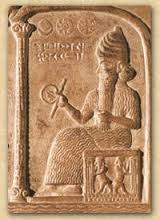 (Utu on his throne in Sippar, his patron city)
(Utu on his throne in Sippar, his patron city)
‘ Enkidu, why do you curse the priestess
Who introduced you to food fit for the gods,
To drink fit for kings?
She who clothed you nobly!
She who gave you Gilgamesh as friend,
And now Gilgamesh is a brother to you.
Has he not placed you on a beauteous couch?
You are on the throne of ease,
The throne at his left hand
So that the rulers of the earth kiss your feet!
Lamentations and weepings from the people of Uruk
shall he cause for you;
Those with hearts full of joy he shall make mourn
When you have turned back.
He will let his body become long-haired,
He will clothe himself with the skin of the dog,
And he will roam the steppe.’
These words of Shamash quieted Enkidu, calmed his angry heart.
[Here two lines are missing. Enkidu retracts his cursing of the priestess and blesses her instead]
‘O you priestess, I pronounce your fate –
The mouth has cursed you
It turns and blesses you.
Lords and governors shall love you
He who is one league away shall smite his thigh in admiration of you
He who is two leagues away shall shake his hair in desire of you
May all the young men will loosen their clothes for you
May you be laden with carnelian, lapis lazuli and gold.
And he who defiled you – may he be paid back!
May his home be stripped,
His full storehouse emptied.
May the priest lead you into the presence of the gods.
And for you the wife be abandoned,
Though she be the mother of seven.’
Enkidu, cast down in sorrow,
Drifts into a sad and lonely sleep.
Then in the night to his friend
He pours out the heaviness of his heart:
‘My friend, this night I dreamed.
The whole cosmos was roaring
And an echo resounded from the earth:
This is an omen of death,
As I was standing there between the heavens and earth,
I saw a young man whose face was dark.
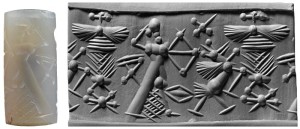 (Ninurta battles Anzu, alien winged sky-discs above)
(Ninurta battles Anzu, alien winged sky-discs above)
His face was like Zu (Anzu), bird god from the Underworld.
…. with claws like an eagle’s talons.
He overcame me….
….. he climbs….
….. submerged me.
[Here seven lines are missing]
He transformed me into a double of his body
So that my arms were now clad in feathers like those of a bird.
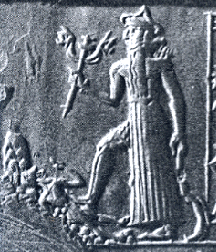 (Nergal, god of the Under World, scientist on South Pole, etc.)
(Nergal, god of the Under World, scientist on South Pole, etc.)
Fixing his gaze on me, he led me to the House of Darkness
There where Irkalla (Nergal) lives, He, the God of the Dead.
No one who enters that house comes forth again.
It is the one-way road from which there is no return;
Those residing there are bereft of the light for ever,
Where dust is their food and mud their sustenance.
They are dressed as birds, with garments of wing feathers.
They see no light but crouch in darkness,
There in the House of Dust, into which I came,
I saw kings, their crowns set aside –
Those who had once ruled on earth through the ages, humbled,
No longer were they born to the crown.
And the twins of An and Enlil were there (6),
Serving the roast meat,
The fried and baked food,
Pouring cold water out from the skins.
In the house of Dust where I came
Sit the high priest and the acolyte,
Sit the cantor and the shaman,
Sit the attendants of the sacred ablutions,
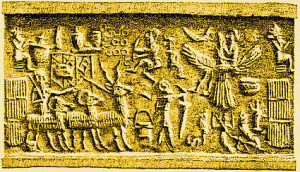 (Kish King Etana taken to meet Anu in Heaven / planet Nibiru)
(Kish King Etana taken to meet Anu in Heaven / planet Nibiru)
There sat Kish, once king of Kish,
There sat Sumugan, he, the god of the Cattle,
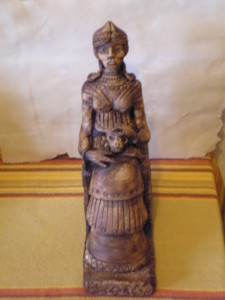 (Ereshkigal, Nergal‘s spouse)
(Ereshkigal, Nergal‘s spouse)
And also Ereshkigal, who is the Queen of the Underworld.
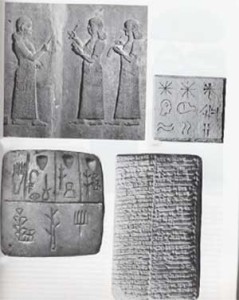 (alien Anunnaki giant goddesses as the 1st scribes)
(alien Anunnaki giant goddesses as the 1st scribes)
Belit-Seri (Geshtinanna), her scribe, kneels before here.
And she reads out from a tablet to her.
She, the scribe, lifts her head, sees me and says:
‘Who brought this one?’
[Here 50 lines are missing. But the following fragment where Gilgamesh is speaking is believed to come from the lost remainder of this tablet]
‘Remember all my travels with him!
My friend saw a dream of unfavorable omen
The day the dream was ended.
Enkidu lay stricken one day, two days,
Enkidu‘s suffering on his bed worsened:
A third day, a fourth day…
A 5th day, a 6th day, a 7th,
An 8th, a 9th and a tenth day.
Enkidu‘s suffering on his bed increases;
An 11th day, a 12th day…
Enkidu lay stricken on his bed of agony.
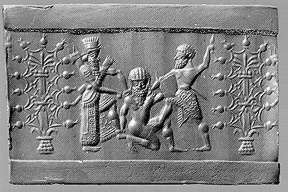 (Enlil has Enkidu executed for his deeds)
(Enlil has Enkidu executed for his deeds)
Finally he called Gilgamesh and spoke to him:
‘My friend…….. has cursed me!
Not like one who falls in battle shall I die,
For I feared the battle….
My friend, one who dies in battle is blessed.
But as for me…’
TABLET VIII
On the horizon there appeared
The first intimations of dawn (1)
And Gilgamesh said to his friend:
‘Enkidu, your mother, the gazelle,
Your father, the wild ass –
These together produced you.
They whose mark is their tails reared you (2)
As did the cattle of the steppes and of all pastures,
May the tracks of Enkidu in the Cedar Forest
Weep for you!
May they not be hushed
By night or by day
Uruk of the wide ramparts – may its elders
Weep for you!
May the finger which blesses what is behind us
Weep for you!
May the country echo with sorrow like a mother!
May… weep for you!
In whose midst we….
May the bear, the hyena, the panther,
May the tiger, the stag, the leopard, the lion,
May the ox, the deer, the ibex –
May all the wild of the steppe
Weep for you!
May the River Ulla – may it weep for you!
The river by whose banks
We strolled together – friends
May the pure Euphrates, where we drew water for the skins
May it weep for you!
May the warriors of Uruk of the wide ramparts
Weep for you!
…we slew the Bull of Heaven –
May…. weep for you!
Those in Eridu who sang your paeans –
May they weep now!
May all those who have praised you –
May they weep!
All those who provided you with grain –
May they weep for you!
(Here there is a considerable break, during which Enkidu finally dies. The text resumes with Gilgamesh lamenting his friend’s death:)
‘Hear me O elders!
It is for Enkidu, for Enkidu, my friend, that I weep.
I wail like a woman
So bitterly lamenting
The goodly axe in which my hand trusted
Hanging by my side
The dagger resting in my belt.
The shield which went before me.
My richest-trimmed robe for the festivities –
An evil force arose
Seized them all from me!
Oh, my friend, younger than myself,
You hunted the wild ass in the hills,
You chased the panther on the steppe!
Oh, Enkidu, my younger friend,
How you hunted the wild ass in the hills
Chased the panther on the steppe!
We two have conquered all, climbed all
 (Enkidu & Gilgamesh battle the Bull of Heaven)
(Enkidu & Gilgamesh battle the Bull of Heaven)
We were the ones who seized and killed the Bull of Heaven
We were the ones who laid hold of Humbaba
He who lived in the Cedar Forest
What is this sleep that has now come over you?
You have gone dark and cannot hear me!’
But Enkidu did not raise his head
Gilgamesh felt for Enkidu‘s heartbeat, but there was none.
Then he drew a veil across Enkidu‘s face,
As if he were a bride.
He roared like a lioness who had her cubs taken away from her.
Backwards and forwards he went before his friend,
And tore his hair
Strewing it around
He tore off his beautiful clothes
Flung them down
As though they were filth.
And then on the horizon there appeared
The first intimations of dawn
Then Gilgamesh proclaimed unto the land
‘Come smith, come workman,
Come fashioner of copper,
Come worker in gold,
Come inscriber in metal!
Shape you the image of my friend!
My friend whose stature is beyond compare;
May his breast be lapis lazuli
May his body be of gold.
(From a strange document called the Letter of Gilgamesh which in many respects is fantastic and unreliable, a few more possible details of the statue may possibly be gleaned as they were known in the tradition:)
 (Enkidu carved into stone for long lasting remembrance)
(Enkidu carved into stone for long lasting remembrance)
‘Let there be many large…. of red ochre
And lapis lazuli set in solid gold,
And let them be bound on the breast of my friend Enkidu
One block of solid gold – let its weight be 30 minas
I will fix on the breast of Enkidu, my friend.
Let there be many gaz-stones, much jasper, lapis-lazuli,
All the stones that there are in the high mountains.
Let them be sent on horses to the home-country.
May beautiful amulets be made out of them.
Fresh fruit out of season,
Anything precious and exotic
Which my eyes have never seen
For an offering let them be loaded with the silver and gold,
Let them drift down the River Euphrates
Carry them to the quay of Babylon
and my eyes shall see them and my heart shall be confident.’
(The above is what can be reconstructed of the text as it may have been before it became the object of a silly schoolboy exercise in which it was severely distorted, in the so-called ‘Letter’. Mow many lines of the Epic are lost. After the break, Gilgamesh is again speaking)
‘I placed you on a beauteous couch.
You were in the throne of ease,
The throne at my left hand,
So that the rulers of the earth kissed your feet!
Lamentations and weepings from the people of Uruk
Shall I now cause for you;
Those with hearts full of joy shall I make mourn.
And after you have been laid to rest
I shall let my body become shaggy,
I will clothe myself in the skin of a dog
And I shall roam the steppe!’
On the horizon there appeared
The first intimations of dawn
Gilgamesh loosened his band…..
(Here many lines are lost, with only a few fragmentary matches mentioning ‘to my friend’, ‘your sword’, ‘likeness’, and ‘to the place of Mercury’ (5). The following brief passage has been preserved:)
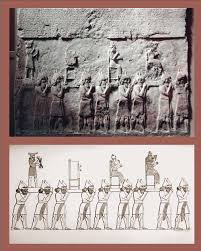 (Anunnaki royal giant descendant of Anu in parade)
(Anunnaki royal giant descendant of Anu in parade)
…Jude (?) of the Fifty Great Gods, the Anunnaki…
When Gilgamesh heard this
He conceived in his heart the concept, or image of the river
On the horizon there appeared
The first intimations of dawn
Gilgamesh fashioned….
Brought out a large table of elammaqu wood,
Took a carnelian bowl,
Filled it with honey
Took a lapis-lazuli bow
Filled it with milk curd
… he adorned and exposed to Shamash the Sun
(The rest of the Tablet, a very large portion, is lost. In the missing sections, the funeral and burial of Enkidu evidently took place.)
TABLET IX
Gilgamesh roams the steppe
And weeps bitter tears
For Enkidu, his friend
‘Shall I not die like Enkidu?
Woe gnaws at my entrails,
I fear death.
So I roam the steppe.
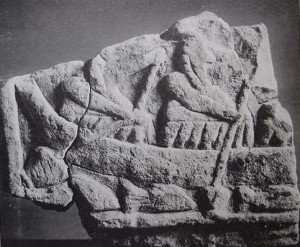 (Noah‘s Ark)
(Noah‘s Ark)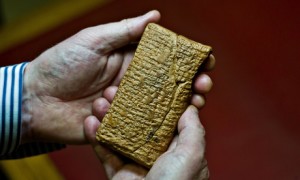 (construction tablet of Ark)
(construction tablet of Ark)
I must go to see Ziusudra (Noah)
The Survivor of the Flood
He, the son of Ubara-Tutu.
Immediately shall I travel the wheel-rim (1) to him.
At night I come tot he Gates of the Mountains.
Gripped by fear, I saw lions.
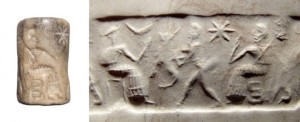 (Nannar, mixed-breed king with dinner, & Ningal)
(Nannar, mixed-breed king with dinner, & Ningal)
I lifted my head to the Moon God (Nannar),
Offered prayers.
My prayers went out to the …. of the gods:
‘O God of the Moon, do you preserve me!’
He laid himself down and then awoke from a dream.
There in the dream he had seen [lodestones]
Rejoicing in life they were
In his hand he raised an axe,
He drew his dagger from his belt,
He descended upon them like an arrow.
He struck at them,
Smashed them into pieces.
(Here many lines are lost, with only a few scattered words surviving. Six lines along, a line commences with the female pronoun she; the identity of the female personage in this missing section cannot even be guessed at, but she probably appeared in another dream and could have been Siduri [see next tablet], thereby repeating the pattern of premonitory dreaming.)
The mountain is called Mashu
And so he arrived at Mashu Mountain
Which keeps watch every day
Over the rising and setting of the Sun God,
Whose tips reach the zenith of heaven
And whose rim reaches the depths of the Un
Scorpion-Men guard the commencement of its motion.
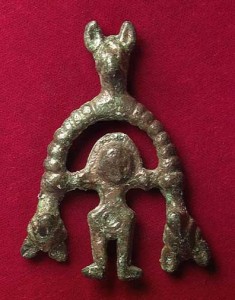 (scorpion man artifact from ancient tale of Gilgamesh)
(scorpion man artifact from ancient tale of Gilgamesh)
Awful their terror, their glance is death
The splendour of their scintillation disturbs the mountains
Which keep watch over the rising and the setting of the Sun God
When Gilgamesh observed them,
His visage was darkened with terror, with fear.
Regaining his composure
He approaches them.
The Scorpion-Man called to his wife:
‘Look who comes
His body is made of flesh of the gods.’
The Scorpion-Man’s wife replied:
‘He is 2/3 god, 1/3 man‘.
The Scorpion-Man calls out,
Cries to the offspring of the gods:
‘Why have you come this far a journey?
What brings you here before me?
You have made a traverse of the celestial Sea –
Its crossings are difficult
I wish to learn
The meaning of your coming.’
(The next line appears to be an inquiry about ‘your way’ or ‘your road’, or the road taken by Gilgamesh. When the text resumes, Gilgamesh is replying to the Scorpion-Man and mentioning Ziusudra, the Babylonian/Sumerian Noah:)
‘I have come in search of life,
To see Ziusudra, my forefather –
He who survived the Flood
And joined the Assembly of the Gods
I wish to ask him about life and death.’
The Scorpion-Man opened his mouth to speak, said to Gilgamesh:
‘There never was a mortal, Gilgamesh,
Never one who could do that.
No one has traveled the mountain’s path.
For twelve double-hours its bowels….
Dense is the darkness and there is no light.
To the rising of the Sun…….
To the setting of the Sun…..
To the setting of the Sun…..’
(Many lines are missing here. The Scorpion-Man is believed in the missing portion to have described the journey double-hour by double-hour [see note 13]. When the text resumes, Gilgamesh is speaking:)
‘Whether it be in sorrow,
Whether it be in pain,
In cold, in heat,
In sighing, in weeping,
I will go!
Let the gate of the mountain now be opened!’
The Scorpion-Man opened his mouth to speak,
Said to Gilgamesh:
‘Go, then, Gilgamesh, go you forth.
May you cross the mountains of Mashu,
May you traverse the mountains and ranges.
May you go in safety.
The gate of the mountain is now open to you!’
When Gilgamesh heard this,
When he heard the words of the Scorpion-Man,
He traveled from the east to west
Along the road of the Sun.
When he had gone one double-hour
Dense was the darkness and there was no light.
This permitted him no sight of its front or his rear
When he had gone two double hours
Dense was the darkness and there was no light.
This permitted him no sight of its front or his rear.
When he had gone three double-hours
Dense was the darkness and there was no light.
This permitted him no sight of its front or his rear
When he had gone four double hours
Dense was the darkness and there was no light.
This permitted him no sight of its front or his rear.
When he had gone five double-hours
Dense was the darkness and there was no light.
This permitted him no sight of its front or his rear
When he had gone six double hours
Dense was the darkness and there was no light.
This permitted him no sight of its front or his rear.
When he had gone seven double-hours
Dense was the darkness and there was no light.
This permitted him no sight of its front or his rear
When he had gone eight double hours, he cried out.
Dense was the darkness and there was no light.
This permitted him no sight of its front or his rear.
When he had gone nine double-hours, he felt the morning breeze.
It was fanning his face
Dense was the darkness and there was no light.
This permitted him no sight of its front or his rear
When he had gone ten double hours
He knows the moment of rising is near.
He is impatient for the end of the double hours.
When he had gone eleven double hours
He rose just before the Sun
When he had gone twelve double
Day had grown bright (13)
Upon seeing the bejeweled shrubs, he approaches them
The carnelian bears its fruit
And hung it is with goodly vines,
The lapis lazuli bears leaves
Lush fruit also hangs from it
It is fine to the eye.
(The remaining fifty lines of this tablet are mutilated or lost. From the fragmentary words surviving we can see that the description of the garden of jewels continued, for at least six different stones and minerals are mentioned, but they are merely stray words in an otherwise obliterated text.)
TABLET X
(The first line is broken off the tablet. Gilgamesh is being addressed by an unidentified character)
Eating the flesh of wild things, dressed in their skins
O Gilgamesh, this is a thing which has not happened
No, not so long as my wind shall drive the waters.’
Distressed at heart, Shamash the Sun
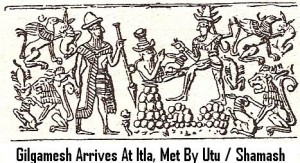
Went to Gilgamesh and said to him:
‘Whence you are directing yourself, Gilgamesh?
You shall not find the life you seek.’
But to valiant Shamash
Gilgamesh speaks:
‘After traveling, after roaming the steppe,
Shall I merely lay my head
Down into the earth’s guts?
And then sleep –
Sleep forever?
No! Let me see the Sun!
See the Sun and be sated with light!
If there is light enough,
Then the darkness shrinks away
May the light of Shamash the Sun
Be seen even by he who is dead!’
(Many lines are lost here. Four different versions of the remainder of this tablet are known (Old Babylonian, Assyrian, Hittite and Hurrian). They are not identical, although all describe the meeting of Gilgamesh and Siduri. Siduri has a bar or tavern at the confluence of the celestial rivers which lead to the Underworld. The location in the sky is believed to be beneath the foot, or the Star Rigel, of the constellation of Orion(Ashur); there is a road which souls were said to take. Siduri seems to offer drinks as a comfort to souls denied the drink of immortality. Priests and shamans ritually drank these on earth. Hence, here is a tavern for souls, to refresh them on their way. She is Siduri the Refresher. The next section of the Epic comes from the Assyrian version:)
the last Siduri the Refresher, who dwells by the celestial Sea’s edge,
Who sits there enthroned at the confluence of the rivers,
For her they have made a jug,
For her they have made a golden vat
In which to make the mash for the beverage
She is covered with a veil and Gilgamesh comes up to her and…
He is clad in skins of dogs,
The flesh of the gods is in his body
But in his entrails there is woe
His face is that of one who has come from afar
The Refresher gazes into the distance
And says to herself,
Within her heart takes counsel:
‘Surely this one will do murder!
Where can he be directing himself…?’
And as she saw him,
She, the Refresher, locked the door
Barred the gate
Secured the bolt.
But Gilgamesh heard her.
Held up his pointed staff and placed it against the door
Gilgamesh says to her
Says to the Refresher:
‘Refresher, what have you see
That leads you to….
Lock your door,
Bar your gate
Secure the bolt?
I will smash the door
Shatter the gate!’ (2)
(Here several lines are lost. When the text resumes in the Old Babylonian Version, Siduri has taken off her veil come out and shown herself to Gilgamesh, now speaking to her)
‘He who endured many hardships with me
Whom I so dearly loved – Enkidu;
Yes, he who endured my hardships with me!
He now has gone to the fate that awaits mankind!
Day and night I have wept for him
I would not give him over for burial
For what if he had risen at my beseeching?
Six days and seven nights I waited
Until a worm fell out of his nose
Since he has gone
There is no life left for me.
I have roamed the steppe like a hunter
But oh, Refresher, now that I have seen your face,
Let me not see Death,
Which I so dread!’
The Refresher said to him, said to Gilgamesh:
‘Gilgamesh, whence do you direct yourself?
You shall not find the life you seek,
For at the creation of mankind
The gods allotted Death to men.
They retained life in their own hands.
Gilgamesh, let your belly be full,
Make you merry by day and by night.
Make everyday a day of feasting and of rejoicing
Dance and play, by day, by night,
Let your clothes be sparkling and fresh
Wash your hair
Bathe your body
Attend to the babe who holds you by the hand
Take your wife and let her rejoice in you.
For this is the lot of mankind to enjoy
But immortal life is not for men.’
(Here several lines are lost)
Gilgamesh said to her, said to Siduri:
‘O Refresher, what did you say thus to me?
My heart is stricken for Enkidu, my friend.
O Refresher, you dwell here on the shore of the Sea.
You can see into its furthest reaches, all that is therein.
Show me the way to cross it.
If it may be allowed I would cross the Sea.’
The Refresher said to him, said to Gilgamesh:
‘Gilgamesh, there has never been anyone
Who had done this thing
The way across the sea
Who has taken it?’
[Here many lines are lost in the Old Babylonian version and shortly we shall return to the much later Assyrian version for the continuation. But here we insert the material excavated by archeologists in Armenia in the Elamite language which was written in the form of a theatrical script. Inevitable liberties have had to be taken in trying to put this into readable or coherent English. It is not only possible but highly likely that parts of what follows are misleading or incorrect. The Elamite language is so poorly understood that no absolutely reliable translation of this material is yet possible, and the Elamite scholars admit to much guesswork. In order to present the material in any remotely coherent way, some explanatory matter has been interpolated directly into the text, such as the words indicating the significance of ten figs – something familiar to the audiences at the time, but wholly strange to us.]
Gilgamesh speaks
O Siduri, you who are cupbearer of the gods,
You who pour out for them to drink of immortality,
You who provide life eternal for the sake of the gods –
They who sit on their thrones before you
To you I make my plea.
Behold, I am a stranger
And I come to beseech your help.
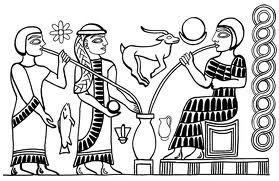 (Ninkasi, Enki‘s daughter, Goddess of Beer, drinking through straws avoiding thick mash)
(Ninkasi, Enki‘s daughter, Goddess of Beer, drinking through straws avoiding thick mash)
Chorus:
O let the desire be revealed!
The ten figs of marriage,
The figs to be held by the bride –
The juice of the figs is squeezed
By the bride in the marriage ceremony.
Oh, he bestows the ten figs of marriage
The desire is made known.
Siduri the Cupbearer speaks:
It is for woman to bear
But for you to engender.
Gilgamesh speaks:
Were the seven melammus,
The seven cloaks of power.
Taken were they at my rising at the sunrise –
They that were the life of Gilgamesh
Chorus:
The Plant of Birth
The Plant by which Woman bears –
You have that Plant
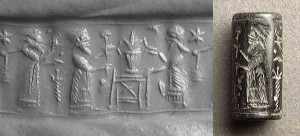
(Noah’s spouse Noah Plant of Life Gilgamesh)
For a son let it be received
O sacrifices!
Food of the sacrifice!
Great are the sacrifices before us!
Let the man receive it!
O Woman, here is the man.
We beseech for him your help
Gilgamesh speaks:
O sacrifices!
Great are the sacrifices before us!
See the sacrifices before us!
The ten figs of marriage!
Chorus:
For the sake of the Goddesses
They are requested
O let the desire be revealed
Let it be told to you!
Gilgamesh speaks:
For the sake of the gods
Do I speak the request.
O let the desire be revealed
Let it be told to you!
Chorus:
The Plant of Birth,
The Plant by which Woman bears –
Which you have, O Woman! –
See, we are here!
Gilgamesh speaks:
I gave a gift
I brought a blessing
Chorus: O sacrifices!
Great are the sacrifices before us!
The ten figs of marriage!
Let the desire be revealed
To you are the sacrifices ordered
The gifts are now in your keeping,
Five are the cows we have given;
They have been offered
That the desire may be revealed
Gilgamesh speaks: I have received your speech
That you give your help
Chorus: O sacrifices!
Great are the sacrifices before us!
See the sacrifices before us!
The ten figs of marriage!
For the sake of the goddesses
May the Plant be given!
Gilgamesh speaks:
I utter the tradition!
Chorus: O sacrifices!
Great are the sacrifices before us!
May the desire appear!
The ten figs of marriage!
Before the gods the desire appears!
From you may it come,
May he take it from you!
May he receive Life,
May Life become his
At the moment he receives it.
To you are the sacrifices ordered.
O sacrifices! Great are the sacrifices before us!
See the sacrifices before us!
The ten figs of marriage!
Those melammus which the gods took away
Were given to you.
Gilgamesh speaks: For the sake of the Goddesses……
[Here the 1st fragment breaks off. The second fragment resumes after an indeterminate interval with two female names unknown from any other ancient sources:]
Piraddarak und Shutijas are dead….
Chorus: With you the Plant I made to….
………Shutijas.
………………….
………………….
The ten figs of marriage!
…..was seen and also
…..was engendered and also
Zigi, brother of Benunu
…..was told a lie and also
Chorus:
….the brother……
He can receive the desire!
[After this strange interlude taken from an extremely archaic version of the Epic, we return to the far more modern Assyrian version, where Gilgamesh is protesting his heroic valor to Siduri.]
Gilgamesh says to her, says to the Refresher:
‘I slew the watchman of the forest,
He, Humbaba – he of the Cedar Forest.
In the mountain passes I slew lions.’
Siduri said to him, said to Gilgamesh:
‘If you are Gilgamesh, who slew the watchman,
Who slew Humbaba – he of the Cedar Forest –
And slew lions in the mountain passes,
Seized and killed the bull that comes down from heaven –
Then why are your cheeks wasted?
Why is your face sunken,
Why is your heart so sad,
Why are your features worn,
Why in your entrails is there woe,
Why is your face that of one who has come from afar?
Why is your countenance seared by heat and by cold?
And why do you roam over the steppe
Like one pursuing a mere puff of wind?’
Gilgamesh says to her, says to Siduri:
‘O Refresher, why should my cheeks not be wasted?
My face sunken, my heart sad, my features worn?
Why not in my entrails be woe?
And my face – why should it not be that of one
who has come from afar?
As for my countenance –
Why should it not be seared by heat and cold?
And as for my roaming over the steppe
As if for a mere puff of wind, why not?
My friend, younger than myself,
He hunted the wild ass in the hills,
He chased the panther on the steppe,
Enkidu, my friend, younger than myself,
Who hunted the wild ass in the hills,
Who chased the panther on the steppe,
We two who conquered all, climbed all,
We who seized and killed the Bull of Heaven,
We who laid hold of Humbaba,
My friend whom I loved so dearly,
Who endured all hardships with me,
He now has gone to the fate that awaits mankind!
Six days and seven nights I wept over for him
Until a worm fell out his nose.
Fearing death I roam over the steppe
The fate for my friend lies heavy upon me.
On distant ways I roam the steppe.
The fate of Enkidu, my friend, lies heavy upon me,
How can I be silent? How be still?
My friend whom I loved has turned to clay!
And I, shall too, like him, lie down
Never to rise –
Never again –
Fore ever and ever?’
Gilgamesh says to her, says to the Refresher:
‘O Gilgamesh, there has never
Never been a crossing.\None who came since the beginning of days
None could cross
Only valiant Shamash the Sun makes the crossing of the Sea.
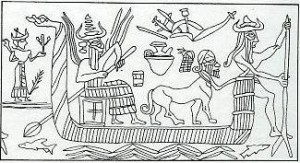 (Ninlil on shore, Enlil, & Nusku going down river)
(Ninlil on shore, Enlil, & Nusku going down river)
(alien gods were 1st to construct boats for travel, shipping goods, etc.)
Who other than Shamash the Sun can cross it?
Difficult is the place of crossing,
Difficult the way to it.
In between are the Waters of Death
Which bar the approaches!
Where would you cross the Sea, Gilgamesh?
And when you arrived at the Waters of Death, what would you do?
Ziusudra‘s boatman is there, Gilgamesh.
His name is Urshanabi.
With him are the lodestones.
In the forest he picks urnu-snakes.
Let your face behold him.
If if be possible, make the crossing with him.
If it not be possible, retrace your steps.’
When Gilgamesh heard this,
In his hand he raised his axe
He drew his dagger from his belt,
He slipped into the forest,
And went down to them.
He descended upon them like an arrow.
In the forest….
When Urshanabi saw the flash of the dagger,
And heard the axe….
He struck his head……. Gilgamesh
Seized the wings….. the breast,
The lodestones…… and the boat.
[After these fragmentary lines, many are missing entirely. By the time the text resumes, Urshanabi and Gilgamesh have met and are in discussion.]
Urshanabi said to him, said to Gilgamesh:
‘Why are your cheeks wasted?
Why is your face sunken,
Why is your heart so sad,
Why are your features worn,
Why in your entrails is there woe,
Why is your face that of one who has come from afar?
Why is your countenance seared by heat and by cold?
And why do you roam over the steppe
Like one pursuing a mere puff of wind?’
Gilgamesh said to him, said to Urshanabi:
‘O Urshanabi, why should my cheeks not be wasted?
My face sunken, my heart sad, my features worn?
Why not in my entrails be woe?
And my face – why should it not be that of one who has come from afar?
As for my countenance –
Why should it not be seared by heat and cold?
And as for my roaming over the steppe
As if for a mere puff of wind, why not?
My friend, younger than myself,
He hunted the wild ass in the hills,
He chased the panther on the steppe,
Enkidu, my friend, younger than myself,
Who hunted the wild ass in the hills,
Who chased the panther on the steppe,
We two who conquered all, climbed all,
We who seized and killed the Bull of Heaven,
We who laid hold of Humbaba,
My friend whom I loved so dearly,
Who endured all hardships with me,
He now has gone to the fate that awaits mankind!
Six days and seven nights I wept over for him
Until a worm fell out his nose.
Fearing death, I roam over the steppe,
The fate of my friend lies heavy upon me.
On distant ways I roam the steppe.
The fate of Enkidu, my friend, lies heavy upon me.
How can I be silent?
How be still?
My friend whom I loved has turned to clay!
And I, shall too, like him, lie down,
Never to rise –
Never again –
Gilgamesh also says to him, says to Urshanabi:
‘Now, Urshanabi, which is the way to Ziusudra,
He who survived the Flood?
What is the special sign?
Give me, o, give me its special sign!
If it be possible,
I will make a crossing of the Sea.
If it not be possible,
I will roam the steppe!’
Urshanabi said to him, said to Gilgamesh:
‘Gilgamesh, you have hindered the crossing –
With your hands you have done this!
You have smashed the lodestones.
O Gilgamesh the lodestones bear me along,
Help me avoid touching the Waters of Death.
In your anger you did smash them,
The lodestones which I kept to help me get across!
You have also picked the urnu-snakes.
The lodestones are smashed
And there are no urnus….
Gilgamesh take the axe in your hand,
Cut three hundred punting-poles (7) which are smooth.
……. the lashes like a spear.
……..in the ship…..’
[The above incorporated an Old Babylonian fragment relatively recently discovered, which ends here. The main Assyrian version now continues, but the number of the poles is different. Instead of 300, Gilgamesh is only asked to cut 120.] (8)
‘You have smashed the lodestones,
You have picked the urnu-snakes.
The lodestones are smashed.
The urnu is not in the forest.
Gilgamesh, in your hand raise your axe,
Go down into the forest, cut twice-sixty punting-poles,
Each of sixty-cubits.
Put the knobs of bitumen on one end of each
Attach ferrules to their other ends,
Then bring them to me!’
When Gilgamesh heard this,
In his hand he raised his axe,
He drew his dagger from his belt,
He went down into the forest,
He cut twice-sixty punting poles, each of sixty cubits.
He put the knobs of bitumen on them,
He attached the ferrules,
And he brought them to Urshanabi.
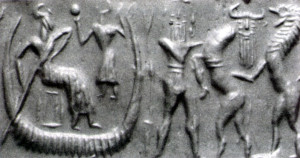 (Mesopotamian artifact of the boatman & Gilgamesh)
(Mesopotamian artifact of the boatman & Gilgamesh)
Gilgamesh and Urshanabi then boarded the boat.
They launched the boat on the waves
And they sailed away.
By the 3rd day they had gone as far
As a normal voyage of a month and 15 days.
And thus Urshanabi arrived
At the Waters of Death.
Urshanabi said to him, said to Gilgamesh:
‘Press on, Gilgamesh, take a punting-pole.
But let not your hand touch the Waters of Death!
Take a 2nd, 3rd, a 4th pole, Gilgamesh,
Take a 5th, a 6th, a 7th pole, Gilgamesh,
Take an 8th, a 9th, a 10th pole, Gilgamesh,
Take an 11th, a 12 pole, Gilgamesh!’
At twice sixty, Gilgamesh had used up the poles.
Then he ungirdled his loins…Gilgamesh pulled off his cloth….
With his hand he hand it aloft as a sail.
Ziusudra peers into the distance.
Speaking to his heart,
He says these words, takes counsel with himself:
‘Why have the lodestones of the boat been broken?
When does one who is not her master ride in her?
The man who comes here is not of my men
And….
I peer, but I cannot see…
I peer, but I cannot see…I peer, but
{Many lines are missing at this point. Gilgamesh disembarks and meets Ziusudra. Fragmentary words here and there, however, make it clear that most of what is lost is mere repetition of the set questions and replies between them which Gilgamesh has already exchanged with both Siduri and Urshanabi. The text conveniently resumes as this exchange ends:]
Gilgamesh further said to him, said to Ziusudra:
‘I behold you now, o Ziusudra,
You whom they call the Faraway.
And that I might do this
I have been a wanderer
Over all the lands,
Have crossed many difficult mountains,
Crossed all the seas!
With waking I have been wearied.
My joints ache, are filled with woe.
My garments were worn out
Before I even came to Siduri the Refresher’s house
I have killed bear, hyena, lion, panther,
Tiger, stag, ibex
All the wild of the steppe
And all the creeping things of the steppe
I ate their flesh
I wrapped myself in their skins,
… let them bar her gate,
With pitch and bitumen….
(Here two lines are lost)
Ziusudra said to him, said to Gilgamesh:
‘O Gilgamesh, why so full of woe?
Who was created in the flesh of god
In the flesh of man….?
When your father and your mother
Made you, who……?
When was there for Gilgamesh
In his feebleness….
Established any seat in the Assembly of the Gods
That you….
Or ….. be given to him….
Like butter?…
Tahhu-flour…
And kakkushu-flour,
Which like….
….swift like….
And he like nibihu-garment
Since there is no….
There is no word of advice
…. before him Gilgamesh
…. their lord…..’
(Here thirty-three lines are lost. The text resumes with Ziusudra‘s wise remarks to Gilgamesh on the impossibility of permanence in this world:)
‘Mankind, which like a reed stands fragile
A fine young man, a fine young woman….
These too must die.
Should no one see death?
Should no one meet then this end?’
(Here two lines are missing)
‘Do we build a house to stand forever?
Are contracts sealed forever?
Do brothers divide their inheritance to last forever?
Does hatred remain in the heart forever?
Does the stream which has risen in spate
Bring torrents forever?
The dragonfly emerges and flies
But its face in the Sun for but a day
Is this forever?
From the days of yore there has been no permanence.
The sleeping and the dead – how alike they are!
Do the sleeping not compose a very picture of death?
The common man, the noble man,
Once they have reached the end of life,
Are all gathered in as one,
By the Anunnaki, the Great Gods,
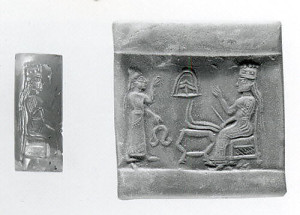 (unidentified assistant & Ninhursag in the Lab)
(unidentified assistant & Ninhursag in the Lab)
And she, Mammetum (Ninhursag),
She of Fate –
She decrees the destinies.
Together they determine death
Determine life
As for life, its days are revealed,
But as for death
Its day is never revealed.’
TABLET XI
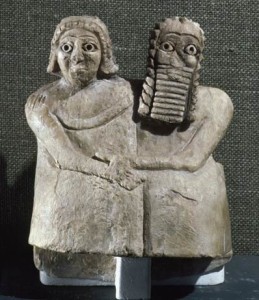 (Noah / Ziusudra & his spouse given eternal life)
(Noah / Ziusudra & his spouse given eternal life)
Gilgamesh said to him / Said to Ziusudra the Faraway:
‘I look upon you now, Ziusudra, but your appearance is not strange.
You are like myself. I had imagined you as a great warrior.
But you lie on your side, reclining at ease.
Tell me, how did you enter the Assembly of the Gods –
how find everlasting life?’
Ziusudra said to him, said to Gilgamesh:
‘O Gilgamesh, I will disclose unto you a hidden thing.
Yes, a secret of the gods will I tell unto you:
You know the city Shuruppak, which lies upon the River Euphrates.
That city was of great antiquity
And ancient were the gods who still lived within it
In their hearts they resolved
To bring on the Great Flood
(There is no break here, but it is necessary to make some remarks about Abubu, or Great Flood, so see note 1 at the end).
‘Present there were An the Great God
Valiant Enlil, his son, Counselor of the Gods,
Their assistant Ninurta, the God of War and Hunting,
Ennugi, their inspector of canals,
And also Ninigiku, which is to say Enki –
For he too was present with them.
And Enki repeats what they say to Ziusudra,
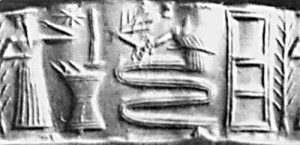 (Enki warned Noah speaking through a reed wall)
(Enki warned Noah speaking through a reed wall)
Speaking through the wall of Ziusudra‘s reed hut:
‘Reed hut, reed hut! Wall of the hut, wall of the hut!
Listen o reed hut! Consider, o wall of the hut!
O man of Shuruppak, o you son of Ubara-Tutu,
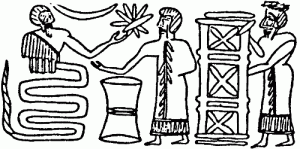 (Noah listens to Enki‘s warning from behind reed wall)
(Noah listens to Enki‘s warning from behind reed wall)
Tear down your hut of reeds,
Build of them a reed boat
Abandon things
Seek life
Give up possessions
Keep your soul alive!
And into the boat take the seed of all living creatures.
The boat you will build
Will have dimensions carefully measured
Its length and its width shall be equal
And roof it as I have my subterranean watery abyss.”
I understood and said to my lord Enki:
“My lord, behold. What have you commanded of me
Shall I honour and carry out
But tell me, what shall I answer
To the city, to the people, to the elders?”
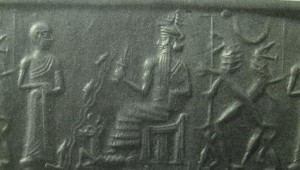 (Enki‘s fashioned “modern man”, & Enki, father to Noah)
(Enki‘s fashioned “modern man”, & Enki, father to Noah)
Enki opened his mouth to speak
Said to me, his servant:
“Thus, O Mortal, shall you speak to them, saying
I have learned that the god Enlil is ill-disposed toward me
No longer can I reside here in the city.
Never again,
No, never.
Can I turn my face to this soil which is Enlil‘s.
I must go down therefore,
Down to dwell with my lord Enki,
Towards the marshes of the south,
And enter his sweet-watered Deep
Into his very Abyss.
But he will shower down upon you
Abundance and plenty.
The choicest of birds,
The rarest of fishes
Oh, what great harvest riches shall this land enjoy!
Yes, He who orders the grain heads in the evening
What a shower of wheat shall He rain down upon you!'”
On the horizon there appeared
The first intimations of dawn.
The land was gathered about me.
(Here two lines are missing. When the text resumes, Ziusudra is still speaking to Gilgamesh)
The child brought bitumen,
The strong brought the rest of what was needed
On the fifth day I laid out the plan
The floor space was one iku (4)
Its sides were ten gar high,
Each edge of its square roof measured ten gar
(The ark was therefore an exact cube measuring 120 cubits on each side. This is hardly the description of a physical sailing ship!)
 (Noah‘s Ark construction tablet)
(Noah‘s Ark construction tablet)
I delineated its exterior shape
And fashioned it together
Cross-pinned it six times
Thus dividing it into seven
And the ground plan I divided into nine parts
I drove water plugs into it
Saw to the punting holes and laid up what was needful
Into the furnace I poured six [or three] shar measures of bitumen
Followed by three shar measures of asphalt.
The basket-bearers carried three shar measures of oil
Besides one shar measures of oil stowed away the boatman
I slaughtered bullocks for the people
Every day I slew sheep
All though it were river water
I gave to the workmen
Red wine, white wine, must, oil
To feast as if it were New Year’s day
I opened the container and laid my hands in unguent
On the seventh day the boat was completed
…….was very difficult
The edges of the floor above and below
Showed 2/3 of the floor [were above, 1/3 below?]
Whatever I had I loaded aboard,
Whatever I had of silver I loaded aboard,
Whatever I had of gold I loaded aboard
Whatever I had of seed of all living creatures
I loaded aboard.
I caused all my family and kinsfolk to go aboard.
The beasts of the field,
The wild creatures of the plain,
All the craftsmen –
All these I made to go aboard.
Shamash the Sun had set for me a specific time, saying:
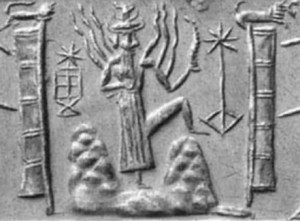 (Utu cut launch & landing sites into mountains)
(Utu cut launch & landing sites into mountains)
‘When He who rains down His misfortune in the twilight
Does rain down His misfortune like a blight,
Then board your boat without further ado
And make sure your door is safely pulled to.’
That precise time had indeed arrived:
‘When He who rains down His misfortune in the twilight
Does rain down His misfortune like a blight’.
(This rhymed utterance provides the true message of Enki‘s disguised message to the people of Shuruppak given earlier)
I scrutinized all the weather signs;
How awesome was the weather to behold!
I boarded the boat without further ado
And made sure that the door was safely pulled to.
I committed the navigation of the great house and its contents
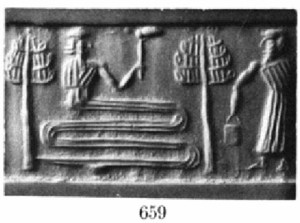 (Ningishzidda provided Noah with help, saving him & family)
(Ningishzidda provided Noah with help, saving him & family)
To the boatman Puzur-Amurri.
When on the horizon
The first intimations of dawn
A black cloud rose from the horizon
Inside it Adad the storm thundered,
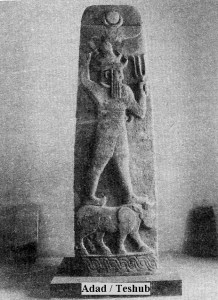 (Adad, Thunder God, with high-tech alien weaponry)
(Adad, Thunder God, with high-tech alien weaponry)
While Shullat and Hanish, the storm-heralds, rose ahead,
Movind as advance messengers over hill and plain.
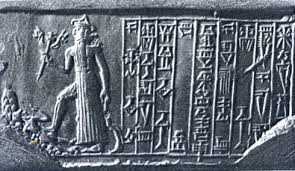 (Nergal, with high-tech alien weaponry)
(Nergal, with high-tech alien weaponry)
Nergal, the God of the Underworld, tore out the posts.
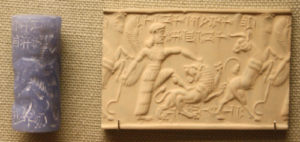 (Ninurta, warrior son to Enlil, & Enlil‘s 1/2 sister Ninhursag)
(Ninurta, warrior son to Enlil, & Enlil‘s 1/2 sister Ninhursag)
Ninurta, the God of War and Irrigation, came forth and burst the dikes.
The Anunnaki – the Great Gods – raised their torches,
Lighting up the land with their brightness.
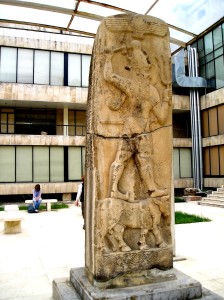 (Adad with alien weaponry atop zodiac symbol Taurus, alien flying disc hovering above)
(Adad with alien weaponry atop zodiac symbol Taurus, alien flying disc hovering above)
Astonishment at Adad the Storm (God) reached to the very heavens.
He turned to blackness all that had been visible.
He broke the land like a pot.
For a whole day the South Storm blew,
Gathering speed as it blew, drowning the mountains,
Overcoming the people as in battle.
Brother saw not brother.
From heaven no mortal could any longer be seen.
Even the gods were struck by terror at the deluge,
And, fleeing, they ascended to the celestial band of An (flight technologies).
The gods cowered like dogs,
Crouching by the outer wall of that celestial band.
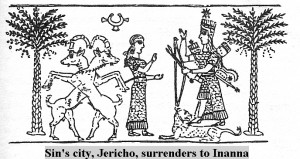 (Goddess of Love & War)
(Goddess of Love & War)
Inanna, Goddess of Love and Battle,
cried out like a suffering mortal –
She, the sweet-voiced,
She, the Lady of the Gods,
How did she lament aloud, crying:
‘Verily, the Old Age has crumbled into dust!
Because I spoke evil in the Assembly of Gods!
Oh, how could I command havoc for the destruction of my people
When I myself gave birth to my people?
Now the spawn of fishes, the sea is glutted with their bodies!’
The Anunnaki – the Great Gods -wept with her,
Their lips were shut tight in distress in the Assembly, one and all.
For six days and seven nights
The flood wind blew as the South Storm swept the land.
At sunrise in the seventh day
The South Storm, bringer of the flood, and
Which had fought like an army, abated its attack.
The sea grew quieter,
The storm subsided,
The flood ceased.
I looked at the weather;
It had gone quiet.
All men had returned to clay.
The land had been leveled like a terrace.
O opened a dove flap
And light fell upon my face.
I bowed, sat down and wept,
Tears flowing down my cheeks.
I peered in every direction but the sea was everywhere,
In each of the 14 regions
There emerged a mountain peak for that point.
The boat came to rest on Mount Nisir (Mt. Arrarat?).
Mount Nisir held the boat fast,
Allowing no shifting position.
One day, a second day, Mount Nisir held the boat fast,
Allowing no shifting position.
A 3rd day, a 4th day and a 6th day, Mount Nisir held the boat fast,
Allowing no shifting position.
When the seventh day dawned,
I brought a dove out and set it free.
The dove went forth but then returned.
The dove found no resting-place and turned back.
I brought out a swallow and set it free.
The swallow went forth but then returned
The swallow found no resting-place and turned back.
I brought out a raven and set it free.
The raven flew forth but saw the waters were sinking,
She ate, circled, croaked, but did not return back.
Then I sent forth all the four winds
And offered a sacrifice
On the peak of the mountain
I poured out a libation.
Twice seven were the cult-vessels I set up,
Heaping upon their pot-stands sweet cane,
Cedar, myrtle,
The gods smelled the savor.
The gods gathered like fliers around the sacrificer.
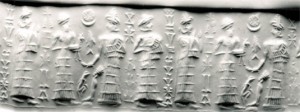
(Ereshkigal Ninsun Nannar Utu)
Now when Inanna, the Lady of the Gods, arrived,
She lifted up the magnificent jewels which An the Great god
Had made according to her desire, and said:
‘O ye gods here present!
Just as surely as I shall not forget
The lapis lazuli around my neck,
So shall I remember these days,
Never forgetting them.
Let the gods come to the offering.
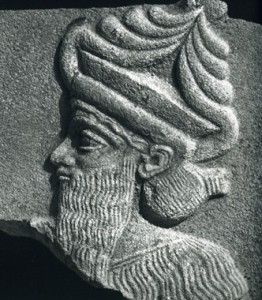 (Enlil, Anunnaki King Anu‘s son & heir, Commander of Earth Colony)
(Enlil, Anunnaki King Anu‘s son & heir, Commander of Earth Colony)
But let not Enlil come to the offering;
For he, unreasoning, brought on the deluge
And delivered my people over to destruction!’
Now when Enlil arrived and saw the boat,
He waxed wroth,
He was filled with fury against the heavenly Igigi gods and said:
‘What! – Has any mortal escaped?
No mortal was to survive the destruction!’
Ninurta, God of War, opened his mouth to speak, said to valiant Enlil:
‘Who besides the god Enki could devise such a plan?
The god Enki alone understands every matter.’
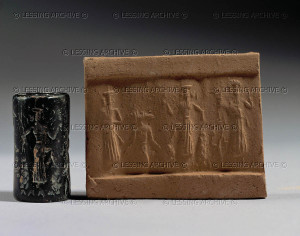
(Ningishzidda Enki Enlil Noah)
Enki opened his mouth to speak, saying to valiant Enlil:
‘O wisest of gods, O great warrior hero,
How could you, taking no counsel,
Bring on the deluge?
He who has sinned, on him lay his sin.
He who has transgressed, on him lay his transgression
But oh be merciful, lest all be destroyed.
Be long suffering, that man may not perish.
Rather than your bringing on the deluge,
Oh, that a lion had come to diminish mankind!
Rather than you bringing on the deluge,
Oh, that a famine had arisen
To lay mankind low.
Rather than you bringing in the deluge
Oh, that Erra (Nergal), god of Pestilence, had come
To strike mankind down.
What is more, it was not I
Not I who revealed the Secret of the Great Gods,
I allowed Ziusudra (Noah), he who abounds in wisdom
To see a dream
It was thus that he perceived
The secret of the Great Gods
Now then take counsel concerning him.’
Then Enlil went up into the ship.
He grasped my hand,
He caused me to go aboard,
He caused my wife to go aboard,
He made her to kneel beside me
He stood there between us,
He touched our foreheads and blessed us;
“Until now, Ziusudra has been a more mortal
But from now shall Ziusudra and his wife
Be like unto us gods.
Ziusudra shall reside far away –
At the confluence of the celestial rivers –
There shall he dwell!”
And so they took me and made me reside far away,
At the confluence of the celestial rivers.
But now, o Gilgamesh, as for you,
Who will assemble the gods for you
That you may find the Life that you seek?
Come, do not lie down, sleep not
For six days and seven nights’.
As he sits on his haunches,
Sleep breathes upon him like a light rain in a mist.
Ziusudra says to her, says to his wife:
‘Behold, the strong one who seeks Life-Everlasting!
Sleep breathes upon him like rain in a mist.’
His wife says to him, to Ziusudra the Faraway:
‘Oh, touch him
Let the man awake,
That he may return in peace
Along the route by which he came.
That he may return to his land
By the portal through which he came.;
Ziusudra says to her, says to his wife:
‘Mankind being wicked, he will seek to deceive you.
Bake some little cakes of bread
And put them by his head.
She put these by his head
And she marked on the wall the days he slept.
His first cake of bread dried out,
His second was gone bad,
His third was moist and soggy,
His fourth turned white,
His fifth had a moldy look,
His 6th was still fresh
His 7th – just as he was touched, he awoke.
Gilgamesh says to Ziusudra, the Faraway:
‘Hardly did sleep steal over me,
when suddenly you touched me and woke me!’
Ziusudra says to him
Says to Gilgamesh:
‘Not so, Gilgamesh! Count your cakes of bread,
They will show you how many days you have slept.
The first cake is dried out,
The second is gone bad,
The third is moist and soggy,
The crust of the fourth has turned white,
The fifth has a moldy look,
The sixth is still fresh.
The seventh, the moment it was baked – at this instant you did awaken.’
Gilgamesh says to him
Says to Ziusudra the Faraway:
‘Ah, but what shall I do, Ziusudra?
Where shall I go?
Now that the Snatcher has laid hold of my entrails?
Death lurks in my bedchamber, death follows my footsteps already!’
Ziusudra says to him,
Says to Urshanabi the Boatman
‘Urshanabi, may the landing-place not welcome you.
May the place of crossing reject you!
He who approaches its surrounding rim
Deny him its rim!’
The man before whose face you have walked
Whose body is covered in long hair
The grace of whose form skins have distorted
Let him wash his long hair clean as snow in water –
Let him throw off his skins,
Let the sea carry them away,
So that the fairness of his body may be seen
Let him place a new band around his head
Let him cover his nakedness with a fresh garment
Until he will accomplish his journey
Let not his garment have a mouldy look –
Let it be quite new.’
Urshanabi took him and brought him to the place of cleansing
He washed his long hair
He threw off his skins
That the see might carry them away,
That the fairness of his body might be seen
He placed a new band around his head
He covered his nakedness with a fresh garment,
Until he should arrive in his city,
Until he should accomplish his journey.
The garment did not have a mouldy look
But was quite new.
Gilgamesh and Urshanabi boarded the ship.
They launched the ship on the waves and they glided forth,
His wife says to him
Says to Ziusudra the Faraway:
‘Gilgamesh has come hither,
He has wearied himself,
He has exerted himself.
What gift will you make to him
That he may return to his land?’
That he, Gilgamesh, raised up his pole,
And brought the ship hear to the shore.
Ziusudra says to him
Says to Gilgamesh:
‘Gilgamesh, you have come hither,
You have wearied yourself,
You have wearied yourself.
What gift shall I make to you
That you may return to your land?
Gilgamesh, I will disclose unto you
A hidden thing.
Yes, a secret of the gods will I tell unto you:
There is a plant,
 (Noah & spouse give “plant of life” to Gilgamesh)
(Noah & spouse give “plant of life” to Gilgamesh)
Its thorn is like the buckthorn,
Its thorns will prick your hands
As does the rose
If that plant shall come to your hands
You will find new life’.
No sooner had Gilgamesh heard this
Than he opened the water-pipe
He tied heavy stones on his feet in the manner of the pearl divers
They pulled him down into the deep
There he saw the plant.
He took the plant, though it pricked his hands.
He cut the heavy stones from his feet
The sea cast him up upon its shore
Gilgamesh says to him
Says to Urshanabi the Boatman:
‘Urshanabi, this is the plant that is different from all others.
By its means a man can lay hold of the breath of life.
I shall take it to Uruk of the ramparts.
I shall cause….
To eat the plant….
It shall be called Man Becomes Young in Old Age.
I myself shall eat it, that I may return to the state of my youth.’
There I myself shall eat the plant that I may return to the state of my youth.’
After 20 intervals they broke off a morsel.
After 30 more rested for the night.
Gilgamesh saw a well whose water was cool
He descended into it to bathe in the water
A serpent smelled the fragrance of the plant
It darted up from the well and seized the plant:
Sloughing its skin in rejuvenation as it returned.
Then Gilgamesh sat down and wept.
His tears flowed down his cheeks.
He took the hand of Urshanabi, the Boatman:
‘For whom have my hands laboured, Urshanabi?
For whom has my heart’s blood been spent?
I have not obtained any advantage for myself.
I have only obtained an advantage for the earth-lion (29)’.
And now the tide will bear it twenty-double hours away!
When I opened the water-pipe
And… the gear
I noted the sign which was set for me
As a warning: I shall withdraw,
And leave the ship on the shore.’
After twenty intervals
They broke a morsel
And thirty more
Rested for the night
When they arrived in Uruk of the ramparts
Gilgamesh says to him
Says to Urshanabi the Boatman:
‘Go up, Urshanabi, walk on the ramparts of Uruk
See the foundation terrace
Touch, then, the masonry –
Is not this of burnt brick
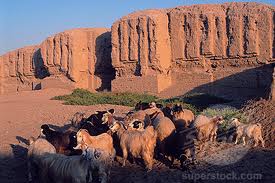 (walls to city of gods in ancient Sumer)
(walls to city of gods in ancient Sumer)
And good? I say
The seven sages laid its foundation
One third is city. One third is orchards. One third is margin land.
There is the precinct of the temple of Inanna/Ishtar
These three parts
And the precinct
Comprise Uruk
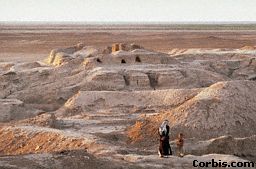 (E-anna of Uruk barely above ground, buried by thousands of years)
(E-anna of Uruk barely above ground, buried by thousands of years)
(Written down according to its original and collated Palace of Ashurbanipal, King of the World, King of Assyria).”
NOTES TO TABLET XI
1. The biblical Great Flood is a tradition which is known to be derived directly from the Sumerian-
2. Babylonian one.
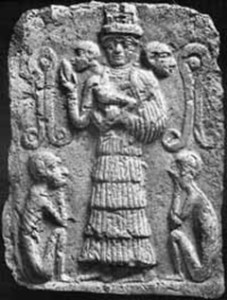 (Ninhursag / Nintur with her early attempts to fashion workers for the gods)
(Ninhursag / Nintur with her early attempts to fashion workers for the gods)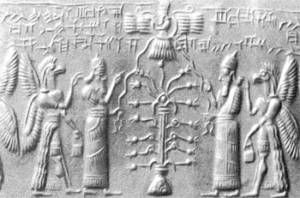
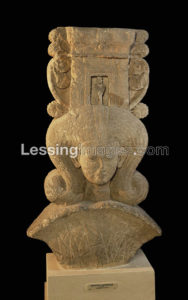
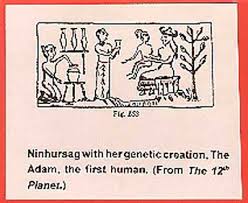 (Apkulla / pilot, Enki, Anu above in sky-disc, Enlil, Apkulla / pilot, & “Tree of Life” DNA manipulations to fashion replacement workers; Ninhursag, Chief Medical Scientist on Earth Colony, taking 50,000 years to complete the fashioning of “Modern Man”)
(Apkulla / pilot, Enki, Anu above in sky-disc, Enlil, Apkulla / pilot, & “Tree of Life” DNA manipulations to fashion replacement workers; Ninhursag, Chief Medical Scientist on Earth Colony, taking 50,000 years to complete the fashioning of “Modern Man”)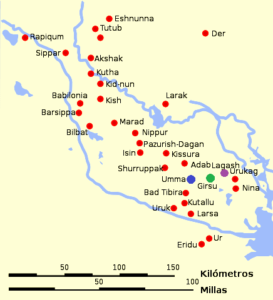 (Biblical “Eden”, the land of the gods “between the rivers” Euphrates & Tigris)
(Biblical “Eden”, the land of the gods “between the rivers” Euphrates & Tigris)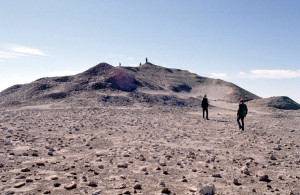
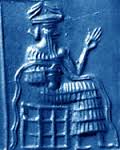 (Enki‘s patron city Eridu in ruins; Enki)
(Enki‘s patron city Eridu in ruins; Enki)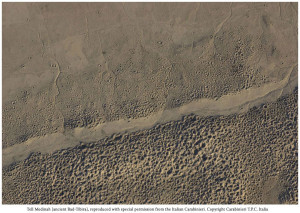
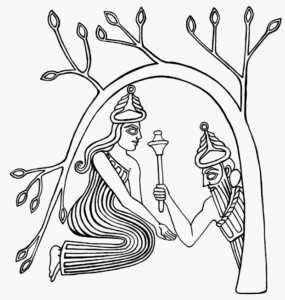 (Bad-tibira ruins; Dumuzi & Inanna)
(Bad-tibira ruins; Dumuzi & Inanna)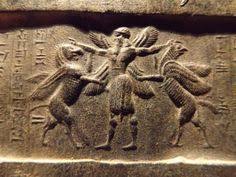 (Ninurta, Enlil‘s warrior son, & heir to throne of planet Nibiru after Anu & Enlil)
(Ninurta, Enlil‘s warrior son, & heir to throne of planet Nibiru after Anu & Enlil)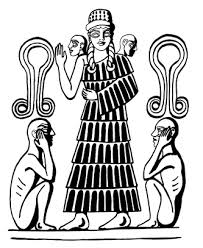
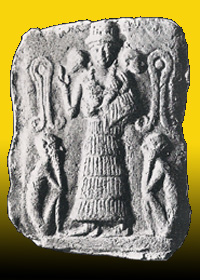 (Ninhursag‘s early failures to produce a worker-race)
(Ninhursag‘s early failures to produce a worker-race)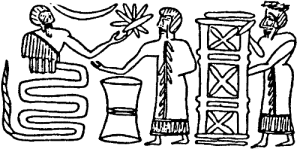
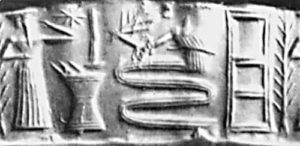 (Noah overhears Enki‘s warnings of a coming flood)
(Noah overhears Enki‘s warnings of a coming flood) (Noah overhears Enki‘s warnings of a coming flood through a reed wall)
(Noah overhears Enki‘s warnings of a coming flood through a reed wall)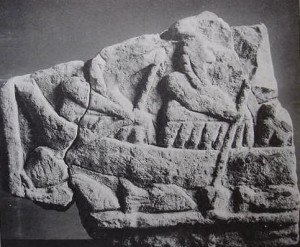 (Noah & family survive in the Ark)
(Noah & family survive in the Ark)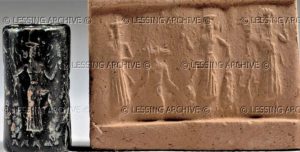 (Enlil smells Noah‘s Bar-B-Que, & discovers Noah alive by help of Enki)
(Enlil smells Noah‘s Bar-B-Que, & discovers Noah alive by help of Enki) 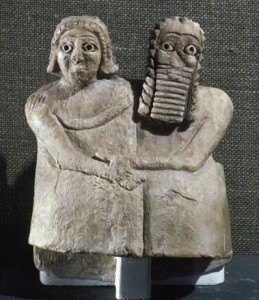 (Noah‘s spouse & Noah made immortal by Enlil‘s decree)
(Noah‘s spouse & Noah made immortal by Enlil‘s decree)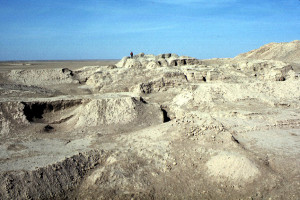
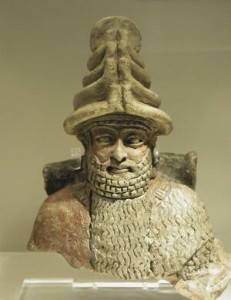
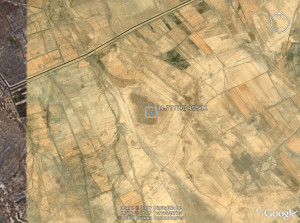
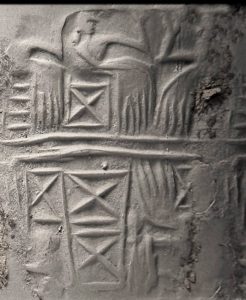
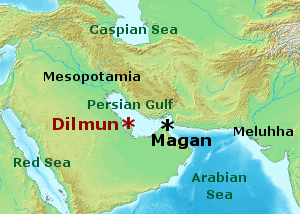
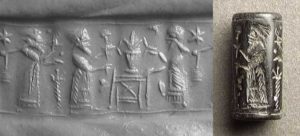
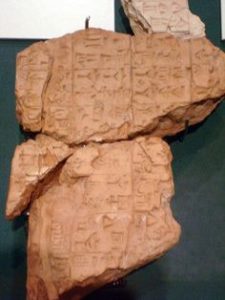
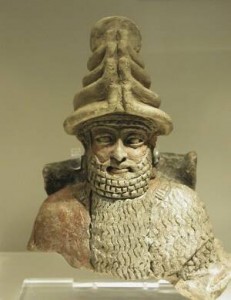
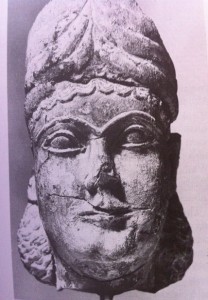
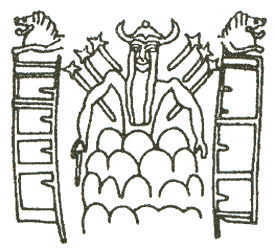
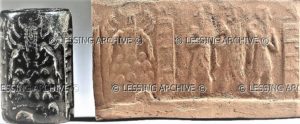
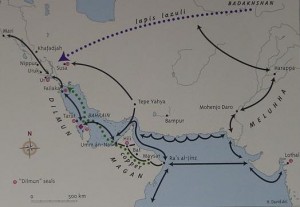
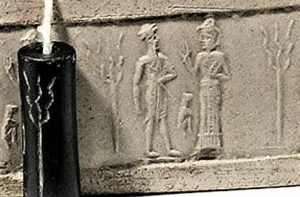
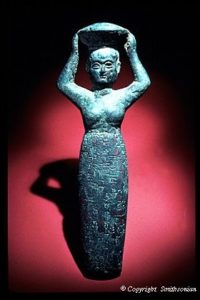
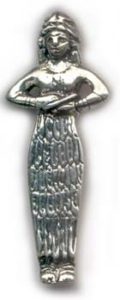
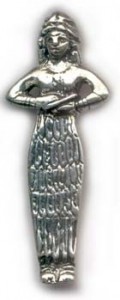
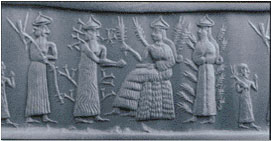
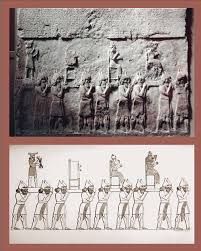
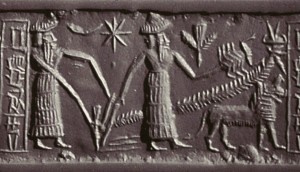
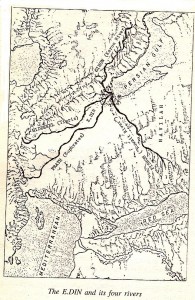
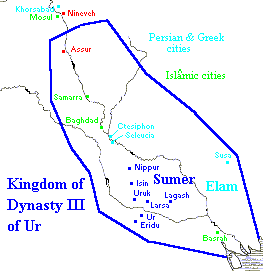
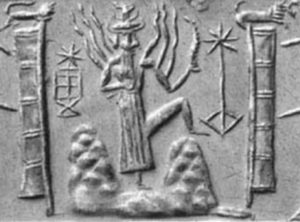
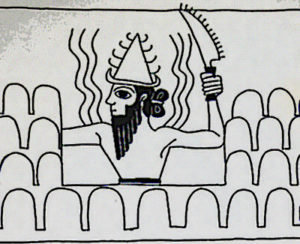
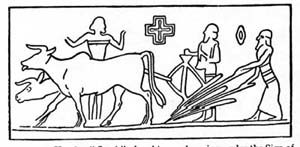
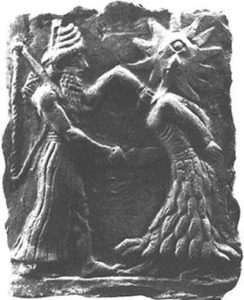

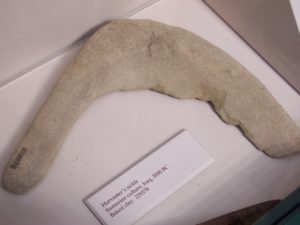
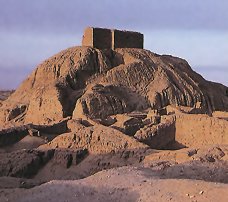
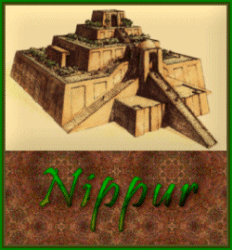

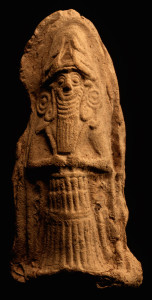
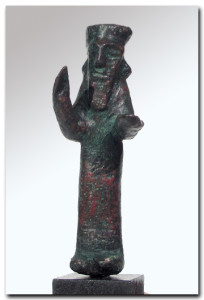
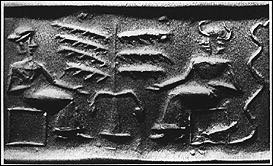
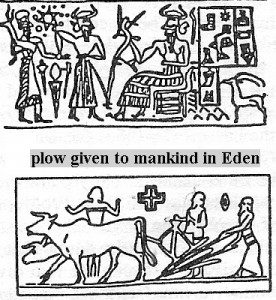
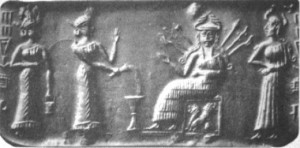
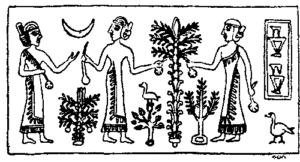
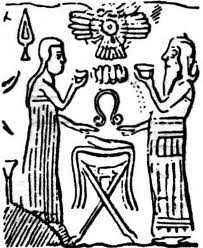
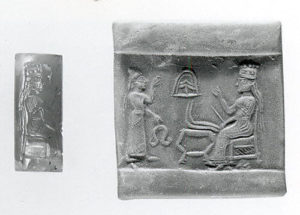
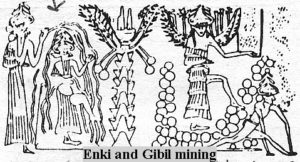
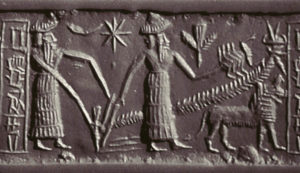
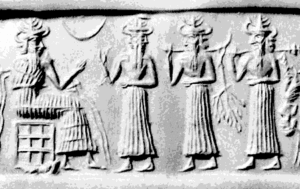
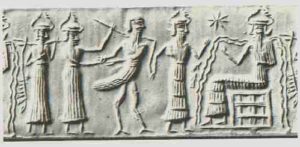
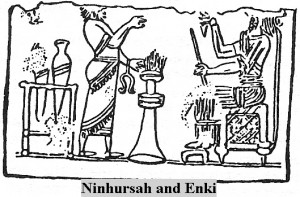
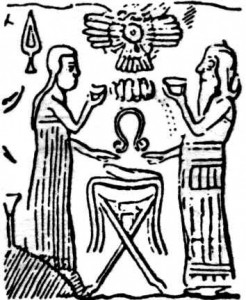
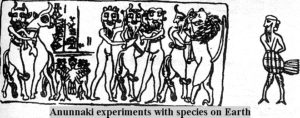
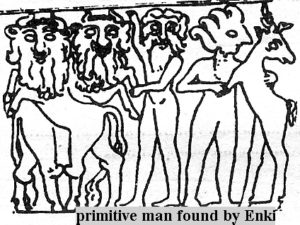
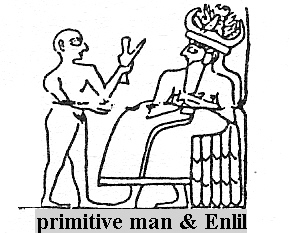
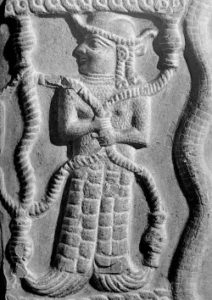
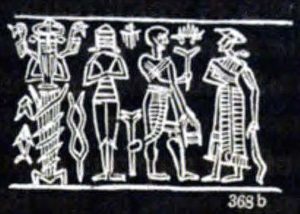
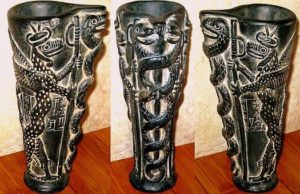

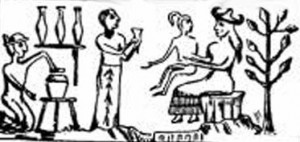
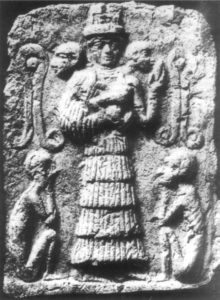
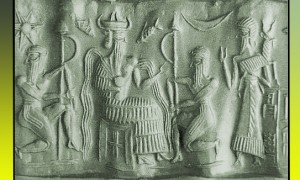
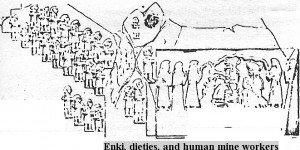
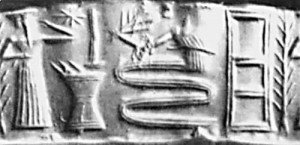
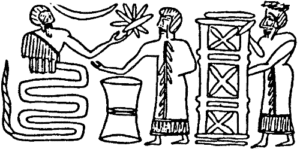
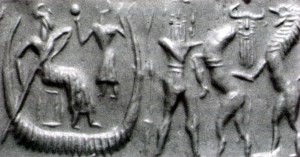
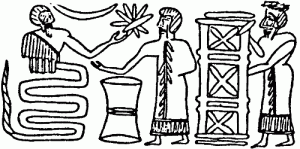
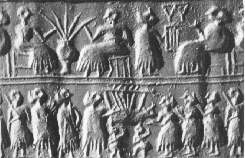
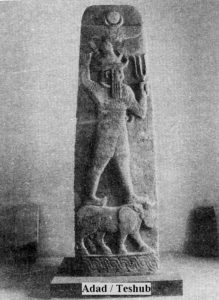
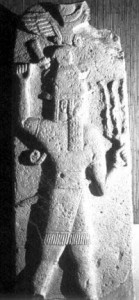
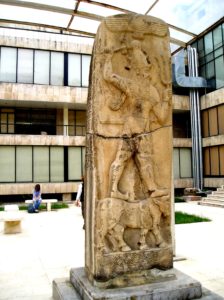
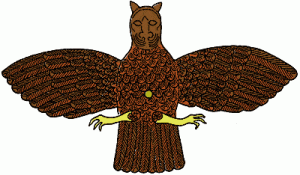
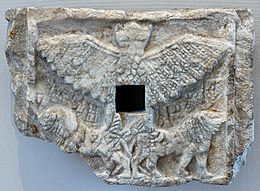
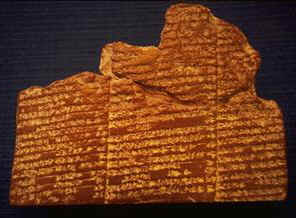
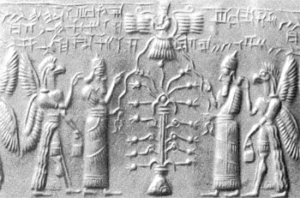
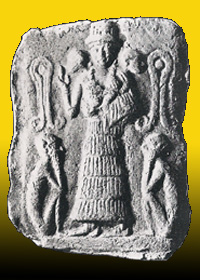
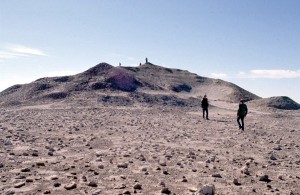
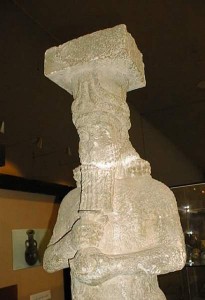
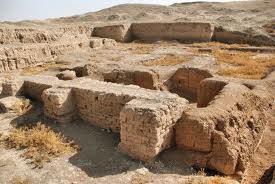
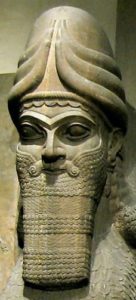
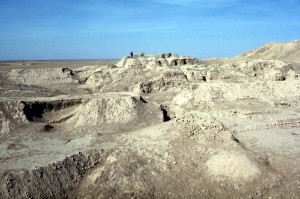
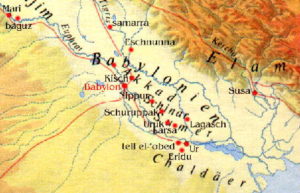
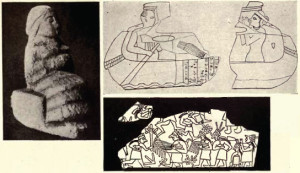
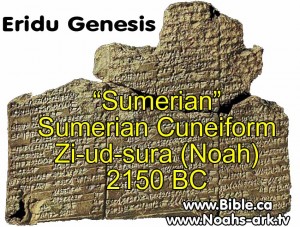
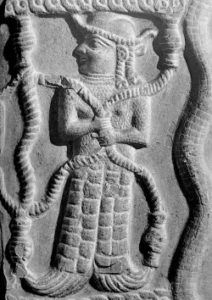
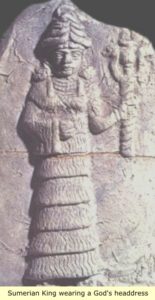
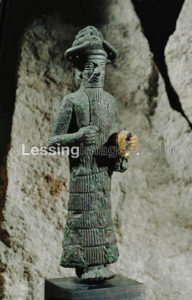
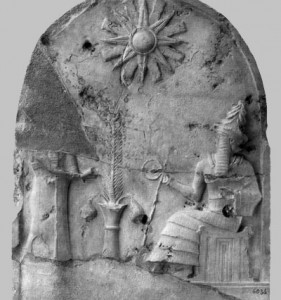
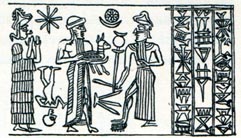
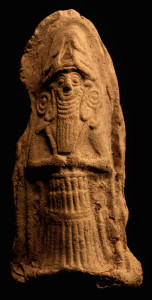
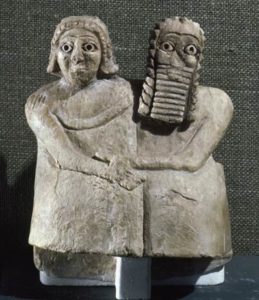
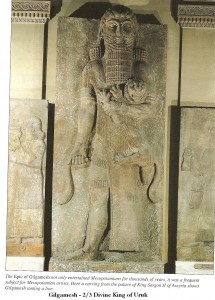
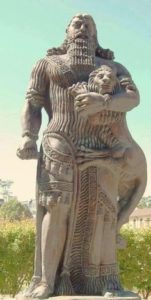
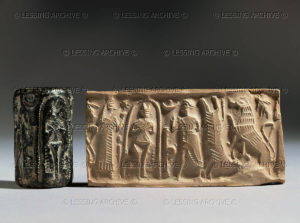
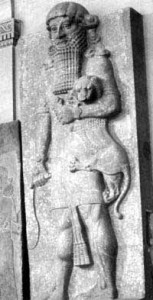
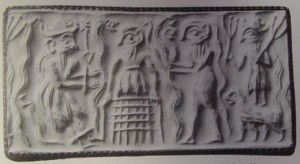
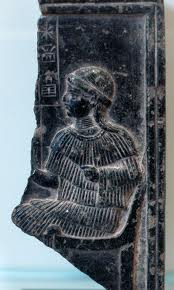
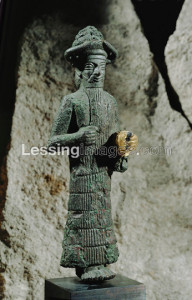
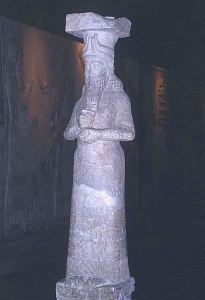
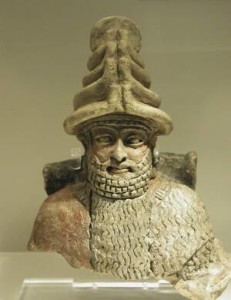
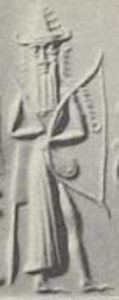
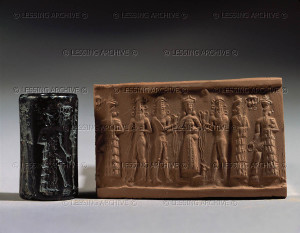

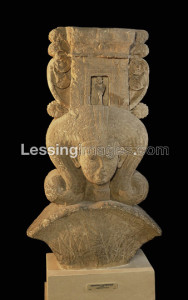
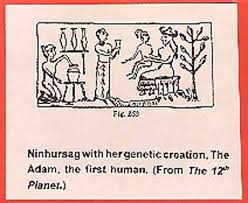
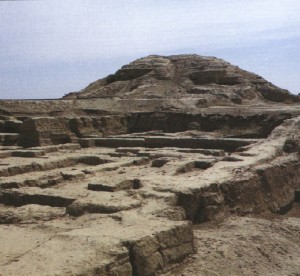
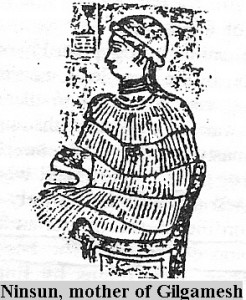
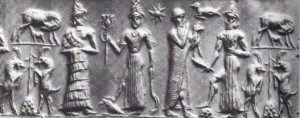
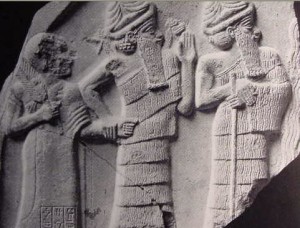
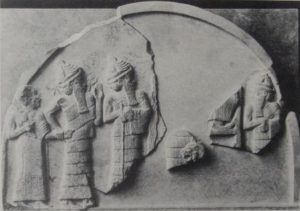
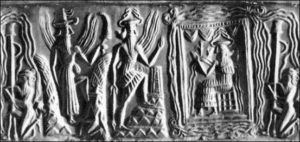
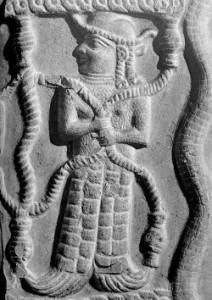
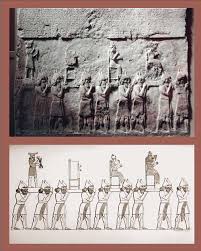


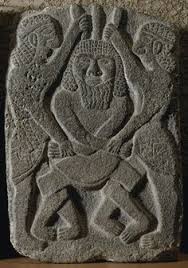
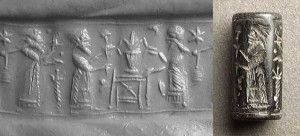
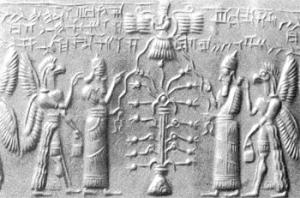

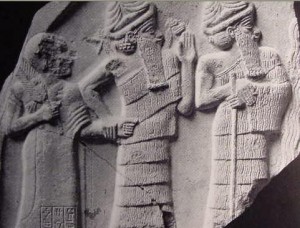
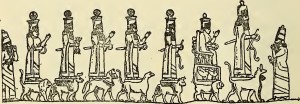
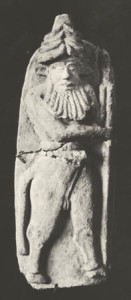
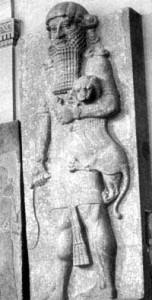
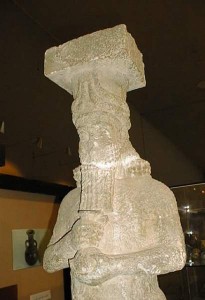


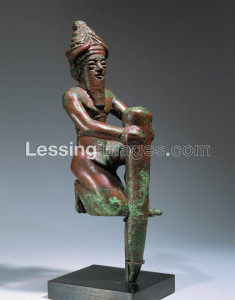
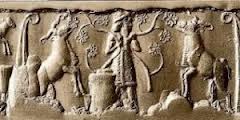

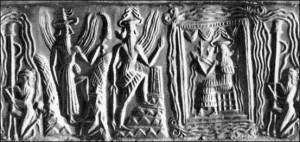
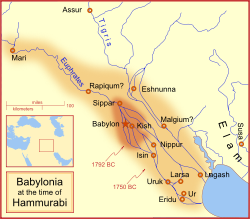
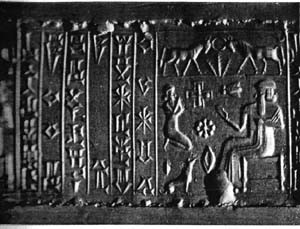
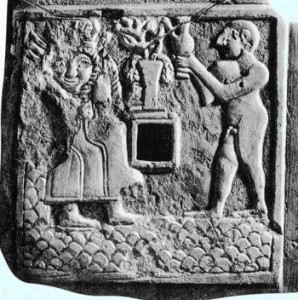
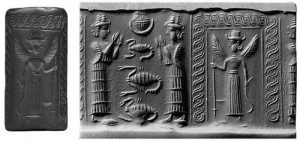





















































![[Louvre]](https://www.mesopotamiangods.com/wp-content/uploads/2014/07/8i-Death-of-Humbaba-1-300x243.jpg)











































































